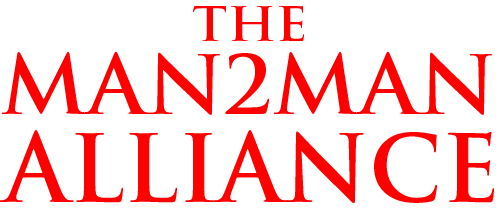




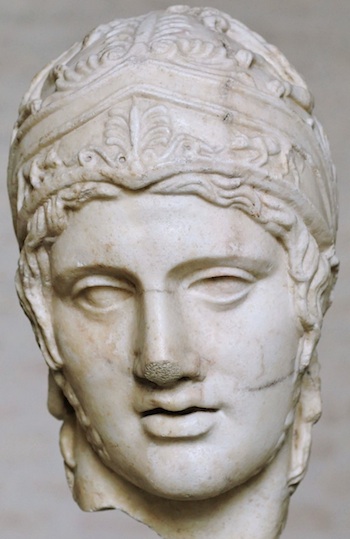

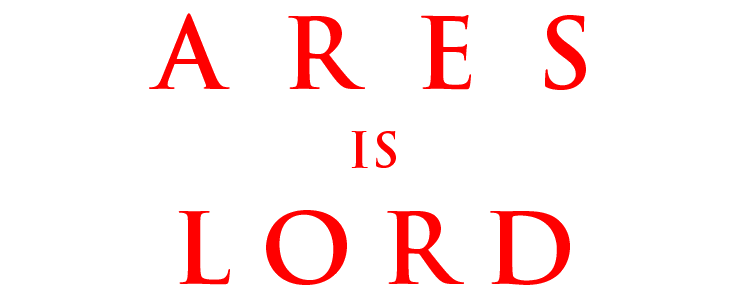
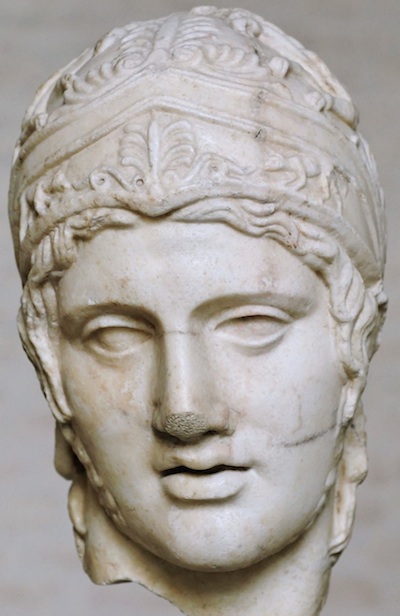









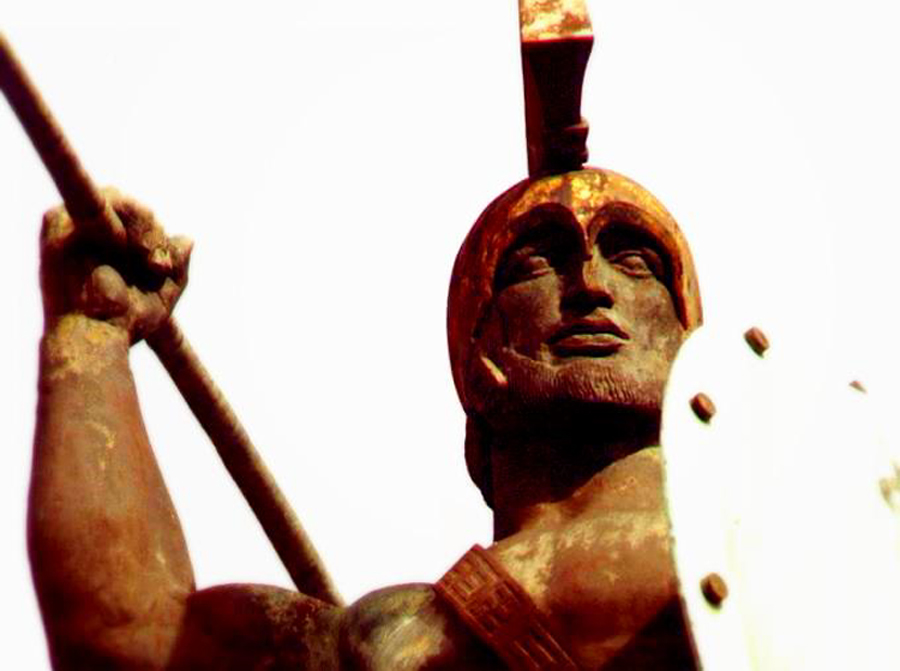


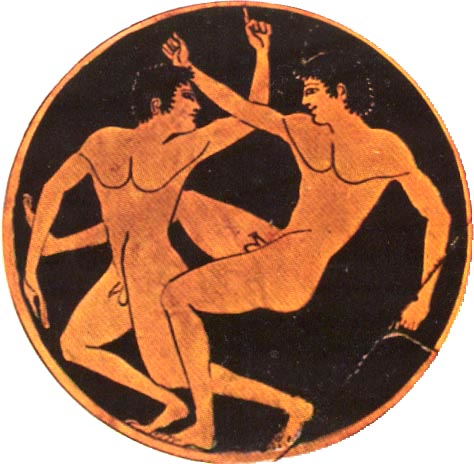
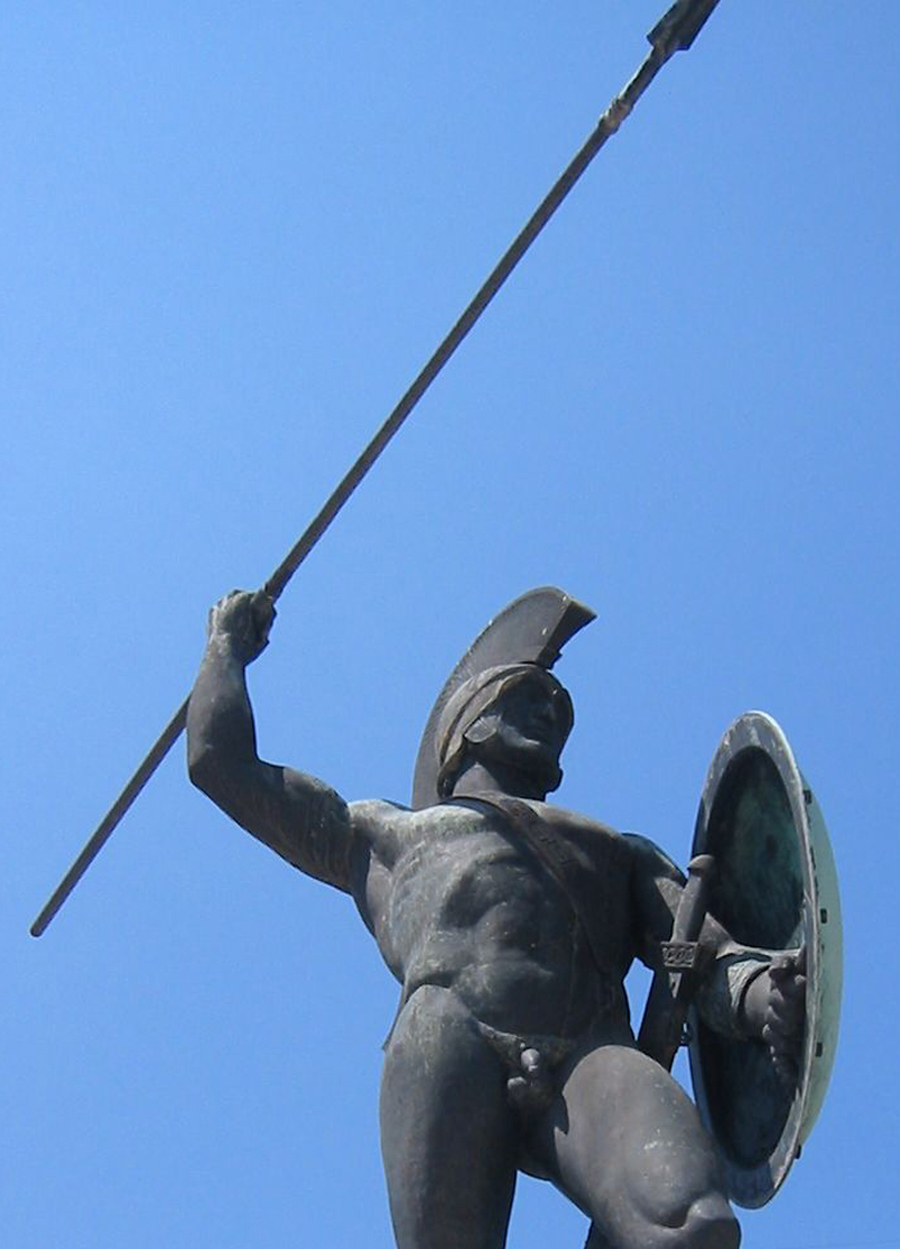
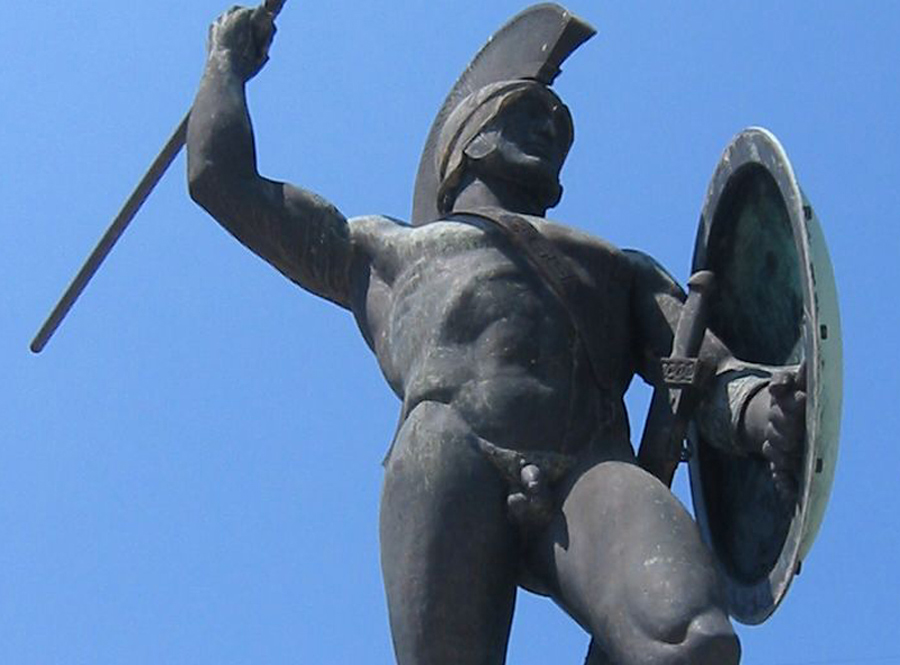
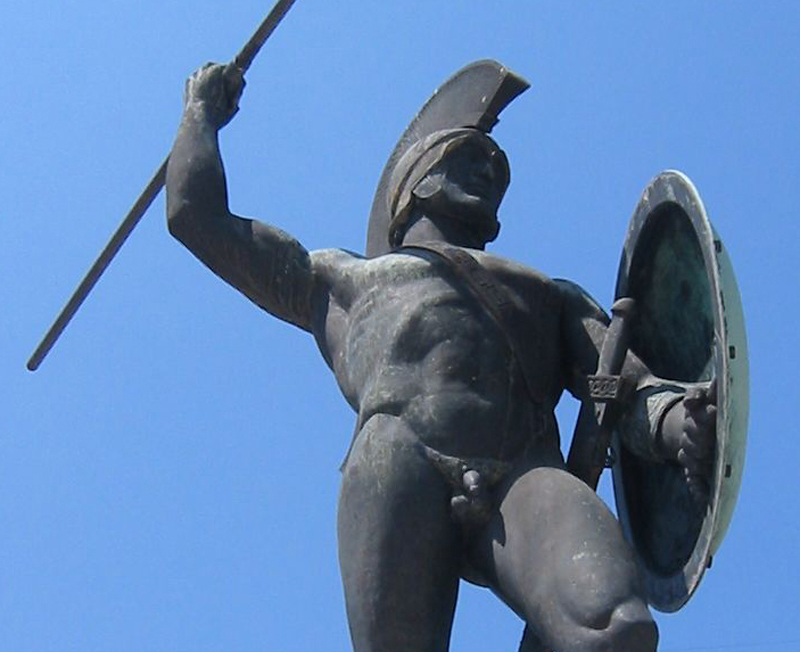


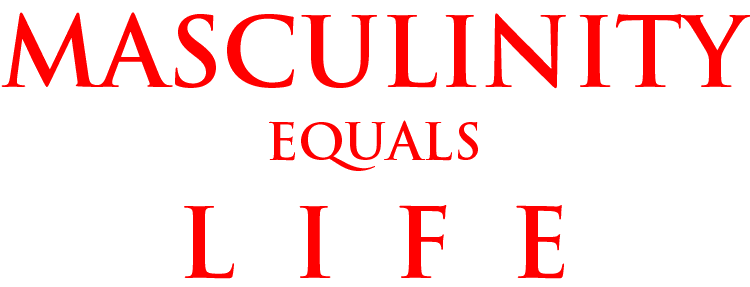







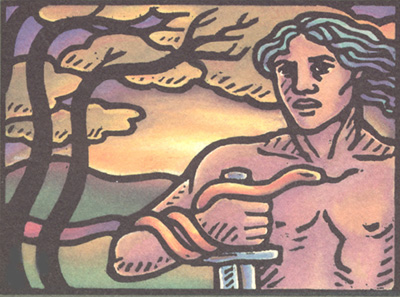


MANHOOD: A Reductional, Functional, Teleological, Incantational, and, above all, Sanctional --
Lexicon
Hi guy.
Welcome to Biblion Proton -- Book I -- of Manhood: A Lexicon.
My name is Bill Weintraub, and I'm the creator of The Man2Man Alliance and Ares is Lord websites, and the author of Manhood: A Lexicon.
Manhood: A Lexicon is, basically, a book -- masquerading as a webpage.
And, like any book, it's best read from the beginning.
So -- I strongly encourage you to read, if you haven't already, the Prefatory Note and Prolegomena to Manhood: A Lexicon, which precede Biblion Proton.
Reading that Prefatory Note and the Prolegomena will greatly aid your understanding of the material you encounter in Biblion Proton and the succeeding books of Manhood: A Lexicon.
July 4, 2013
BIBLION PROTON
By Bill Weintraub
Ιn Death of an AIDS Activist, we looked at this couplet from Book VIII of Plato's brilliant Republic:
And, I said,
That's from the Jowett translation, and Jowett actually says,
But, the word used for Virtue is, of course, areté, and as we've seen, and as I will continue to make clear and ever clearer, the term Virtue in archaic and classical Greece more often than not reduces to -- means:
As is explained in Liddell and Scott's Ancient Greek Lexicon Manhood.
"the first notion of goodness being that of manhood"
And, Liddell and Scott re-inforce that point by saying that areté is
Manhood.
"goodness, excellence, of any kind, esp. of manly qualities, manhood, valour, prowess"
Manhood:
The first notion of Goodness.
The first notion of Goodness is that of Manhood.
Manhood.
Areté is goodness and excellence, especially of manly qualities, bravery in war, that is valour and prowess -- which are, as we just learned in the Prolegomena, the two prime components of Manhood --
True Manhood, which is Fighting Manhood.
Valour is Willingness.
Prowess is Ability.
True Manhood is the Willingness and Ability to Fight.
Manhood.
Fighting Manhood.
And that Fighting Manhood is Excellence, Virtue, and Goodness.
Manhood is Excellence.
Manhood is Virtue.
Manhood is Goodness.
Fighting Manhood -- is Goodness.
Liddell and Scott, whose Ancient Greek Lexicon has been considered authoritative for well over a century -- say so.
They say that Fighting Manhood is the first notion of Goodness.
And -- and I'm repeating this purposefully -- Liddell and Scott re-inforce that point by saying that areté is
And, you'll notice, if you click on this link which takes you to Liddell and Scott's definition of areté, that they make the point even plainer by putting the word areté followed by the word Ares at the very beginning of the definition, thus:
αρετη Αρης
And while I know most of you don't read Greek, it's easy to puzzle out.
The Greek letter A looks like our letter A in both upper and lower case.
The Greek letter R -- which is Rho -- looks like our letter P in both upper and lower case.
T -- looks like -- T.
While there are two Greek letters which have an "e" sound:
One is epsilon, which looks our letter E, and the other is eta, which in lower case looks like our lower case letter n.
And that's it.
αρετη = areté;
Αρης = Ares.
And there's an extremely strong relationship between the two, which Liddell and Scott make plain by putting the two words side by side:
αρετη Αρης
Are these the only two words which Liddell and Scott display in this way?
No.
They do it whenever they want to point out a strong relationship between words.
For example,
Mache -- [a] battle, fight, combat ; is paired with Machomai -- to fight, to fight with, ie, against ;
μαχη μαχομαι
and
Polemikos -- warlike, martial, skilled in war ; is paired with Polemos -- [a] battle, fight, war.
πολεμικος πολεμος
And clearly, in the latter case, the word Polemikos -- warlike -- derives from Polemos -- battle, fight, war.
Just as:
Areté -- Manhood, virtue, excellence, goodness -- derives from, is rooted in, Ares -- the Warrior God, the God of Battle, the God of Fight, the God of Manhood, the God of Fighting Manhood.
αρετη Αρης
Αρης is the root and the source -- of αρετη.
Which makes sense.
It makes sense that Ares, the God, the vast spiritual force, who both creates and empowers Fight and Manhood -- would be the root and the source of the human quality we call Fighting Manhood -- of areté -- of Manly Excellence, Valour, Prowess, Goodness, and Virtue.
So:
Areté -- Manhood -- which is valour, prowess, goodness, excellence, and virtue -- flows from Ares -- the God of War -- or, to be more precise, the God of Fight.
And if you click on the Latin -- that is, Roman -- word virtus, a word most often translated as Virtue -- this is what you see:
So:
The title of this article --
MANHOOD: A Reductional, Functional, Teleological, Incantational, and, above all, Sanctional
Lexicon --
may appear, at first glance, whimsical.
But you'll see that it's not.
That in the ancient Greek world, many very important words -- expressing what were literally the noblest ideas, concepts, beliefs, and ideals of the ancients, reduce to one word and one essence -- Manhood.
Fighting Manhood.
And that, consequently, we can say without question that the role of Manhood, functionally, teleologically, incantationally, and, above all, sanctionally, in giving form and substance to the Manly Warrior Kosmos of those ancient Men was -- as it still should be -- without equal.
So -- if we take any ancient Greek word in this Lexicon of Manhood, and reduce that word, if we strip away -- reduce to nothing -- all the non-ancient, extraneous, accretions of Christianized and heterosexualized fat that adhere to terms and concepts like nobility, honor, and moral beauty -- what's left is the lean and mean Manly Essence -- Manhood.
Moreover, when we rid ourselves of those pacific and effeminized accretions -- what we see is rough and tough -- Manhood.
Manhood:
Lean and Mean;
Ruff and Tuff.
For example: Consider the term "strife of valour," which we've much discussed, and which actually reads, in Xenophon's original, a strife or struggle -- about or for -- areté.
Once again, the translator, Marchant, writing ca 1925, says a strife of valour -- of areté -- and that's fine as far as it goes.
But what is areté?
"goodness, excellence, of any kind, esp. of manly qualities, manhood, valour, prowess"
Valour is the Man's Willingness to Fight;
Prowess is the Man's Ability to Fight.
And we can, therefore, think, per Liddell, of Valour and Prowess -- Willingness and Ability to Fight -- as the two constituent parts of Manhood.
Which means that areté is Fighting Spirit -- which is identical to Manly Spirit -- which is Manhood.
Fighting Manhood.
Fighting Manhood -- Virtuous Manhood, Goodly Manhood, Moral Manhood.
Now:
As I said in Death of an AIDS Activist, our contemporary conception of "masculinity" is sexual and hedonist -- but that of the ancients was NOT --
it was AGGRESSIVE and VIRTUOUS -- Manhood was the Man's Willingness and Ability to Fight -- Nobly and Heroically, for a Morally Just Cause.
Once that's understood, Xenophon's "erin [Strife] peri aretes [Manhood]" becomes a Struggle of, about, and for Manhood -- which is what it was:
περι -- see letter A, Roman numeral II: "of an object for or about which one struggles"
Again: Marchant's Strife of Valour becomes Xenophon's Struggle for and about -- Manhood.
And -- please try to understand -- it's not that Marchant is wrong;
It's that he was writing in 1925 -- when Valour and Manhood were far more closely identified -- far more closely -- than they are now.
Put differently:
Manhood in 1925 was still understood to be Fighting Manhood.
So -- and again:
Our heterosexualized culture defines gender -- masculine or feminine -- on the basis of sexual desire.
NO OTHER CULTURE has EVER defined gender in that way.
The Greeks have a word -- ho arren -- the Male, Maleness, or being Male -- which is virtually synonymous with andreia -- Manliness, Manhood, Manly Spirit ;
and that in turn is defined as the Male's Willingness and Ability to Fight.
So:
Reductional means that we reduce the word, we strip the word, to its ESSENTIAL meaning -- which, as you'll see, is always -- MANHOOD.
BIBLION PROTON
By Bill Weintraub
Οur Lexicon of Reductional, Functional, Sanctional, and Incantational Manhood contains both ancient Greek and contemporary English words.
We'll start with the ancient Greek words themselves, presented with links to their definitions in Liddell and Scott's Ancient Greek Lexicon.
And please note that if the definition you see in the link differs, slightly, from that on our page, it's because I'm using the definition given by Liddell and Scott in a 1909 print edition which I use.
But most of the time the print edition of 1909 and the online edition, some of which is dated 1889, and some of which comes from a revision published in 1940 -- agree.
Here's our Lexicon of Manhood, starting with "The Alphas of Male" -- the Alphas of Manhood, Manliness, and Manly Spirit.
Agapenor : loving manliness, manly
Agapenor is a foundational word among the Greeks, it goes all the way back to the Iliad, which is often described as the ancient Greek Bible, and it refers to Heroes and Warriors who both love Manliness -- and are themselves Manly.
MANLY MEN LOVING MANLINESS.
MANLY MEN LOVING MANHOOD.
So -- Many Christians are familiar with the Greek word -- agape (αγαπη)-- meaning "spiritual love."
But, that word, agape, in Greek, has many forms.
Such as
agapetikos (αγαπητικος)
meaning "disposed to love, affectionate";
And
agapetos (αγαπητος)
meaning "dearly beloved, worthy of love";
and Agapenor (αγαπηνωρ)
meaning "loving manliness, manly."
If you're a Christian, you should be aware that agapenor -- "loving manliness, manly" -- is just as much part of your heritage and your birthright -- as agape.
And regardless of your religious faith, you should realize the implications of agapenor -- "loving manliness, manly" -- which applies to Warriors and Heroes -- and which are profound.
ανδρειος
And guys, andreios can become a noun, "to [the] andreion," which then means Manhood, Manliness, Virility
andrikos hydros (ανδρικος ιδρως) = the sweat of manly toil
Areté, one of the most important words in the Greek language, corresponds to the Latin Virtus, which is defined as Manhood, manliness, strength, vigor, bravery, courage, excellence; Valour, gallantry, fortitude; and as Goodness, moral perfection, high character, virtue; Worth, merit, value.
This definition of the Latin word Virtus-- and guys, I cannot emphasize this strongly enough -- applies equally to the Greek word Areté:
In sum, Manhood, Valour, Goodness, Virtue, Worth -- Excellence.
Manhood is Valour, Manhood is Goodness, Manhood is Virtue, Manhood is Worth -- Manhood is Excellence.
Agathos means "good," and I'm putting it here, out of alphabetical order, because it's the adjectival form of the noun Areté --
and cannot be understood without reference to Areté.
So:
To the ancient Greek mind, when someone or something is described as "good," the description carries all these other meanings --
with it.
So -- a Man who's Good -- is, because of his possession of his Manhood -- Manly, he's strong, vigorous, brave, courageous, and excellent; he's valorous and gallant; he displays goodness and moral perfection, and has worth, value, and merit.
And !!! --
There are the comparative and superlative forms of the word "good" -- in English, "better" and "best."
So, and just in case you've forgotten your grade school grammar --
Normally, in Greek as in English, there's the adjective -- eg, strong; and to get the comparative and superlative, a suffix is added -- strong-er, strong-est:
Strong, stronger, strongest.
Brave, braver, bravest.
But with the word Good, and in English -- the word changes in the comparative and superlative -- to better and best.
So -- it's not good, good-er, good-est -- it's Good, Better, Best.
And the same is true in ancient Greek.
There's Agathos = Good.
But the comparative and superlative are different.
Now: I've frequently cited Liddell and Scott, thus:
That's from my print copy of Liddell and Scott, which was originally published in 1909.
But, you'll notice, I have an ellipsis in there.
Here's how it reads without the ellipsis:
So -- Ares is not only the root for areté -- excellence, goodness, virtue, Manhood;
Ares, the Warrior God, the God of Manhood, the God of Fight, and the God of Fighting Manhood -- is also the "root" -- the source -- for all that is areion, better; and aristos -- best:
To be better, stouter, stronger, braver, more excellent, and mightier -- is to be more manly.
Which means that in Greek, the Men who's Best is the Man who has the most Manhood and is therefore the most Manly, the strongest, most vigorous, bravest, most courageous, and most excellent; he's the most valorous and gallant; and he possesses the most goodness, moral perfection, worth, value, and merit.
~Arrian, The Campaigns of Alexander, translated by Aubrey de Selincourt
And then there's the prefix "ari-" cited by Liddell:
So -- The prefix ari- confers the sense of best, strongest, bravest, and most excellent, as in these words:
ο αριστευς
And if you look at Roman numeral 3, you'll see aristeueske machesthai (αριστευεσκε μαχεσθαι) = he was best at fighting
αριστοκρατια
αριστομαχος
And guys, in the online link, Liddell and Scott define aristeia as excellence, prowess; but in print they say "the feats of the hero that win the mead of valour ; any great, heroic action"
And they give the example, from the Iliad, of "Diomedes' Aristeia" --
which we could translate as Diomedes' Heroic Deeds
-- but an equally valid definition really and truly is heroism, including moral heroism.
Classicist Werner Jaeger, for example, speaks of
So -- in this vase painting, Achilles is demonstrating aristeia -- moral heroism ; and "taking possession of the beautiful":
And, guys, we'll be getting to the term "the beautiful" -- to kalon -- in a bit.
For now, let's stick with the adjective agathos, meaning "good," because not only is there an And!!! in the form of areion (better) and aristos (best) and all the other ari- words --
But there's also a --
Plus !!! --
Because the adjective agathos becomes a noun in its own right -- agathon; and -- and this is important, guys -- as to agathon -- "the good" -- or just tagathon, when used by Plato it becomes the Good -- in Latin, the Summum Bonum, the Supreme Good:
And you can find those words if you look at the definition of αγαθος and look for Roman numeral II, then Arabic numeral 2.
And, here, as just a little extra-added plus, a bonus, we might say, is the Latin word for good:
And if you click on that link and use your browser's "find" function to look for summum, you'll see the chief good, end of being, by which is meant -- the Purpose of Life.
So a bonus is kinda like a boner -- isn't it?
Because it contains within it -- the Purpose and Source of Life.
But that's getting us into something known as "Plato's Idea of Good," and you needn't worry about that -- for now.
Just understand that the Greek word for "good" -- agathos -- and indeed, the Supreme Good, the very Purpose of Being itself -- refers back and ultimately reduces to -- MANHOOD.
That's what it does.
And, guys, I'm just getting started.
Lots more to come:
αρρατος
Notice that arren is the equivalent of the Latin word mas, meaning masculine, manly, brave.
And that arren-the-adjective can, with the addition of "to" -- the -- become "to arren," the noun -- meaning Manhood, Manliness, Virility, Strength.
And that's just Warrior Culture and Warrior Kosmos 101 -- the Masculine Man is Manly, the Manly Man is Brave, the Brave Man exhibits and demonstrates that Manly Bravery -- that Brave Beauty -- in Fighting.
Fighting Manhood.
So guys, we started with the words agape -- love -- and andros -- Man.
And we saw that agape combined with an archaic form of the word Man becomes agapenor -- Loving Manliness, Manly.
And that from andros itself comes andreia -- Manhood, Manliness, Manly Spirit ; while andros combined with the adjectival form of areté -- that is, agathos -- becomes andragathia -- Manly Goodness, Manly Excellence.
Notice how positive, and indeed not just positive, but exuberant, all these words are.
And we saw too that there are a host of other words associated with and derived from andros, including andrei-oma -- Manly Effort; andreiuo -- to fill with Courage, with Manhood; andrikos -- Masculine and Manly, like a Man; andrizo -- make a Man of, make Manly; androdes -- like a Man, Manly; and andron -- Men's Mess, Dining Hall, Quarters.
And here too we can see how positive and indeed exuberant all these words are -- Manly Effort, to Fill with Courage and Manhood, to be Masculine and Manly, to make a Man of, to make Manly, like a Man, Manly -- even the Andron, the Men's Mess, has very positive associations for the Greeks.
Not least because along with the palaistrai / gymnasia,
it's the locus and focus of Male Love.
And if we then turn from the words associated with agape and andros -- Man -- and simply look at just some of the words directly derived from or referring back to -- ARES -- the God of Fight and Manhood, the Personification of Fighting and Fighting Manhood -- we get a very long list, all of which, again, are not just positives, but superlatives:
All of these words refer or relate directly to Virtue, Goodness, and Manhood, and all of them are, therefore, Moral; and all reference these highly-valued moral attributes:
BIBLION PROTON
By Bill Weintraub
Αnd now guys, our Lexicon starts to become really interesting.
m
Because we're leaving the Alphas -- if not the Alpha Males -- and looking at three really fascinating -- and reductional -- Greek words:
Kalon -- Moral Beauty;
Orthos -- Standing Erect; and
Timé -- the Worth which accrues to a Man through Prowess in Battle.
The first and last of these -- kalon and timé -- are often -- not always, but often -- translated, particularly by scholars like Benjamin Jowett, who lived in the nineteenth century, and Paul Shorey, who was born in 1857 and died in 1934 -- as "honor."
But our own sense of the word "honor" is so etiolated compared to theirs -- that the word virtually always, nowadays, needs to be elucidated.
For example, both Jowett and Shorey studied, in the nineteenth century, in German universities in which dueling was common among the students.
And as late as the 1920s, when Shorey was still alive, dueling to settle "affairs of honor" was still common among the German officer corps -- a German chief of staff was cashiered by the Weimar Republic because he tried to regulate that dueling.
This picture shows a fresh wound and older scars on the face of a nineteenth-century German student.
Such scars, which were common, should be understood as analogous to -- I didn't the say the same as, but analogous to -- the "crinkled" or "cauliflower" ears sported by Spartans and pro-Spartan Greeks who had engaged in boxing and pankration, and which were notorious in ancient Greece.
Indeed, there are not one but two references in Plato to the "battered" or "broken" ears of the Spartans and those in the pro-Spartan factions:
~Plat. Prot. 342b,c, translated by Lamb.
Is Sokrates telling the truth?
Do "some get broken ears by imitating [the Spartans], bind their knuckles with thongs, [and] go in for muscular exercises [gymnastika -- nude training]"?
Well, here's a pic:
The boxers have indeed bound their knuckles with soft leather thongs, and are Fighting Nude.
Are their ears "broken"?
They appear so to me, but I don't know if that's what the artist intended.
But -- his ancient viewers would have known what he meant to represent.
Moreover, notice that Sokrates says that the Spartans owe their superiority to Fighting --
-- and --
Valour -- and the word translated as Valour is -- Andreia --
-- Manhood!
The Spartans owe their superiority to Fighting and Manhood --
that's what Sokrates actually says.
He says Machomai kai Andreia -- Fighting and Manhood.
That link is ever-present for the Greeks.
And here's another reference to battered ears, also in Plato:
Callicles
~Plat. Gorg. 515e, translated by Lamb.
So our old friend, the hedonist Callicles, doesn't like "the folk with battered ears."
And there's a footnote, [2], in which the translator explains that "the folk with battered ears" are
Of course, I wouldn't call boxing an addiction, but that's okay -- what Prof Lamb makes clear is that Sparta and the pro-Spartan Greeks -- were heavily into boxing.
So, and like I said -- and don't you like the way I back up what I say with references and citations?
I hope so.
Because, you know, I have opponents who lie about me, slander me, on the web, and they never cite anything --
they just say the first or second fool thing that comes into their head, and then hide behind their "internet anonymity."
I don't do that.
I post under my own, real, name -- and cite my sources.
You would think that would give me more credibility than my anonymous opponents, but my sense of the vast majority of people who use the internet, including the vast majority of the males who visit this site -- is that they're just not able, they just don't have sufficient intellect or discriminatory power or just plain common sense, to tell the difference between a man named Bill Weintraub -- and some creature calling itself "anonymous."
But there is a difference -- a HUGE difference -- and you need to figure that out.
So, and like I said, and with cited sources, "crinkled" or "battered" or "broken" or "cauliflower" ears were sported by Spartans and pro-Spartan Greeks who had engaged in boxing and pankration, and for that reason were notorious in ancient Greece.
And they're still common today:
These battered ears were and are badges -- ikons, says Plutarch -- of Manhood -- of the Man's Willingness and Ability to Fight.
One anthropologist quoted by classicist JE Lendon in a 1995 article, and which I'll discuss in a forthcoming post, says that "the ultimate vindication of honour lies in physical violence."
By "physical violence," the anthropologist means -- Fighting.
While honour is clearly -- Manhood.
Which you can plainly see:
Which classicist Jaeger terms the Man's "natural instinct for self-assertion."
And that's what it is.
Scholars like Jowett and Shorey who were born and had lived in the nineteenth century would have understood, viscerally, that the word "honour" was inextricably connected to the Manly ideas and ideals of terms such as "Moral Beauty" and "Manhood."
As is Fighting.
Fighting is inextricably intertwined with Moral Beauty, Virtue, Goodness, and Manhood.
The Greeks understood that.
As you can see when Sokrates speaks directly of Machomai kai Andreia -- Fighting and Manhood.
The Greeks understood that Fighting and Manhood are inextricably intertwined.
They understood that Fighting is inextricably intertwined with Moral Beauty, Virtue, Goodness, and Manhood.
The Greeks understood that.
Most nineteenth-century Men, including scholars like Jowett and Shorey, understood it.
We don't.
We don't -- most of us -- understand a concept like Honour -- or Fighting itself.
So both need to be explained:
"noble and beautiful"
The word "beautiful" in ancient Greek carries with it the sense of Nobility, of Virtue, of Manhood; and "Nobility" in particular means, more often than not, "selflessness."
Again, and this is very important: Nobility, more often than not, means selflessness.
It doesn't mean the House of Lords or guys running around in ermine robes.
It means selflessness.
Which leads to our next word and its definition:
First of all, to find that meaning of moral beauty in the Greek definition, look under Roman numeral III, Arabic numeral 2.
This is the *moral* beauty which Jaeger is talking about when he says:
So -- let's look at what Jaeger has said in relationship to this vase painting:
What's happened here is that in a previous duel, Hektor has killed Achilles' Lover, Patroklos.
Achilles is then told by his mother, Thetis, who's a Goddess, that if he avenges Patroklos by killing Hektor, his own life will be very short -- that he himself will be killed.
But that if he forgoes the demands of kalon and timé and goes home -- he'll live to a ripe old age.
Achilles then chooses -- and it is a choice -- 'to take possession of the beautiful' -- to take possession of "kalon" -- moral beauty -- by engaging in a one-on-one armed duel with Hektor -- and
killing him.
Jaeger:
Achilles "subordinates his physical self to the demands of a higher aim, the beautiful."
Achilles decides that his physical life is less important than the demands of kalon -- of moral beauty.
"And so the man who gives up his life to win the beautiful, will find that his natural instinct for self-assertion finds its highest expression in self-sacrifice."
So -- and again, this is important -- "the man who gives up his life to win the beautiful, will find that his natural instinct for self-assertion finds its highest expression in self-sacrifice."
The Man who gives up his life to attain Moral Beauty -- finds that his "natural instinct for self-assertion" --
And what is that "natural instinct for self-assertion"?
It is, very simply, the MAN'S AGGRESSION -- his Manly Aggression, his Manly "self-assertion" -- which Jaeger characterizes as a "natural instinct" -- which it is --
Male Aggression is a Natural Instinct -- it's both biological and spiritual --
And so, to continue with Jaeger:
The Man who gives up his life to attain Moral Beauty -- finds that his "natural instinct for self-assertion," his Manly Aggression --
"finds its highest expression in self-sacrifice."
"self-sacrifice"
Self-sacrifice is the highest expression of Manly Aggression.
And what is self-sacrifice?
It's selflessness -- which as I said, just a few lines above, is NOBLE.
And every Warrior Band, every Warrior, understands that -- which is why we, in the US, and even today, have a Medal of Honor.
And note the word "honor," which connotes Moral Beauty, which connotes Self-Sacrifice.
So -- kalos means both beautiful and noble ; and kalon, the noun formed from that adjective, means Moral Beauty -- which itself is Noble.
And that Moral Beauty and that Nobility is most truly expressed in Hand-to-Hand Fight -- either without weapons, as in Greek Fight Sport --
or on the battlefield:
And, of course, this Fighting is a function of Manhood.
Which *means,* and indisputably, that for the Greeks, Moral Beauty is a function of Manhood ;
And that functionally and reductionally, Moral Beauty is Manhood.
Fighting Manhood.
And Fighting Manhood is Moral Beauty.
"Fighting Manhood is Moral Beauty ; Moral Beauty is Fighting Manhood."
That statement has many implications.
For example, it has implications for our interpretation of Plato's Symposion, without question the greatest book about Male-Male Love ever written.
In the Symposion, Eros -- the vast spiritual force which powers that Love -- also powers the spiritual effort which results in a glimpse of pure and absolute Beauty.
Beauty which is immutable and eternal.
That Beauty is clearly Moral Beauty -- Goodness.
But if Moral Beauty is actually Fighting Manhood, then what's being seen -- as a result of that immense *erotically-powered* spiritual effort -- is Pure and Supreme Manhood.
Pure and Supreme Fighting Manhood.
Here's how, in the Symposion, Sokrates describes this Supreme Manly Moral Beauty -- this Absolute
Manhood -- using the word Kalon -- which is Manly Moral Beauty which is, ultimately and reductionally, Fighting Manhood -- and
contrasting it with the word aischros -- that which is ugly, deformed, shameful,
disgraceful, base, and infamous:
All other things are Manly through a participation of it, with this
condition, that although they are subject to production and decay, it
never becomes more, or less, or endures any change.
When any one, ascending from a correct system of Manly Love, of Manly
Eros, begins to contemplate this Supreme and Absolute Manhood, he
already touches the consummation of this labour.
. . .
A Life spent in the contemplation of this Supreme Manhood, is the Life
for Men to Live.
Which if you chance ever to experience, you will esteem far beyond
gold and rich garments, and even beyond those handsome persons whom
you and so many others now gaze on with astonishment, and are prepared
neither to eat or drink, so that you may behold and live for ever with
these objects of your love.
What then shall we imagine to be the aspect of the Supreme Manhood
itself, simple, pure, uncontaminated with the intermixture of human
flesh and colors, and all other idle and unreal shapes attendant on
mortality, the divine, the original, the supreme, the self-consistent,
the monoeidic Manhood itself? What must be the life of him who dwells
with and gazes on that which it becomes us all to seek?
To him alone belongs the prerogative of bringing forth not images and
shadows of virtue, for he is in contact not with a shadow, but with
Reality; with Virtue -- that is, Manhood -- itself, in the production
and nourishment of which he becomes dear to the Gods, and if such a
privilege is conceded to any human being, himself immortal.
So:
This essentially inner knowledge of Supreme and Absolute Manhood, Manliness, Manly Spirit --
this inner knowledge of Absolute Manhood, which is the prerogative of the Man, the Fighting Man, the Warrior, who Loves another Man -- purely and incorruptibly --
this inward knowledge of Absolute Manhood is what enables that Man to become involved in the production and nourishment of Manliness -- in the "outer" world -- the daily, physical, world of the senses.
That's in the Symposion -- a work by an Athenian author and thinker.
And, interestingly, in the Symposion, Plato, in speaking of the Man whose inner knowledge of Absolute Manhood has led him to become involved in the production and nourishment of Manliness -- in the "outer" world -- the daily, physical, world of the senses -- cites in particular, Lycurgus, the Spartan Law-Giver:
~Plat. Sym. 209d, translated by Shelley.
And the word Shelley has translated as "guardian" also means, and more commonly, saviour --
And of course Plato is pointing to the role the Spartans -- and their Ideal of Fighting Manhood -- played in both guarding and then saving Greece from the Persians.
And he's right to do so.
For it was the Spartans who took the idea, understood by every Greek -- that "Fighting Manhood is Moral Beauty and Moral Beauty is Fighting Manhood" -- and truly ran with it.
The Spartans formulated a code which they called "ta kala."
"Ta kala" is simply the plural of "to kalon," and so it literally means, "the Moral Beauties."
But it's never translated that way.
Usually it's translated as something like "the code of honour."
But classicist JE Lendon, brilliantly, I must say, and recognizing, I assume, that that translation is now inadequate, translates it as "The Noble Way."
That's, I repeat, brilliant, and more than adequate for his purposes -- but not for ours.
So I translate it as "The Noble Warrior Way of Manly Moral Beauty."
Because I think that's 1.) necessary for you guys; and 2.) closer to the way the Spartans would have thought of it.
Not, of course, that the Spartans, notoriously "laconic," would have needed or wanted all that verbiage.
To them, it would have simply been --
And guys, you need, if you click on that link, to look under Arabic numeral 3, Roman numerals II and IV.
Now:
The passage Prof Lendon is referring to is in Xenophon -- and I'll get to it in a moment.
But if we look at the great Greek poet Pindar, who lived about a hundred years before Xenophon and who wrote poems praising athletic victors in the various games, Olympic, Pythian, Isthmian, and Nemean, we see that Pindar routinely uses Ta Kala to refer to both "noble deeds" and "actions which are morally beautiful."
For example, in a victory ode to Hagesidamos, winner in boys' boxing at the Olympics in 476 BC, Pindar speaks of "a man who has performed Ta Kala" -- which, in classicist Wm Race's translation, becomes "noble deeds."
But then in a separate victory ode, also to Hagesidamos, Pindar writes of "a man who is experienced in Ta Kala" -- which Prof Race then translates as "beautiful things."
Which is clearly meant to mean "morally beautiful things" -- morally beautiful acts which exist in a highly competitively athletic and military culture -- a Warrior culture.
And Prof Race is correct to have in his translations of Ta Kala the ideas of both noble and beautiful -- morally beautiful.
Again, in a highly competitive Warrior context.
Hagesidamos is, after all, a victor in boxing -- and boys' boxing to boot.
In another ode, addressed to Kleandros, a youthful victor in pankration, -- and the name Kleandros, by the way, means something on the order of "Glorious Man" -- Pindar says that Kleandros is not without experience of Ta Kala -- noble deeds, morally beautiful noble deeds.
We discuss that ode, and Kleandros, in Agoge IV: Excellence, Honor, and the Molding of Men:
~ Isthmian 8, translated by Wm Race
Ta Kala -- noble deeds -- which are also morally beautiful.
So we can see that kalos -- meaning noble and beautiful -- has now become Ta Kala -- noble deeds which are, by definition, morally beautiful.
Jaeger: "For the Greeks, beauty meant nobility also."
And that these morally beautiful noble deeds can be said to be characteristic of young men who are victorious in Fight Sport -- including Boxing and Pankration.
Which takes us to Xenophon -- writing about a hundred years after Pindar.
Xenophon was an exiled Athenian who fought in battle side by side with the Spartans, was a buddy of the Spartan king Agesilaus, lived on an estate gifted him by the Spartans, sent his sons to be raised in the Spartan agogé -- and who apparently spent a lot of time simply hanging out at Sparta.
All of which is to say that when Xenophon speaks of Ta Kala -- the Spartan Code -- The Spartan Noble Way -- The Spartan Noble Warrior Way -- The Spartan Noble Warrior Way of Manly Moral Beauty --
we should pay attention.
Xenophon first uses Ta Kala in talking about the Strife of Valour --
and it's this use of Ta Kala which Prof Lendon *specifically* references in a footnote giving the source of his statement that
So -- the source for Ta Kala -- Prof Lendon's "The Noble Way" -- is this passage in Xenophon's Lakedaimonian Constitution:
He believed, therefore, that if he could match the young men together in a Strife of Valour [areté -- a Strife, a Combat, therefore, of Manhood], they too would reach a high level of manly excellence [andragathia]. I will proceed to explain, therefore, how he instituted matches between the young men.
The Ephors, then, pick out three of the very best among them. These three are called Commanders of the Guard. Each of them enrols a hundred others, stating his reasons for preferring one and rejecting another.
The result is that those who fail to win [attain to, hit the mark of] the honour [Ta Kala] are at war both with those who sent them away and with their successful rivals; and they are on the watch for any lapse from the code of honour [Ta Kala -- the noble way, the noble warrior way, the noble warrior way of manly moral beauty -- and the beautiful path of noble moral achievements].
Xen. Const. Lac. 4.4, translated by Marchant
So -- Marchant, writing in 1925, translates "Ta Kala" as "honour" and "code of honour."
And while that may have been okay in the 1920s, it no longer suffices; and Prof Lendon is exactly right to speak instead of
And we can, I feel, add to Prof Lendon's words the words I've added -- that is, Warrior, and Manly Moral Beauty, because, as I said, they'd have been understood to be there by the Greeks -- but aren't by folks like ourselves --
and what we get when we add those words is -- The Noble Warrior Way of Manly Moral Beauty.
That's the Spartan Code.
And we can plug that into Marchant's translation:
Lycurgus believed, therefore, that if he could match the young men together in a Strife of Valour, a Combative Contest about, of, and for Manhood, they too would reach a high level of Manly Goodness [andragathia]. I will proceed to explain, therefore, how he instituted matches between the young men.
The Ephors, then, pick out three of the very best -- and the word Xenophon uses for "best" suggests young Men in the full bloom, prime, and perfection of their youthful Manhood -- among them. These three are called Commanders of the Guard. Each of them enrols a hundred others, stating his reasons for preferring one and rejecting another.
The result is that those who fail to measure up to Ta Kala -- The Noble Warrior Way of Manly Moral Beauty -- are at war both with those who sent them away and with their successful rivals; and they are on the watch for any lapse from Ta Kala -- The Noble Warrior Way of Manly Moral Beauty -- The Beautiful Path of Noble Moral Achievements.
So there's the Spartan Code -- Ta Kala -- The Noble Warrior Way.
The Ephors -- high government officials and overseers -- pick out three of the very best young men -- best in the sense, clearly, both of being in the prime and perfection of their young Manhood, and, therefore, of exemplifying Ta Kala.
These three each enrols a hundred others -- giving three hundred total.
Those young men who are rejected -- who don't make the cut -- are then "at war both with those who sent them away and with their successful rivals; and they are on the watch for any lapse from Ta Kala -- The Noble Warrior Way of Manly Moral Beauty -- The Beautiful Path of Noble Moral Achievements."
That's only natural, and it's what Lycurgus wants -- he wants to create a rivalry, a competition, between those chosen and those not, the focus of which is the Spartan code -- the Noble Warrior Way.
The result is a Strife of Valour.
That is, a Strife, a Struggle, a Combat of, about, and for -- Manhood.
For, as Xenophon goes on to say
Here then you find that kind of strife that is dearest to the Gods, and in the highest sense political -- the strife that sets the standard of a brave man's conduct; and in which either party exerts itself to the end that it may never fall below its best, and that, when the time comes, every member of it may support the state with all his might.
And they are bound, too, to keep themselves fit, for one effect of the strife is that they fight whenever they meet; but anyone present has a right to part the combatants.
If anyone refuses to obey the mediator the Warden [the paidonomos, the official who heads up the agogé] takes him to the Ephors; and they fine him heavily, in order to make him realize that he must never yield to a sudden impulse to disobey the laws.
"they fight whenever they meet"
What that tells you is that to the Spartans -- and to the other Greeks, as we saw in Pindar -- part of the noble way, part of the way of manly moral beauty and noble moral achievements -- involves Fighting.
Not just metaphorical strife -- but actual physical Fighting.
And, by the way, the word used for "fight" connotes FIST-Fighting -- Boxing:
Now -- I've spoken before about the Incantational aspect of the way ancient writers like Plato use words relating to Men, Manhood, Manliness, and Virility.
For example, in Death of an AIDS Activist, I talked about
Manhood as delineated in Plato's Symposion.
In Plato's Symposion or Banquet or Drinking Party, a number of Men
describe the God Eros -- the God of Romantic Passion.
Male Romantic Passion.
Manly Romantic Passion.
Because that's who and what Eros is -- along with his twin and sometime rival, Anteros -- Counter-Love, Requited-Love.
Agonistic Love.
Manly Love.
Again, Love is an Agon.
And the Men speaking -- all -- to a Man -- describe the Men caught up in
that Agonistic Love, that Romantic Passion -- as Manly -- indeed, as Most Manly.
There are a number of words for Manly.
One is arren.
Arren -- as in Ares -- the God of Manhood.
Another is andreios.
Andreios -- as in Andros -- the Men of Manhood.
So -- in Symposion, one speaker says -- and this is somewhat lost in
translation -- that Men who are Arren -- seek out Arren -- they pursue
it; and that such Men are the most Manly (andreiotatos)-- that they're
Manly and Virile -- andreias kai arrenopias.
Again, it's hard to translate, but --
Andros = Man
Andreios = Manly
Arren = Male, Masculine, Manly, Strong.
Men who are into Men are Manly and seek out Manliness in other Men ;
such Men are the most Manly -- they're Manly and Virile.
So basically, when the Greeks talk about Eros -- Manly Love,
Manly Romantic Passion --
they keep repeating these words which mean Male and Masculine and
Manly and Virile --
and the repetition becomes in effect an Incantation.
An Incantation:
An Incantation of Manliness.
An Incantation of the Male.
An Incantation of Manhood.
These guys are high on Manhood.
And I do mean "high."
Because, ultimately, says Sokrates, Eros leads to what we would call a
"higher state of consciousness."
To a Vision.
A Vision of Absolute Beauty.
Absolute Moral Beauty.
Which is Absolute Manliness.
Absolute Manhood.
Now -- we can see that Xenophon -- who's a very different sort of person and thinker than Plato -- nevertheless does the same thing.
He produces, in his description of the, per Marchant, "Strife of Valour," an Incantation of Men, Manhood, Manliness, Goodness, Combat, Strife and the Morally-Beautiful-Because-Manly -- Fight:
Lycurgus believed, therefore, that if he could match the young Men together in a Strife of Valour, a Combative Contest of Manhood, they too would reach a high level of Manly Goodness and Virtue [andragathia]. I will proceed to explain, therefore, how he instituted matches between the young Men.
[And the word Marchant translates as "instituted matches" = symballo = συμβαλλω = "to bring men together in hostile sense, to set them together, match them, etc. . . . to join in fight."
so "instituted matches" actually reads -- "how he brought the young Men together in Fight, how he joined the young Men, matched the young Men -- in Fight."]
The Ephors, then, pick out three of the very best among them. These three are called Commanders of the Guard. Each of them enrols a hundred others, stating his reasons for preferring one and rejecting another.
The result is that those who fail to measure up to Ta Kala -- The Noble Warrior Way of Manly Moral Beauty -- are at war [polemeo πολεμεω = do battle, fight, be at war] both with those who sent them away and with their successful rivals; and they are on the watch for any lapse from Ta Kala -- The Noble Warrior Way of Manly Moral Beauty -- The Beautiful Path of Noble Moral Achievements.
Here then you find that kind of strife that is dearest to the Gods, and in the highest sense political -- the strife that sets the standard of a Brave Man's [agathon] conduct; and in which either party exerts itself to the end that it may never fall below its best, and that, when the time comes, every member of it may support the state with all his might.
And they are bound, too, to keep themselves fit, for one effect of the Strife is that they Fight [machomai μαχομαι] whenever they meet; but anyone present has a right to part the combatants.
If anyone refuses to obey the mediator, the Warden [the paidonomos, the official who heads up the agogé] takes him to the Ephors; and they fine him heavily, in order to make him realize that he must never yield to a sudden impulse to disobey the laws.
So -- what we have is
Xenophon is a less artful writer than Plato -- few can match Plato's stylistic genius -- but what comes through in Xenophon's account of the "Strife of Valour" is his intense passion for this intersection of Manhood and Goodness and Manly Virtue and Fighting:
And just as with Plato, we can see the words Men, Manhood, Manly, Goodness, Virtue, Strife, Combat, Fight -- and Moral Beauty -- joined together and repeated over and over again.
And the effect too, as with Plato, is Incantational.
Plato's Incantation is about Manly, Goodly, Men -- Loving each other.
Xenophon's Incantation is about Manly, Goodly, Men -- Fighting each other.
And what powers both Incantations -- is Manhood.
Now -- clearly, in Xenophon, the Manhood is Fighting Manhood.
That's easy, hopefully, for you guys to see.
What about in Plato?
Oh yes, in Plato, the Manhood is Fighting Manhood too.
Which I will now demonstrate.
First of all, you see the guys at the Symposion:
And you can see that three of the guys are holding drinking cups, cups which have handles and a little pedestal.
Such a cup was called a kylix, and was used for drinking wine -- at Symposia.
The interior of the kylix was often decorated, and this painting, which I've made iconic in our reductional and incantational Lexicon of Manhood --
is from the interior of a kylix.
So -- guys would have drunk from such a cup, and when the wine, which is dark, was all imbibed, this is what they would have seen:
Two nude youths boxing -- or perhaps fighting in pankration:
That's Fighting Manhood.
And that's the sort of Manhood which guys at a Symposion -- all of whom were Warriors -- wanted to see.
And if you still don't understand that, you need to read the discussion of Xenophon's Symposion in Prudence or the Pill.
Here's a bit of that discussion, which turns on the love of Callias, a pro-Spartan Athenian aristocrat, for the youth Autolycus, who has just won a victory in Pankration:
From Xenophon's Symposium:
Socrates now opened up another new topic for discussion. "Gentlemen," said he, "it is to be expected of us, is it not, when in the presence of a mighty deity that is coeval with the eternal Gods, yet youngest of them all in appearance, in magnitude encompassing the universe, but enthroned in the heart of man -- I mean Eros -- that we should not be unmindful of him, particularly in view of the fact that we are all of his following?
For I cannot name a time when I was not in love with some one, and I know that Charmides here has gained many lovers and has in some instances felt the passion himself; and Critobulus, though even yet the object of love, is already beginning to feel this passion for others.
So -- Sokrates and the other Men are in the presence of the mighty God Eros because Callias is in love with Autolycus.
Indeed, all the Men at the symposion, says Sokrates, are followers of Eros.
Meaning that they ALL have, throughout their lives, LOVED other MEN.
Sokrates:
That's a very clear statement -- isn't it -- of the ubiquity of Male Passion for other Males.
As my foreign friend says:
It is, rather, a Universal Phenomenon, especially strong among MASCULINE Men.
Male desire for other Men cannot be tied to a minority group -- like "gays."
It is rather a Ubiquitous and Universal Phenomenon, especially strong among MASCULINE Men.
A point which Sokrates proceeds to emphasize:
But as for you, Callias, all the city knows that you are in love with Autolycus, and so, I think, do a great many men from abroad. The reason for this is the fact that you are both sons of distinguished fathers and are yourselves in the public eye.
Now, I have always felt an admiration for your character, but at the present time I feel a much keener one, for I see that you are in love with a person who is not marked by dainty elegance nor wanton effeminacy, but shows to the world physical strength and stamina, virile courage and sobriety. Setting one's heart on such traits gives an insight into the lover's character.
So -- we can see that the love object, though still a youth, has Manly qualities -- he fights in the Pankration, and "shows to the world physical strength and stamina, virile courage and sobriety."
And of course, "virile courage" is Andreia --
MANHOOD.
FIGHTING MANHOOD.
Physical strength and stamina, virile courage -- Andreia -- and sobriety -- Sophrosyne --
these are all attributes of Manliness and of what we call Brave Beauty, and, says Sokrates,
So -- the love object, the beloved, is a Victor in Pankration.
He's a FIGHTER.
MANLY and MASCULINE:
And his Manly Aggression is the source of his Brave Beauty.
Like Warrior NW has said:
aggression and the beauty of guys
His beauty, then, is both physical and moral.
He's possessed of physical strength, stamina, and "virile courage" -- which is -- FIGHTING MANHOOD.
So : what you see at the Symposia / All-Male Messes -- as well as at the Palaistrai / Gymnasia -- because all four are loci of male-male courtship and romance --
What you see is the intersection of Eros and Ares -- or, if you prefer, Eros and Agon.
The two -- Love and Aggression -- are united in Greek thought.
That is to say, that Fighting Manhood -- and Romantic Passion between Men -- are inextricably intertwined and inseparably united.
They cannot be divided or parted.
Now, and returning to Ta Kala and Xenophon's Struggle for and about Manhood:
What about the bit about obedience -- the young Fighters, says Xenophon, "must never yield to a sudden impulse to disobey the laws."
I'm going to get to that -- and you'll see that it connects Ta Kala very directly to Manly Love and to dying in battle for and with your Lover.
But first:
Xenophon also uses Ta Kala in another passage, this one in the Hellenika, when a Spartan admiral named Teleutias, whom Xenophon greatly admired -- he describes him, at one point, as "a true man," and for Xenophon there's no greater praise -- Teleutias is addressing his troops:
~Xen. Hell. 5.1.16, translated by Brownson
So -- Brownson, also translating in the 1920's, says "glory" -- but, and wow, as we've just seen -- it means a lot more than that.
Marincola, translating in 2009, says that Sparta won her "fairness and goodness" -- and certainly "goodness" gets closer to the sense of Ta Kala -- but again, Ta Kala means more than just goodness.
It means Sparta's noble moral beauty and her noble achievements.
Which to the Greeks -- are glorious.
So this is how the Men -- the Spartan Warriors -- Teleutias is addressing would have heard that passage:
I know -- "morally beautiful noble achievements" sounds awkward.
But the point is that the Spartans had that idea compressed into two words: Ta Kala.
Ta Kala then becomes a shorthand for a manly way which is morally beautiful -- and morally noble.
And Xenophon also uses Ta Kala in another passage, where he's describing the men making up a Spartan expeditionary force being sent out to punish a city-state which has gotten out of line; Xenophon says the force was made up of Spartan Warriors, and of non-Spartan Warriors who were allied to the Spartans -- and among them were the illegitimate sons of Spartiatai -- illegitimate sons who'd been brought up as Spartans:
There followed with him also many of the Perioeci [resident non-citizens] as volunteers, men of the better class, and aliens who belonged to the so-called foster-children of Sparta [non-Spartan youths who, like Xenophon's own sons, had been raised in the agogé], and sons of the Spartiatai [full-blooded Spartans] by Helot women, exceedingly finelooking men, not without experience of the good gifts [Ta Kala = the noble ways of manly moral beauty] of the state.
~Xenophon Hellenika V.3.9, translated by Brownson
One classicist says of this passage:
If that's correct -- and only Xenophon -- and the Spartans who were there -- knows exactly what Xenophon meant by Ta Kala in that context -- then the Spartans saw the agogé as part of Ta Kala -- The Beautiful Path of Noble Moral Achievements.
Or, perhaps, the Beautiful Path to Noble Moral Achievements.
There followed with him also many of the Perioeci [resident non-citizens] as volunteers, men of the better class, and aliens who belonged to the so-called foster-children of Sparta [non-Spartan youths who, like Xenophon's own sons, had been raised in the agogé], and sons of the Spartiatai [full-blooded Spartans] by Helot women, exceedingly finelooking men, not without experience of the city's Beautiful Path to Noble Moral Achievements, its Noble Warrior Way of Manly Moral Beauty.
In which case ALL of Spartan life was intended -- as Plutarch says it was -- to achieve that goal.
And remember that we can variously translate the word.
As The Noble Warrior Way of Manly Moral Beauty.
or The Beautiful Warrior Path of Noble Moral Achievements.
But notice that the word "beautiful" is part of it.
Because that's the Greek conception of Noble.
As we discussed earlier, and as classicist Werner Jaeger explains, Aristotle says it's
The last phrase is so entirely Greek that it is hard to translate. For the Greeks, beauty meant nobility also. To lay claim to the beautiful, to take possession of it, means to overlook no opportunity of winning the prize of the highest areté.
And what is the highest areté?
Moral Heroism.
Now --
Let's talk about obedience.
At Thermopylai, where Leonidas and his 300 Spartans died defending the freedom of Greece, there was, carved in stone, an epitaph:
Go tell the Spartans, stranger passing by,
So the dead men are saying -- indeed boasting -- that they died *in obedience* to Spartan law:
So -- at Sparta, uniquely among the Greek city-states, the ability to obey -- as well as to command -- was seen as central.
And Spartans competed in obedience.
Such competition to obey -- was part of Ta Kala.
And obedience included -- No Retreat, No Surrender -- Fighting to the Death.
Thermopylai was the most famous instance of that.
But hardly the only one.
There were many.
And among them was the death of the Spartan commander Anaxibios -- and "the young man who was his lover" -- as reported by, once again, Xenophon in his Hellenika:
Anaxibios then took his shield from his shield-bearer and died fighting at his station. The young man who was his lover remained by his side, and about twelve of the Spartan governors . . . also died fighting along with him.
~Xen. Hell. 4.8.38, translated by Brownson and Marincola
So -- Anaxibios saw what he was doing as part of Ta Kala -- as part of the Noble Warrior Way.
As did "the young man who was his lover," and the twelve Spartan governors.
Which is not surprising -- they'd been raised to think that way.
They've been raised to both command -- and obey.
Even when -- especially when -- obedience meant dying at your post.
What happened to the other men -- to whom Anaxibios had given permission to run away?
Nothing good, according to Xenophon:
Xenophon believes in Sparta and in Ta Kala.
And here he's clearly presenting Anaxibios and the young man who was his lover, along with the twelve Spartan governors -- that is, the guys who stood their ground and died -- as morally superior to the guys who ran -- and died anyway.
For, as Anaxibios says, "Men, it is a fine thing, a kalon, a noble deed and a morally beautiful achievement -- for me to die here."
And obviously the young man who was his lover -- agreed.
Indeed, it's virtually unthinkable, in an ancient context, for the lover not to have stayed with him.
Maybe that happened -- but you NEVER hear about it.
NEVER.
All you hear about, over and over and over again -- is Fidelity.
Unto Death.
JE Lendon:
Werner Jaeger:
Now -- were Pindar and Xenophon the only Greeks to use to kalon [moral beauty] and ta kala [the noble warrior way of manly moral beauty] in this way?
No -- of course not.
It was part of common Greek discourse.
So, for example, in Book V of the Republic, Plato is discussing how the "Guardians" -- the Warrior Caste of his ideal city-state -- and ideal Man -- will possess nothing, not even wives or children -- and that this will keep them free of dissensions and disuptes:
"They will necessarily be quit of these," he said.
"And again, there could not rightly arise among them any law-suit for
assault or bodily injury. For as between age-fellows [men of the same
age, comrades] we shall say that self-defence [to defend oneself, to
repel an assault] is honorable [kalon] and just [dikaios], thereby
compelling them to keep their bodies in condition."
"Right," he said.
"And there will be the further advantage in such a law that an
angry man, satisfying his anger in such wise, would be less likely to
carry the quarrel to further extremes."
"Assuredly."
"As for an older man, he will always have the charge of ruling and
chastising the younger."
~Plat. Rep. 5.464e, translated by Shorey
Let's play that again.
Plato, the greatest thinker of his age, and many believe, any age, is saying that among the Warriors in his ideal state,
And you'll notice that the distinguished translator, Paul Shorey, has a footnote after the word for age-mate/comrade -- which reads as follows:
So, Shorey refers us back to Xenophon's account of the Strife of Valour in "Rep. Lac. 4.5":
Here then you find that kind of strife that is dearest to the Gods, and in the highest sense political -- the strife that sets the standard of a brave man's conduct; and in which either party exerts itself to the end that it may never fall below its best, and that, when the time comes, every member of it may support the state with all his might.
And they are bound, too, to keep themselves fit, for one effect of the strife is that they fight whenever they meet; but anyone present has a right to part the combatants.
So -- what both Plato and Xenophon are saying -- and it's truly eye-opening for Men like ourselves, living in the times we do --
is that Fist Fights to settle disputes -- are Morally Beautiful -- and Just -- that is, Well-Ordered.
And that such Fights have the benefit, for the Fighters, of "compelling them to keep their bodies in condition" (Plato) -- and making them "bound, too, to keep themselves fit, for one effect of the strife is that they fight whenever they meet" (Xenophon).
So -- and this is not a small point -- the quest for Moral Beauty -- Kalon, Ta Kala -- contributes to at least the first two of the three Goods of the Body -- Health, Strength, and Beauty -- while Nourishing the Soul's never-ending Quest for Absolute Manhood -- both, through FIGHTING.
MEN NEED TO FIGHT.
It strengthens their bodies, it enriches them spiritually.
Oh, and by the way, what sort of Fighting is this -- is it with weapons?
Shorey refers us to Plato's Laws, 880:
If a man of a certain age beat a man of his own age, or one above his
own age who is childless, -- whether it be a case of an old man
beating an old man, or of a young man beating a young man, -- the man
attacked shall defend himself with bare hands, as nature dictates, and
without a weapon.
~Plat. Laws 9.880, translated by R G Bury
So -- what both Plato and Xenophon support, for the settling of disputes -- is Fist-Fighting.
The Brave and Moral Manly Beauty -- of Fist Fighting:
Just two more ancient Greek words to go, guys, and then we'll be ready to move on to the heart of the matter -- in Biblion Deuteron of our Lexicon of Manhood, Primal Love.
This is, to the Greeks at least, very simple:
The term orthos reduces moral righteousness to the flat, angular, straight-up, and standing erect aspects of the Male Body -- of Manhood:
However, because the first definition of orthos given by Liddell and Scott is "straight," and because in our heterosexualized society, the word "straight" is often used to mean "heterosexual," we need to look more closely at orthos.
So:
In English, we've borrowed the ancient Greek word orthos to mean "straight" in a non-heterosexualized context -- think of
orthopedics -- "straight" muscles and bones; and orthodontry -- "straight" teeth.
But, as I've just explained, what orthos actually means in Greek, is "standing erect" --
and thus upright -- as in morally upright, righteous.
For example, Plato uses the word orthos in Bk VII of the Republic, in describing the "Idea of Good."
We're going to define and discuss the Idea of Good in Biblion Deuteron, Book II -- of this Lexicon.
For now, all you need to know is that the Idea of Good is the most powerful force in the Kosmos.
~Plat. Rep. 7.517c, translated by Shorey
So -- you can see first off that Plato links orthos -- standing erect, being morally upright -- with kalos -- noble moral beauty.
Both orthos and kalos are therefore -- Manly.
Which means that if the Idea of Good is "the cause of all that is right [orthos] and
[morally] beautiful [kalos]," the Idea of Good must be -- Manhood.
Now -- some of you may think that's an enormous leap.
I ask you to bear with me, and reserve judgment until we get to Biblion Deuteron, Book II, where I'll explain just why we both can and should make that leap.
For now, let's try simply plugging the word Manhood in -- and seeing how the quote reads:
Remember, and again, that to the ancients, Manhood is by definition Moral.
It's critical that you remember that.
And not confuse our profane reading of "masculinity" -- with the ancients' essentially sacred and virtuous understanding of -- Manhood.
So -- in ancient Greek, orthos means right, means morally right, means righteous, means
standing erect.
It's a typical Manly and Masculinist ancient word identification of Righteousness --
Virtue -- with Manhood -- Phallus.
But -- Phallus not so much in its sexual aspect as in its FIGHTING aspect.
That's why Liddell and Scott say, regarding areté and Ares, that
Manhood.
"the first notion of goodness being that of manhood"
And, Liddell and Scott re-inforce that point by saying that areté is
Manhood.
"goodness, excellence, of any kind, esp. of manly qualities, manhood, valour, prowess"
Manhood.
The first notion of goodness is Manhood -- bravery in war, prowess in
battle, "cf" = compare to Virtus = Latin for Virtue = manliness, manhood, strength, vigor, bravery, courage, excellence = Manhood.
A MAN stands ERECT -- He stands STRAIGHT UP -- to do BATTLE.
Whether that battle is without weapons -- Fight Sport -- with weapons
-- War -- or PhalloMachia -- Phallic Fight.
And Orthos references ALL of those.
What it does NOT reference is the 19th-century word "heterosexual."
Click on the definition of the word ορθος and search for the term "heterosexual."
It's not there.
Because the Greeks didn't make an identification between "straight" --
and fucking pussy.
Recently, someone sent me a picture of a nude male with an erection.
It was labeled "straight-jock-adams."
Neither of those connections -- between "straight" -- that is, "heterosexual" -- and "jock" -- that is, athlete;
nor between "straight" -- that is "morally upright" -- and a male publically displaying his erection -- would have made sense to a Greek.
First of all, ancient Greek athletics took place at the palaistra / gymnasion, which was also where male-male courtships were carried out.
There were statues and bas-reliefs etc -- in those athletic spaces -- of Eros -- the God of male-male Romantic Passion; and Herakles -- God of Strength and Pankration and Lover of Iolaos;
and there were "Herms" -- stylized statues of the God Hermes with an erection.
And there were religious rites carried out within the palaistrai / gymnasia -- in honor of those Gods.
The idea that an athlete would have an exclusive sexual or affectional interest in females -- would have been laughable to the Greeks.
And it certainly wouldn't have been considered "orthos."
It would have been thought odd -- at best.
Nor would a male publically displaying his erection be considered "orthos."
That would have been a severe violation of the most important Greek civic Virtue:
Because, as I discussed in Sexual Freedom -- Sophrosyne was viewed as a function of Manliness -- and a Man was supposed to be Master of his passions -- and not the reverse.
So -- there was nothing orthos about "straight-jock-adams."
And yet many of you guys -- usually the same guys who complain that my posts are too long -- spend HOURS searching the web for images like that one:
of some morally-useless youth with over-built pectorals and an accu-jacked penis.
You need to stop doing that.
Because it makes you morally useless -- and morally worthless -- too.
What I did, when I received that picture, was send back a reply with these two pictures:
To the ancients, that sort of nude hunting of a dangerous animal with
a Lover -- is righteous -- orthos.
And kalos -- morally beautiful in a Manly way.
The other pic shows Alexander being saved on a lion hunt by his buddy Krateros.
What's happening is that Alexander has a spear, but he's not able to
get his sword out in time to strike a blow, and Krateros strikes the
lion, thus distracting him.
That too is orthos -- Righteous -- and Manly Morally Beautiful.
So -- Orthos has nothing to do with fucking pussy ;
Orthos, as Warrior NW said, years ago, is about the Man's Willingness and
Ability to Fight.
Whether the Fight is with a dangerous animal -- or another Man.
Which brings us to:
Once again, and as with orthos, this is not complicated.
If timé is Worth -- the Manly Worth which accrues to a Man through Prowess in Fighting -- then timé quickly reduces to -- Manhood.
And indeed, as we can see, there's a very close connection between timé -- and areté.
Because both are Manhood ; and more -- they're the Immortal Essence of Manhood.
Classicist Werner Jaeger:
Ambition [which is both "philo-timia" -- Love of Timé ; and Love of Areté -- is] the aspiration of the individual towards that ideal and supra-personal sphere in which alone he can have real value.
Areté exists in mortal man. Areté is mortal man. But it survives the mortal and lives on in his glory, in that very ideal of his areté which accompanied and directed him throughout his life.
Classicist JE Lendon, speaking of "the heroic code of the Greeks" and its logic:
"Always to be the best and to be pre-eminent above all others" was the aim of the heroes of the Iliad, and that aim was passed down the generations into later Greece, with only the respects in which an individual sought to excel changing over time.
Like our society, then, Greek society was competitive. But Greeks -- at least those of the upper classes, whose wealth freed them from want -- competed primarily not for money but rather for honor or glory; "worth," they called it, timé being the Greek word. Timé was how the Greeks ranked themselves against each other; to be the best was to possess the most timé, which consisted of esteem by others and others' confirmation of one's lofty impression of one's own merits. Still, timé was not merely soap bubble popularity or gaseous celebrity; timé was glory made palpable and somehow separate from its possessor. Timé was thought to have a real, almost physical existence, in the world: it could, for example, be taken from one man by another; it could be captured in war.
The quest for timé drove or touched much of what we think of as characteristic of ancient Greece. Competition in athletics was propelled by lust for timé, for games had been a source of glory since the days of Homer. Rivalry powered literature too; the dignified writer of Athenian tragedies waited anxiously to hear whether his was judged the best play of the festival. And, of course, Greeks from the age of Homer down sought timé especially in battle, for combat always remained the special arena "where men win glory."
The ceaseless search for pre-eminence in timé is on display especially in Greek names, which nearly all have boastful meanings. The Peloponessian War was populated by such characters as Pericles, "Very Glorious, " and his ward Alcibiades, "Son of Violent Strength," whose father was Cleinias, "Famous," and whose mother was Deinomache, "Terrible in Battle."
So -- timé is Worth, and most particularly the Worth which accrues to a Man through Prowess in Fighting, both in Nude Athletics -- Fight Sport -- and War -- which too was often Fought Nude.
And clearly, since much of the point, as Lendon makes plain, of going to war was to win timé, Nude Combat had to add to that timé.
In the Masculinist Society of ancient Greece, the Warriordom of ancient Greece, if male nudity had in any way detracted from timé -- it wouldn't have existed --
Not in daily life, in athletics, or in war -- because timé, like areté, to which it's obviously very closely related, was too important.
Clearly, then, Male Genital Nudity in Combat -- in Aggression -- *added* to the Man's timé -- to his Worth.
The Man who Fought Nude -- Gained Worth.
So -- here's a pic:
The guy on the left, about to hurl a stone, is a peltast, or lightly-armed soldier.
The guy in the middle is a hoplites --
So:
A Hoplites, or, in English, a Hoplite, was "a heavy-armed foot-soldier" who carried a large, round, shield.
And when we look at the picture, we see, occupying center stage, a hoplite -- who is, by the standards of his day, heavily and expensively armed, which makes him of higher social status than the peltast -- and, you'll notice, he's nude.
Nudity was common among all classes of ancient Greeks -- but it's telling that in this vase painting, the Man of higher social status -- is the Man who's Nude.
And certainly -- to the Spartans at least -- Manliness -- andreia -- was the province of hoplites -- because they Fought Man2Man -- Man Against Man.
Again, to the Spartans, the true test of a Man -- was hoplite battle.
As Lendon says,
Greek customs of warfare made fighting a test of personal excellence.
Heavy-armed were supposed to match their courage against other heavy-armed in the close grind of hand-to-hand combat.
Archers and javelin throwers were not supposed to take a decisive part, let alone stone throwers.
So -- what Lendon's saying is that to the Greeks, and especially the Spartans, "Fighting [was] a test of Personal Excellence."
And what is "Personal Excellence?"
It's Areté.
And what is Areté?
It's Manhood.
Fighting was a test of Manhood.
Lendon:
Heavy-armed [hoplites] were supposed to match their courage against other heavy-armed [hoplites] in the close grind of hand-to-hand combat.
So: Hoplites fought face-to-face -- the word for that in Greek is enantios --
Cf Latin adversus opposite, in opposition, facing, face to face with, against, in opposition to; thus, an enemy, an opponent
Hoplites fought face-to-face -- and hand-to-hand.
And to the Spartans, as to most of the other Greeks, that form of Fighting was the true test of Courage, and thus of
andreia -- Manhood, Manliness, Manly Spirit.
Lendon:
Heavy-armed were supposed to match their courage -- their Manhood -- against other heavy-armed in the close grind of hand-to-hand combat.
And notice the word "grind."
The Men ground against each other, shield again shield, helm against helm, chest against chest, groin against groin.
Just as we do.
Again:
Heavy-armed were supposed to match their courage against other heavy-armed in the close grind of hand-to-hand combat.
And what is "courage?"
Once again, it's andreia -- Manhood, Manliness, Manly Spirit.
Heavy-armed were supposed to match their Manhood against other heavy-armed in the close grind of hand-to-hand combat.
So:
The cultural ideal in this Masculinist Society was a match, a contest, a struggle and strife, of Manhood -- Fought Face-to-Face -- in the close Grind of Hand-to-Hand Combat.
Lendon:
Archers and javelin throwers were not supposed to take a decisive part, let alone stone throwers.
Why?
Because "fighting" from a distance -- by shooting an arrow, or throwing a stone -- was not manly.
It didn't require the same degree of andreia -- that Fighting hand-to-hand did.
But -- as Lendon explains, in the Peloponessian War, which pitted Athens and its allies against Sparta and its allies, the Athenians often violated andreia by using stone-throwers and archers -- males who "fought" at a distance -- against Spartan hoplites.
MEN who FOUGHT hand-to-hand.
Yet the Athenians were successful.
Often killing great numbers of Spartans in that way.
In discussing the Spartan surrender at Sphakteria, in which a Spartan force of hoplites was cut in two by archers and stone throwers, Lendon says,
Let's play that again:
Nor were the Athenians "stand-up" guys.
They weren't orthos -- they didn't stand erect to do battle.
Again, what is excellence?
It's Areté.
And what is Areté?
MANHOOD.
Which is what virtually all modern warfare is -- males shooting at each other, lobbing grenades at each other, dropping bombs, using drones -- from a distance.
"for the whole structure of honor in warfare had been cast down."
The whole structure of Honor -- which is Timé and To Kalon and Ta Kala and Areté --
Which is Manhood --
The whole structure of Manhood in Warfare -- had been cast down.
Here's Thukydides -- Lendon's source:
. . .
Now -- the word term translated as "men of honor" is "kaloi kagathoi" = kalos kai [and] agathos -- which is actually, in Greek, and as translated by Crawley in the nineteenth century -- and Crawley's translation is generally considered to be the best -- as "noble and good men."
And who are the noble and the good?
They're Men who are characterized by
If you don't understand that, please review the discussion of kalos and agathos.
Because kalos is nobility and beauty, nobility is selflessness, in particular the Warrior's selflessness in battle, the beauty is moral beauty -- that is, goodness -- and of course the first notion of goodness is Manhood;
while agathos is the adjectival form of areté -- meaning Manhood.
Again, that's how the words reduce and it's how they're used -- how they function, what they functionally mean.
On, and by the way --
The word the Spartan chose for "arrow" could also mean "spindle" -- the spindle used by women in spinning wool.
The Spartans had great contempt for arrows and those who used them.
So -- my little digression into Sphakteria -- was, yes, a digression, but highly germane to the question of Timé -- and Nude Combat.
Were the Spartans at Sphakteria nude?
I don't know.
But if they were nude, you can see why they would have been.
If, as Lendon says, and he's certainly correct, Greek warfare made Fighting a test of personal excellence -- of Manhood --
it would make perfect sense, and particularly in this period, when the Men were relatively lightly armored, for Spartan hoplites to Fight Nude.
And here's an even better illustration -- this "helmet found at Dodona" depicts a Spartan culture-hero, Polydeukes, standing over a fallen foe:
Polydeukes, who was said to have invented boxing, carries the round hoplite shield and wears the very-revealing pilos helmet -- which, though the theme is mythological, puts the creation of this little masterpiece around the time of the Peloponessian War.
Polydeukes, by the way, was one of the two Dioskouroi, Loving Brothers and Spartan culture-heroes who exemplified, as another classicist says, the Spartan virtues of "piety, justice, military prowess, and courage" -- all attributes of Manhood.
And he's nude.
His one article of clothing is thrown off, so as to proudly display -- his Manhood.
Again:
If Men Fought Nude -- it had to *add* to Timé.
Why then did not Men always Fight Nude?
Why then, in war -- not in athletics, for athletics were *always* nude --
but why then, in war, were the genitals sometimes covered or protected by armour?
The answer, to me anyway, is plain: for tactical reasons.
As Lendon makes clear, the amount of armour worn varied over time as battlefield tactics shifted and changed.
Fight Sport remained nude -- except for the addition of armored boxing gloves -- throughout antiquity -- because tactically -- it didn't change.
But battle tactics did -- and so did armouring.
What about articles of clothing -- like tunics?
Clothing should NEVER be mis-read as an attempt to cover or conceal the genitals.
That was simply not the Greek way.
For example:
Again:
Neither clothing nor armour should EVER be mis-read as an attempt to cover or conceal the genitals.
That was simply not the Greek way.
For example:
Clothing too was worn, again as Lendon makes clear -- for tactical reasons -- as a sort of uniform, for example.
But clothing would never have been worn, in battle, to cover the genitals out of a sense of shame or "modesty."
And certainly not among Men who worked nude
and hunted nude
and listened to music and poetry nude
and performed music and poetry nude
and worshipped nude
and competed athletically -- nude:
Men were Proud of their Manhood.
And --
Because Men were Proud of their Manhood, the Man's display of his Manly Genitals in Combat -- added to His Timé:
His Worth.
Which is Manhood.
Here's another example:
In these next two pix, the Warriors on the left are trying to claim Patroclus' body.
The Warrior on the left and in the foreground, with his genitals exposed, is almost certainly Ajax, the mightiest Warrior -- that is to say, the Warrior with the most Timé -- among the Greeks, save for Achilles.
That Ajax's genitals are exposed strongly suggests the link between Timé and -- Manhood.
Now -- and this is very important -- Lendon says that Greek names "nearly all had boastful meanings":
Is Lendon right -- were those names meant to be boastful?
Well -- given that these were names bestowed at birth -- and that, again, that this was a Masculinist society -- the name Deinomache is simply the female form of the male name Deinomachos --
Glorious -- and expressive of areté -- is the better explanation.
And Werner Jaeger, writing some forty or fifty years before Lendon, gets closer to the truth:
Ambition [-- the quest for Timé and Areté --] is the aspiration of the individual towards that ideal and supra-personal sphere in which alone he can have real value.
Areté exists in mortal man. Areté is mortal man. But it survives the mortal and lives on in his glory, in that very ideal of his areté which accompanied and directed him throughout his life.[24]
So, Jaeger says, the ideal of areté accompanies and directs the Greek Warrior throughout his life.
And there's a footnote -- number 24:
24. This is especially manifest in the Greek system of proper names. They frequently were taken from the realm of social ideals and therefore often refer to such concepts as glory, reputation, fame, etc., and in addition were combined with some other word which expressed the degree of or reason for such fame or reputation (such as Pericles, Themistocles, etc.). The name was an anticipation of the future areté of its bearer; it set, as it were, the ideal pattern for his whole life.
So -- these wonderful ancient Greek names -- names which were given at birth, remember -- names such as Thrasymachos -- Bold in Battle -- and Aristomachos -- Best in Battle -- were not so much "boastful," as Lendon asserts, as they were, as Jaeger properly says,
Let's repeat that:
An ancient Greek name like Protomachos -- First in Battle -- or Nikomedes -- Victorious Virility -- was an anticipation of the future areté -- that is to say, Manliness and Manhood -- of its bearer; it set, as it were, the ideal pattern for his whole life.
And survived that life.
Jaeger:
Areté exists in mortal man. Areté is mortal man. But it survives the mortal and lives on in his glory, in that very ideal of his areté which accompanied and directed him throughout his life.
So: we can see that Timé and Areté are actually very close in
meaning -- that they both reduce to Manhood as man-ifested in
Fighting.
And that like Plato's Ideas or Forms -- which we haven't yet discussed, but which we soon will -- they have an independent existence in the world:
So -- Areté -- like Supreme Manhood -- survives the death of the individual.
And
Plato would have said that OF COURSE timé had a real existence -- it had to.
It was a Form -- an Idea -- in the World of Being.
Worth --
which is Manhood.
Iamblichos -- a Neo-Platonist philosopher:
Translation:
When an ancient Greek saw a vase painting of Achilles slaying
Hektor -- a painting like this one:
or a vase painting of Two Fighters -- like this one:
-- to the Greek, those paintings were visible
images, inspired by the creative energy of the Gods -- in this case
the Gods Ares and Agon -- to delineate the Truth of the Form -- MANHOOD.
Worth is a function of Manhood.
Goodness, Virtue, Excellence, Nobility, Moral Beauty, Righteousness, Valour, Worth -- all are functions -- of MANHOOD.
As is Eros.
Male Eros.
Manly Eros.
Manly Love.
ManLove.
Eros -- Areté -- Timé --
They're all connected.
What I call "Manly Love" and what the Greeks called, simply, "Eros" -- was also an agon, a competition.
And a Polemos and Mache -- a battle, a fight, a combat, a war.
Prof Lendon understands that, but only partially.
Youths and Young Men competed to be the most *Worthy* -- objects of Love -- "Beloveds."
Older Youths and Men competed to be the most *Worthy" -- "Lovers."
For example, in his Life of Themistocles, Plutarch notes that
~Plut. Them. 3.1, translated by Perrin and myself.
Notice that Plutarch says that Themistocles, "from the very beginning, in his desire to be first" -- that is, most Worthy -- boldy duelled, in effect, with those "who were already first" -- that is, most Worthy -- in the city, including Aristides.
And that he fought Aristides not only politically, but erotically, contending with him for the Love of a handsome youth -- no doubt the handsomest youth in the city at the time.
Why?
Obviously because to be the Lover of that youth -- would convey -- Worth -- Timé.
And there's a similar story from Sparta, where the ambitious Spartan admiral-to-be, Lysander, became the Lover of the future king, Agesilaus, while Agesilaus was still in the the agogé.
To be fair to Lysander, Agesilaus, though of royal birth, wasn't expected to become king -- there was someone ahead of him in the succession.
But Lysander had a way, in this world, of picking winners.
And Plutarch, in his Life of Agesilaus, paints a picture of Agesilaus as just that -- winner in Sparta's never-ending agogic agon of Aggression and Obedience -- making him the ideal Spartan youth -- and therefore, the ideal Spartan love object:
During the year [probably ca 430 or 428 BC] that he spent in one of the companies [herds] of boys who were brought together under the Spartan system [the agogé], he had as his lover Lysander, who was especially struck by his natural modesty and discretion [kosmios]. Agesilaus was more aggressive and hot-tempered than his companions. He longed to be first in all things, and he had in him a vehemence and impetuosity which were inexhaustible, and carried him over all obstacles; yet at the same time he was so gentle and ready to obey authority that he did whatever was demanded of him. He acted in this way from a sense of honour, not of fear, and he was far more sensitive to rebuke than to any amount of hardship [ponos]. He was lame in one leg, but the beauty of his physique in the prime of his youth made the deformity pass almost unnoticed, and the ease and light-heartedness with which he endured it went far to compensate for the disability, since he was the first to joke and make fun of himself on this subject. In fact his lameness served to reveal his ambition even more clearly, since he never allowed it to deter him from any enterprise, however arduous it might turn out. ...
~translated by Scott-Kilvert
So: Agesilaus is aggressive and hot-tempered, longing to be first in all things, with a vehemence and impetuosity which are inexhaustible and carry him over all obstacles;
while, at the same time, he's ready to obey authority and do whatever is demanded of him, not out of fear, but from a sense of honour;
and he's far more sensitive to rebuke than to any amount of hardship.
Plus -- though lame, he's possessed of "beauty of physique in the prime of his youth."
Lucky Lysander!
But it wasn't all luck.
For, as Plutarch relates in yet another his Lives, this one of Lysander himself,
~Plut. Lys. 22.3, translated by Perrin and myself.
And don't you just love it?
Alkibiades, that handsome, ambitious, and above all rascally Attic rogue, having been accused by the Athenians, and during the Peloponessian War, of blasphemy no less -- defects to Sparta and promptly has "secret commerce," in Perrin's somewhat rickety turn-of-the-last-century phrase, with his host's wife, who just happens to be named -- Timaia -- as in -- Timé.
Timé -- Worth -- it's what everybody wants, and everyone seeks -- including in Love.
In Athens, Themistocles battles Aristides not just in the Assembly, but at the Palaistra as well, where both pursue the same handsome boy; while at Sparta, Lysander acts to increase his timé by being the lover of Agesilaus, who's not only a royal but the most worthy youth in the agogé -- and then, perhaps fifteen years later, and also at Sparta, the exiled Athenian Alkibiades, in his typically twisted Alkibiadian way, elects to screw with Worth herself.
And when I say "twisted," I do mean "twisted."
For the mercurial Alkibiades, whom Sokrates had tried, in vain, to save for philosophy -- that is, for Moral Manhood, Virtuous Virility -- but who instead had turned to a life of "wanton insolence [= hybris = υβρις], luxuriousness, and self-will" [Plut. Lys. 19.4] -- Alkibiades did not long keep his "commerce" with Timaia secret.
Rather, he bragged of it, boasting that his descendants would rule over both Spartans and Athenians.
Needless to say, the Spartans didn't much like this arrogant Attic cuckolding of their king, and Alkibiades soon found himself not just persona non grata, but being hunted down -- by both Athenians and Spartans alike.
Indeed, by the time he was killed, Alkibiades had pissed off so many people that even Plutarch isn't sure just who killed him -- or why.
And get this:
When he was killed, he was in the company of an hetaira -- a prostitute -- named -- Timandra.
Timandra is the feminine form of the name Timandros = Timé + andros = Man of Worth.
Alkibiades, who was brilliant but unstable, was unable to respect or honor Timé as it was understood by his fellow Greeks.
And yet he appears to have been drawn to Men -- like Sokrates -- who possessed Timé in no small degree -- and to women who were named for it.
And, in the case of the women, that attraction was disastrous for Alkibiades.
He did not have good luck with women named Worthy.
Perhaps because he didn't want to.
That's the first curiosity.
Here's another:
Not that long before he was killed -- Alkibiades' and Lysander's paths crossed.
They'd probably met years earlier, when Alkibiades had been hiding out -- and misbehaving -- in Sparta.
But we don't know that for sure.
But we do know what happened toward the close of Alkibiades' life.
Because Alkibiades, who'd been holed up in Thrace, tried to warn the Athenian naval commanders at Agespotami -- site of the last great battle between Athens and Sparta -- that they were in danger of being trounced by the Spartans.
The Athenians didn't trust Alkibiades, and Alkibiades, alarmed by their mistrust, rode off with his retainers.
And, a few days later, Lysander and his Spartans sailed in and destroyed the Athenian fleet -- and with it, any hope of further Athenian resistance.
Athens surrendered, and not too long after, Agesilaus became king and -- the de facto ruler of Greece.
In no small part because an Athenian named Alkibiades, who at one time had been the Beloved of Sokrates himself --
had boasted, and within earshot of the Spartans, of his affair with a woman named Worth.
Timé.
Worth.
And Eros.
Romantic Passion.
The two are connected.
Agonistically.
Agonistically connected.
In the palaistra/gymnasion complex at Elis, site of the Olympic Games, where Greek youth and Men competed for Timé, Pausanias tells us,
There is also a third enclosed gymnasium, called Maltho from the softness of its floor, and reserved for the youths for the whole time of the festival. In a corner of the Maltho is a bust of Heracles as far as the shoulders, and in one of the wrestling-schools is a relief showing Love [Eros] and Love Returned [Ant-Eros], as he is called. Love holds a palm-branch, and Love Returned is trying to take the palm from him.
To hold the palm is a signifier of Honor and Worth -- palmam qui meruit ferat -- let he who merits the palm bear it -- and here we see Eros and AntEros, Agonist and Ant-Agonist -- contending for it.
Eros is a Wrestler -- a Fighter -- an Agonist.
Ant-Eros too is a Fighter -- and Antagonist.
And they struggle for the palm.
The palm of merit, the palm of Worth.
Eros and Ant-Eros constitute, as classicist Thomas Scanlon says, "an important agonistic presence" within the gymnasion.
Agonistic.
Love is an agon.
And an agonia.
In all respects.
And in Socratic dialogues like Lysis and Charmides, the Youths and Men are obviously competing, contesting, and contending -- for Worth -- that each might have the most Worthy Lover.
As Sokrates says in Xenophon's Symposium,
But as for you, Callias, all the city knows that you are in love with Autolycus [a youthful victor in pankration], and so, I think, do a great many men from abroad. The reason for this is the fact that you are both sons of distinguished fathers and are yourselves in the public eye.
Now, I have always felt an admiration for your character, but at the present time I feel a much keener one, for I see that you are in love with a person who is not marked by dainty elegance nor wanton effeminacy, but shows to the world physical strength and stamina, virile courage and sobriety. Setting one's heart on such traits gives an insight into the lover's character.
So -- we can see that the love object, though still a youth, has Manly qualities -- he fights in the Pankration, and "shows to the world physical strength and stamina, virile courage and sobriety."
And of course, "virile courage" is Andreia --
MANHOOD.
FIGHTING MANHOOD.
Physical strength and stamina, virile courage -- Andreia -- and sobriety -- Sophrosyne --
these are all attributes of Manliness and of what we call Brave Beauty, and, says Sokrates,
And into the Lover's Worth.
Having a Worthy Beloved / Lover -- obviously added to one's own Worth.
And the trinity of Ares - Eros - Agon -- was always in active operation.
That's abundantly clear in the literature -- and it's something I'll discuss at more length in a forthcoming post.
For now, guys, it's time to move on to Biblion Deuteron, and consider Primal Love, the highest value, Good in itself.
Bill Weintraub
July 4, 2013
© All material Copyright 2018 by Bill Weintraub. All rights reserved.
Click here to go Back Click here to go Forward
and Manhood: A Lexicon is presented by
an Alliance of Men into
Frot ;
and by
a Holy Communion of Men
© All material on this site Copyright 2001 - 2018 by Bill Weintraub. All rights reserved.
It was my own innate understanding of the essentially Combative and Aggressive nature of Men, and my own instinctual relating of that to the testicles, which produced those fantasies and gave them so much power in my life.
In this Dialogue, written in the first century AD by Lucian but presenting an imagined conversation between the *sixth century BC* Athenian lawgiver Solon and a Scythian visitor to Athens named Anacharsis, we get some idea of what that training was like -- starting with Athenian kids, and then progressing to Spartan youth:
Anacharsis: And another thing, my dear Solon, why are those young men
acting in this way? Look, some of them are grappling and tripping each
other, others are choking their friends and twisting their limbs, rolling about in the mud and wallowing like pigs. But before they began to do this, I noticed they first took off their clothes, then put oil on themselves, and in a peaceful fashion took turns in rubbing each other. But now, experiencing some emotion I do not understand, they have lowered their heads and are crashing into each other, and butting their heads together like rams! And look! There is one who has just seized the other by the legs and thrown him down; then he flopped on him and did not allow him to get up, but shoved him down into the mud. And now he is finally twisting his legs around the other person's waist and choking him with his arm under his throat. The other is slapping him on the shoulder, trying to ask him, I suppose, not to choke him to death. They do not avoid getting covered with dirt even to save the oil, but on the contrary wipe it off, and smearing themselves with mud and rivers of perspiration they make themselves ridiculous, in my opinion, by sliding in and out of each other's hands like eels.
Others are acting in the same way in the open part of the courtyard.
However, these are not in the mud, but they have this deep sand in the pit which they sprinkle on themselves and each other, just like roosters, so that they cannot break out of their grasp, I imagine, since the sand decreases the slipperiness and offers a surer grip on a dry skin.
Others also covered with dust are standing up straight and striking and
kicking each other. See that one there! Poor fellow, he seems to be ready to spit out a mouthful of teeth considering how full of blood and sand his mouth is; he has got a blow to the jaw, as you can see for yourself. But the official there does not separate them and stop the fight -- at least I assume he is an official from his scarlet cloak. On the contrary he encourages them and cheers the one who struck that blow.
All around different people are all exercising: some raise their knees as if running, although they remain in the same place, and as they jump up they kick the air.
What I want to know is, what reason do they have for doing this? It seems to me these actions are almost insane, and there is no one who can easily persuade me that people who act like this have not lost all their senses.
[Solon explains that customs differ from one land to another. He then explains to Anacharsis what is happening.]
Solon: This place, dear Anacharsis, is what we call a gymnasion and it and is sacred to Lykeian Apollo. You can see his statue, leaning against a stele, holding his bow in his left hand. His right arm is bent above his head as if the artist were showing the God resting, as if he had completed some laborious task. As for those exercises in the nude, the one done in the mud is called wrestling. Those in the dust are also wrestling. Those who strike each other standing upright we call pankratiasts. We have other athletic events: we have contests in boxing, diskos, and the long jump, and the winner is considered superior to his fellows and takes the prize.
Anacharsis: These prizes of yours now; what are they?
Solon: At Olympia there is a crown of wild olive; at Isthmia, one of pine; at Nemea, one woven of celery; at the Pythian Games, laurel berries sacred to the god, and here at home at the Panathenaic Games, oil from olive trees which grow in the sacred precincts. What are you laughing at, Anacharsis? Do these prizes seem valueless to you?
[Solon explains the symbolic value of the prizes, justifies the pursuit of athletics, the education of the citizens. Then Anacharsis asks Solon to explain the government of Athens.]
Solon: It is not easy, my friend, to explain everything at once in concise form, but if you will take one thing at a time you will learn everything about our belief in the gods, as well as our attitude toward parents, marriage, or anything else.
I will now explain our theory about young men and how we treat them from the time when they begin to know the difference between right and wrong and are entering manhood and sustaining hardships, so that you may learn why we require them to undergo these exercises and force them to subject their bodies to toil, not just because of the athletic games and the prizes they may win there, for few of them have the ability to do that, but so that they may try to gain a greater good for the entire city and for themselves. For there is another contest set up for all good citizens and the crown is not made of pine nor of wild olive nor of celery, but is one which includes all of man's happiness, that is to say, freedom for each person individually and for the state in general: wealth, glory, pleasure in our traditional feast days, having the entire family safe from harm, and in a word, to have the best of all the blessings one could have from the gods.
All this happiness is woven into the crown to which I referred and is acquired in the contest to which these exhausting exercises lead.
[Solon goes into more detail about the training of young men and about the responsibility of the citizens.]
Solon: As for physical training, which you particularly wanted to hear about, we proceed as follows. When the boys reach an age when they are no longer soft and uncoordinated, we strip them naked. We do this because first, we think they should get used to the weather, learning to live with different seasons, so they are not bothered by the heat nor do they yield to the cold. Then we massage them with olive oil and condition the skin. For since we see that leather which is softened by olive oil does not easily crack and is much stronger, even though it is not alive, why should we not think that live bodies would benefit from oil? Next we have thought up different kinds of athletics and have appointed coaches for each type. We teach one how to box, another how to compete in the pankration, so that they can become used to hard work, to stand up to blows face to face, and not to yield through fear of injury.
This creates two valuable traits in our young men: it makes them brave in the face of danger and unsparing of their bodies, and it also makes them strong and vigorous. Those who wrestle and push against each other learn how to fall safely and spring up nimbly, to endure pushing, grappling, twisting, and choking, and to be able to lift their opponent off the ground. They are not learning useless skills but they get the one thing which is the first and most important thing in life: through this training their bodies become stronger and capable of enduring pain. There is another thing too which is not unimportant. From this training they acquire skills which they may need some day in war. For it is clear that if a man so trained grapples with an enemy, he will trip and throw him more quickly and if he is thrown he will know how to regain his feet as easily as possible. For we prepare our men, Anacharsis, for the supreme contest, war, and we expect to have much better soldiers out of young men who have had this training, that is, the previous conditioning and training of naked bodies, which makes them not only stronger and healthier, more agile and fit, but also causes them to outweigh their opponents.
You can see, I should think, the results of this, what they are like when armed, or even without weapons how they would strike terror in their enemies. Our troops are not fat, pale, and useless nor are they white and scrawny ... enervated by lying in the shade, simultaneously shivering and streaming with rivers of sweat, gasping beneath their helmets, particularly if the sun, as now, is burning with noontime heat. What use could people be who get thirsty and cannot endure dust; soldiers who panic if they see blood, who die of terror before they come close enough to throw their spears or to close with the enemy? But our troops have skin of high color, darkened by the sun, and faces like real men; they display great vigor, fire, and virility. They glow with good health, and are neither shriveled skeletons nor excessively heavy, but they have been carved to perfect symmetry; they have used up and sweated off useless and excess flesh, and that which is left is strong, supple, and free, and they vigorously keep this healthy condition. For just as the winnowers do with wheat, so our athletes do with their bodies, removing the chaff and the husks and leaving the grain in a clean pile.
Through training like this a man can't avoid being healthy and can stand up indefinitely under stress. Such a man would sweat only after some time, and he would seldom be seen to be ill. Suppose someone were to take two torches and throw one into the grain and the other into the straw and chaff -- you see, I am returning to the figure of the winnower. The straw, I think, would burst into flames much more quickly, but the grain would burn slowly with no large flames blazing up nor would it burn all at once, but it would smoulder slowly and eventually it too would be burned.
Neither disease nor fatigue could easily attack and overcome such a body or easily defeat it. For it has good inner resources which defend it against attacks from outside, so as not to let them in, neither does it admit the sun or the cold to its hurt. To avoid yielding to hardships, great vigor springs up within, something prepared long in advance and held in reserve for time of need. This vigor fills up at once and waters the body in a crisis and makes it strong for a long time. For the previous training in bearing strain and hardship does not weaken their strength but increases it, and when you fan it the fire burns stronger.
We train them to run, getting them to endure long distances as well as
speeding them up for swiftness in the sprints. This running is not done on a firm springy surface but in deep sand, where it is not easy to place one's foot forcefully and not to push off from it, since the foot slips against the yielding sand. We train them to jump over ditches, if they have to, or any other obstacles, and in addition we train them to do this even when they carry lead weights as large as they can hold. They also compete in the javelin throw for distance. In the gymnasium you also saw another athletic implement, bronze, circular, like a tiny shield with no bar or straps. You handled it as it lay there and expressed the view that it was heavy and hard to hold on to because it was so smooth. Well, they throw this up in the air both high and out, competing to see who can throw the longest and pass beyond the others. This exercise strengthens the shoulders and builds up the arms and legs.
As for this mud and dust, which originally seemed so amusing to you, my
friend, listen while I tell you why it is used. First, their fall will not be on unyielding dirt but they will fall safely on soft ground. Next, their slipperiness has to be greater when they sweat in the mud. You likened them to eels, but the facts are neither useless nor humorous: it adds not a little to strength of the sinews when they are forced to hold firmly to people in this condition when they are trying to slip away. Do not think it is easy to pick up a sweaty man in the mud, covered with oil and trying to get out of your arms. All these skills, as I said earlier, are useful in combat, if it were necessary to pick up a wounded friend and carry him easily to safety or to seize an enemy and bring him back in your arms. And for this reason we train them beyond what is necessary, so that when they have practiced hard tasks they may do smaller ones with much greater facility.
We believe the dust is used for the opposite reason than the oil is, that is, so that a competitor may not slip out of his opponent's grasp. For after they have been trained in the mud to hold fast to something which is escaping from them because of its slipperiness, they then practice escaping out of the arms of their opponent, no matter how impossibly firm they may be held. Furthermore when this dust is used liberally it checks the perspiration and makes their strength last longer and furnishes protection against harm from drafts which otherwise attack the body when the pores are open. Besides, the dust rubs off the accumulation of dirt and makes the skin gleam.
I should dearly like to stand one of those white-skinned fellows who live in the shade beside one of our boys who work out in the Lykeion, and after I had washed off the dust and the mud, ask you which one you would like to resemble. For I know that you would choose at first glance, without hesitation, even without putting either through any tests, the one which is solid and hard rather than soft, weak, and pale, because what little blood he has has been withdrawn into the interior of his body.
[Anacharsis then ridicules the idea that athletic training could be useful in war. Why not save your strength, he asks. Solon explains that strength cannot be saved like a bottle of wine; it must be constantly used.]
Anacharsis: I just don't understand what you said, Solon. It is too intellectual for me and requires a sharp mind and keen insight. But above all, tell me this, why, in the Olympic Games and at Isthmia and Delphi and elsewhere, where so many competitors, you say, assemble to see these young men compete, you never have a contest with weapons but you bring them before the spectators all naked and exhibit them getting kicked and punched, and then, if they have won, give them berries and wild olives? It would be worth knowing why you do this.
Solon: My dear Anacharsis, we do this because we think that their enthusiasm for athletics will increase if they see that those who excel at them are honored and are presented to crowds of Greeks by heralds. Because they are to appear stripped before so many people, they try to get into good condition, so that when they are naked they will not be ashamed, and each one works to make himself capable of winning. As for the prizes, as I said earlier, they are not insignificant: to be praised by the spectators, to be a recognized celebrity, and to be pointed out as the best of one's group. As a result of these prizes, many of the spectators who are of the right age for competition go away completely in love with courage and struggle. If someone should remove love of glory from our lives, what good would we ever achieve, Anacharsis, or who would strive to accomplish some shining deed? But now it is possible for you to imagine from these games what sort of men these would be under arms, fighting for fatherland and children and wives and temples, when they show so much desire for victory in competing for laurel berries and wild olives.
Furthermore, how would you feel if you should observe fights between
quails and between roosters here among us, and see the great interest
which is shown in them? Wouldn't you laugh, particularly if you should learn that we do this in accordance with our laws and all men of military age are instructed to be present and to see these birds fight until they are exhausted? But it is no laughing matter, for eagerness for danger creeps insensibly into their souls so that they try not to seem less courageous and bold than the roosters nor to give in too soon because of injury or fatigue or any other distress.
As for trying them in armed combat and seeing them receive wounds --
never! It is brutal and dreadfully wrong, and in addition it is economically unfeasible to destroy the bravest, whom we could better use against our enemies.
Since you tell me, Anacharsis, that you expect to travel to the rest of
Greece, if you get to Sparta, remember not to laugh at them nor think that they have no purpose when they compete in a theater, rushing together and striking each other, fighting over a ball, or when they go into a place surrounded by water [known as Plantanistas, or Plane-Tree Grove], choose up sides, and fight as if in actual war, although as naked as we Athenians are, until one team drives the other out of the enclosure into the water, the Sons of Herakles beating the Sons of Lykurgos or vice versa; after this contest there is peace and no one would strike another.
~ translated by Sweet.
The great Greek philosophers Sokrates and Plato spent a lot of time debating and defeating the hedonists of their day.
Plato wrote three very powerful books detailing that debate, beginning with the Protagoras, continuing in the Gorgias, and culminating in the Republic, one of the most important works of Western literature.
In the Gorgias in particular, Sokrates identifies hedonism with those who in his day, engaged in anal.
And since anal was proscribed -- forbidden -- by the Greeks, he uses that fact to defeat the hedonists.
Here's the debate -- the hot-headed hedonist is a guy named Callicles, and he's debating Sokrates:
Socrates. Come now, let me tell you another parable:
Consider if each of the two lives, the temperate and the licentious, might be described by imagining that each of the two men had a number of jars; the one man has his jars sound and full, one of wine, another of honey, and a third of milk, besides others filled with other things, and the sources which fill them are scanty and difficult, and he can only obtain them with a great deal of hard toil. Well, one man, when he has taken his fill, neither draws any more nor troubles himself a jot, but remains at ease on that score. The other, in like manner, can procure sources, though not without difficulty; but his vessels are leaky and unsound, and night and day he is compelled to fill them constantly, and if he pauses for a moment, he is in an agony of extreme distress. If such is the nature of each of the two lives, do you say that the licentious man has a happier one than the orderly? Do I not convince you that the opposite is the truth?
Callicles. You do not convince me, Socrates, for the one who has filled himself has no longer any pleasure left; and this, as I was just now saying, is the life of a stone: he has neither joy nor sorrow after he is once filled; but a pleasant life consists rather in the largest possible amount of inflow.
Soc. Well then, if the the inflow be large, must not that which runs away be of large amount also, and the holes for such outflow be of great size?
Cal. Certainly.
Soc. The life which you are now depicting is not that of a dead man,
or of a stone, but of a plover [a bird thought to drink and then to eject the liquid]; you mean that he is to be hungering and eating?
Cal. Yes.
Soc. And he is to be thirsting and drinking?
Cal. Yes, that is what I mean; he is to have all his desires about
him, and to be able to live happily in the gratification of them.
Soc. Capital, excellent; go on as you have begun, and have no shame; I, too, must disencumber myself of shame: and first, will you tell me whether you include itching and scratching, provided you have enough of them and pass your life in scratching, in your notion of happiness?
Cal. What a strange being you are, Socrates! a regular stump-orator.
Soc. That was the reason, Callicles, why I scared Polus and Gorgias,
until they were too modest to say what they thought; but you will
not be too modest and will not be scared, for you are such a manly fellow. And now, answer my question.
Cal. I answer, that even the scratcher would live pleasantly.
Soc. And if pleasantly, then also happily?
Cal. To be sure.
Soc. But what if the itching is not confined to the head? Shall I
pursue the question? And here, Callicles, I would have you consider
how you would reply if consequences are pressed upon you, especially
if in the last resort you are asked, whether the life of a catamite is
not terrible, shameful, and wretched? Or would you venture to say, that they too are happy, if they only get enough of what they want?
Cal. Are you not ashamed, Socrates, of introducing such topics
into the argument?
Soc. Well, my fine friend, but am I the introducer of these
topics, or he who says without any qualification that all who feel
pleasure in whatever manner are happy, and who admits of no
distinction between good and bad pleasures? And I would still ask,
whether you say that pleasure and good are the same, or whether
there is some pleasure which is not a good?
~translated by Jowett and Lamb
So: Socrates asks, "Is there some pleasure which is not a good?"
And the word "catamite" in the original Greek is kinaidos, that is, one who is anally passive, and/or who participates in anal penetration.
That is, an analist.
"Is there some pleasure which is not a good?"
Anal.
The life of an analist, says Sokrates, is "terrible, shameful, and wretched."
And Callicles doesn't dare disagree with him.
Because the cultural prohibition against anal is too severe.
I have no question that privately, Callicles thinks anal is okay.
That to his mind, "If it feels 'good,' do it!" and "It's all sex and it's all good!" -- are imperatives.
But he doesn't dare say so -- regarding anal.
Because again, the cultural prohibition against anal is too severe.
As it should be.
As Warrior Brian said to me in an email regarding the need to organize:
And Militancy is vital -- to organization.
Please note:
This is not the Lexicon.
This is just a list of words.
If all you do is glance at this list, without reading the Lexicon itself, you
a.) Will not learn or otherwise benefit from either the Lexicon or this list; and
b.) Will betray yourself to me if you write to me -- because I know when someone's done the reading -- or hasn't.
Put differently:
The Lexicon spells out and otherwise makes plain the relationship between and among these words.
The list doesn't.
It's just a list.
Translation:
There is a HUGE difference between this list -- and the Lexicon.
So -- if you want to stay abreast with the Alliance, and understand why the Alliance thinks and acts as it does --
And what that means for your one sweet and precious life --
You need to read the Lexicon.
Bill Weintraub
Agapenor : loving manliness, manly
Agapenor is a foundational word among the Greeks, it goes all the way back to the Iliad, which is often described as the ancient Greek Bible, and it refers to Heroes and Warriors who both love Manliness -- and are themselves Manly.
Agapetikos : disposed to love, affectionate
αγαπητος
αγαθος -- see definiton II, 2.
Agathos, which means "good," is the adjectival form of the noun Areté --
and cannot be understood without reference to Areté:
So:
To the ancient Greek mind, when someone or something is described as "good," the description carries all these other meanings --
with it.
αγνοια
Please click here for a fuller discussion of the Spartan Agogé.
Related:
Agon : a battle, action, contest for a prize at the games
Related:
Agonios : of or belonging to the contest
Related:
Agonisma : a contest, in pl. deeds done in battle, brave deeds
Related:
Agonioi Theoi : the Gods who preside over the Games, over the Contest, over the Fight
αγωνιοι Θεοι
Related:
Aidoios : regarded with reverence, august, venerable
Related:
Aidos : reverence, awe, respect for the feeling or opinion of others or for one's own conscience, and so shame, self-respect, sense of honour
Aidos is a difficult concept for people in our culture, because we've been taught that "shame" is "bad."
Even Werner Jaeger, writing at least seventy years ago, defines aidos as "honorable shame" -- which may or may not be an evasion.
Aidos, however, can be conceptualized as "respect for the feeling or opinion of others or for one's own conscience" --
which would produce the sense of "shame" and/or of "honor" which would compel a hoplites, for example, NOT to leave his position in the hoplite formation -- he would feel shame to do that before his peers, his fellow Warriors ; and his sense of honour would keep him in the ranks.
Notice that Liddell and Scott say that the "shame" and "sense of honour" can be externally motivated -- by "respect for the feeling or opinion of others" --
or internally motivated -- through "respect for one's own conscience."
So -- Aidos is that "reverence, awe, and respect," which prevents a Man from doing something shameful and motivates him to do that which is self-respecting and honorable.
Here's another example:
As part of the agogé, Spartan boys were taught to "reverence, awe, and respect" their Warrior elders, and thus to always give up their seat to an older Man ;
To not do so would be shameful -- to do so would be self-respecting and honorable.
And this anecdote from Plutarch's Sayings of the Spartans illustrates that point:
αιδως
αδεης
αισχρος
Related:
Alethinos : true, real
αληθινος
αμαθια
αμυνω
ανανδρια
ανδραγαθια
Related:
orthos
ανδρεια
Andreios can also become a noun, "to [the] andreion," which then becomes t'andreion or tandreion which then becomes andreia: Manhood, Manliness, Virility, Manly Spirit
ανδρειωμα
ανδρειοω
andrikos hydros (ανδρικος ιδρως) = the sweat of manly toil
ανδριζω
ανδρωδης
ανδρων
αποδυω
αποδυσις
αποδυτεριον
Αποφθεγματα
To be better, stouter, stronger, braver, more excellent, and mightier -- is to be more manly.
αρειων
Areté, one of the most important words in the Greek language, corresponds to the Latin Virtus, which is defined as Manhood, manliness, strength, vigor, bravery, courage, excellence; Valour, gallantry, fortitude; and as Goodness, moral perfection, high character, virtue; Worth, merit, value.
This definition of the Latin word Virtus-- and guys, I cannot emphasize this strongly enough -- applies equally to the Greek word Areté:
In sum, Manhood, Valour, Goodness, Virtue, Worth -- Excellence.
Manhood is Valour, Manhood is Goodness, Manhood is Virtue, Manhood is Worth -- Manhood is Excellence.
Liddell and Scott:
Which means that in Greek, the Man who's Best is the Man who has the most Manhood and is therefore the most Manly, the strongest, most vigorous, bravest, most courageous, and most excellent; he's the most valorous and gallant; and he possesses the most goodness, moral perfection, worth, value, and merit.
So -- The prefix ari- confers the sense of best, strongest, bravest, and most excellent, as in these words:
ο αριστευς
And if you look at Roman numeral 3, you'll see aristeueske machesthai (αριστευεσκε μαχεσθαι) = he was best at fighting
αριστοκρατια
αριστομαχος
And guys, in the online link, Liddell and Scott define aristeia as excellence, prowess; but in print they say "the feats of the hero that win the meed of valour ; any great, heroic action"
And they give the example, from the Iliad, of "Diomedes' Aristeia" --
which we could translate as Diomedes' Heroic Deeds
-- but an equally valid definition really and truly is heroism, including moral heroism.
Classicist Werner Jaeger, for example, speaks of
Now, there's a slightly different definition, which we'll call, as Perseus does, aristeia2:
αριστεια
αρρατος
Notice that arren is the equivalent of the Latin word mas, meaning masculine, manly, brave.
And that arren-the-adjective can, with the addition of "to" -- the -- become "to arren," the noun -- meaning Manhood, Manliness, Virility, Strength.
And that's just Warrior Culture and Warrior Kosmos 101 -- the Masculine Man is Manly, the Manly Man is Brave, the Brave Man exhibits and demonstrates that Manly Bravery -- that Brave Beauty -- in Fighting.
Fighting Manhood.
ασκησισ
αθεος
αθλος
αυταρκης
Boua, then, was the Spartan word for the "band" of boys -- it means herd.
Translation:
The Spartans referred to the bands of boys in the agogé as -- the Herds of Bull-Calves.
Related:
Bouagos : leader of a βουα at Sparta ; Leader -- of the Bull-Calves.
Related -- just for the Bou part:
Boukaios : a cowherd.
βουκαιος
Related:
In Plato, according to RG Bury, το δαιμονιον is the Divine Element in Man.
While Sallustius says,
Related:
Deinotes : terribleness, etc
δεινοτης
διανοια
And the significant term in Liddell and Scott's list is -- "well-ordered."
Because Plato, along with many other ancient Greeks, believes that if both the City-State and the Man are "well-ordered" -- and by "well-ordered," of course, he means "morally well-ordered" -- it and he will also, and virtually automatically, be Just.
And because Plato lives in a Warriordom informed by a Warrior World of Being, a Warrior Kosmos, he de facto conceptualizes that Moral Order as a Manly Moral Order ; that is, a "well-ordered" and "righteous" Manly Moral Order which is suffused with Fighting Manhood.
Related:
Dikaiosyne : righteousness, justice, from dikaios
Related:
Adikia : injustice
αδικια
δυο
Paul Shorey, commenting on Plat. Rep. 4.443c :
Bill Weintraub:
Shorey says that "In the case of spiritual things and moral ideas, there is no visible image or symbol. . ." ;
However, I don't think that's correct, nor do I agree.
In the ancient world, it was recognized -- and I'm certain, Plato, who frequently called upon Men to participate in the various cults of the Gods, and who invariably referred Men to the Oracle of Apollo at Delphi for advice on religious practice -- Plato recognized that "spiritual things and moral ideas" were often represented by the images of the Gods, which the Christians, hundreds of years later, referred to as "idols" -- eidolon = idol, eidola = "idols."
Which they may have been for some people, but certainly not for philosophers like Plato and Julian and Sallustius and Iamblichos etc -- they were symbols.
And certainly, and as with, per Shorey, material "things," Plato would have said that the material copy -- the image or symbolic representation of the God -- should not be mistaken for the reality, which is an Hypostatized Idea residing in the World of Being.
Nevertheless, there were, without question, symbols -- eidola -- of "spiritual things and moral ideas."
So -- it is again as Jaeger says:
For the ancients, myth -- and image -- give form and color to our mortal suppositions about the Gods.
εικων
Related:
Eleutheria : freedom, liberty, license
Related:
Aneleutheria : illiberality of mind, servility and fawning, stinginess
ανελευθερια
Cf Latin adversus opposite, in opposition, facing, face to face with, against, in opposition to; thus, an enemy, an opponent
Related:
Enthousiazo Example:
A Warrior and/or Fighter who is possessed by Ares and experiences the Ecstasy of Fight, is "enthousiazo" -- He too is En-Godded.
Related:
Theophoros
That's Liddell and Scott, but, and actually, the word has several meanings:
While "post-ephebic" clubs would been have organizations of Young Men who'd finished their compulsory ephebic training and now maintained an athletic and military association through a club.
At Sparta, according to Talbert, the corresponding term was Paidiskos -- pl. Paidiskoi ; but Pausanias, for example, in his description of Sparta, refers to the "epheboi" performing martial dances for Apollo at the Festival of the Naked Youths.
εφηβος
εφεδρος
εφορος
Related:
Kouroi : young men, warriors ; probably from κειρω one who has cut his hair short on emerging from boyhood
Related:
Dioskouroi : "The Sons of God," the Spartan princes Kastor and Polydeukes ; the latter of whom invented boxing; who were greatly devoted to each other ; and who epitomized, says classicist Nigel Kennell, the Spartan Virtues of "piety, justice, military prowess, and courage" -- in other words, Fighting Manhood ; and, Kennell tells us, at Sparta young men gathered in clubs of Kouroi.
Διοσκοροι
εκδυω
Related:
ponos
επιθυμια
ερις
Related:
Erao : to love, to be in love with
ευβουλος
ευχερεια
ευκολια
Related:
Kosmos
ευνοια
ευνομια
ευφυχια
Related:
Phuché : breath, life, spirit, the soul or spirit of man
φυχη
ευταξια
ευθυς
γενναιος
Related:
Geron : Old Man
Related:
Gerontes : the Elders, Seniors, or Chiefs . . . esp. at Sparta
γεροντες
γυμνοω
from Gymnos : naked
γυμνος
Γυμνοπαιδιαι
γυννις
αμιλλα
Related:
Hetaireios : of or belonging to companions
το ιερον Αρεως = to hieron Areos = the Temple of Ares
ιππαγρεται
So:
Liddell and Scott define Homoiosis as "a being made like" and then add, immediately, "Theo" -- that is, God -- referring the reader to Plato's Theaetetus 176b, in which the phrase Homoiosis Theo means:
to become like God
ομοιωσις Θεω
~Plat. Theaet. 176b, translated by Fowler.
ομονοια
In plural, as ta hopla (τα οπλα) : heavy arms -- the hoplite panoply
οπλιτες
οσιος
This is classicist JE Lendon's discussion of hybris and its relationship to timé (Worth) -- in his book The Song of Wrath: The Peloponessian War Begins:
Yet in the political dimension of timé danger lay, for one Greek's giving a command to another usually implied the inferiority of the commanded in timé. If the commanded did not accept that inferiority, the command was an insult, an act of belittlement, an attempt to deprive the commanded of timé by acting as if he were of lesser rank in timé than the person who presumed to give the command.
The Greeks had a fateful term for such an insult to timé, which they regarded as giving rise to much, or even most, human conflict: they called it hybris. Hybris was both the act of insult -- whatever the reason for it -- and the arrogant disposition that disposed a man to the insult. (It is from this second sense that the English "hubris" derives.) And the normal Greek reaction to an act of hybris was overpowering wrath, which in turn propelled revenge. Only when revenge was achieved, the theory held, could the imbalance in timé be fixed; only then did wrath abate.
So -- hybris -- for example, Prof Lendon's refusal or failure to capitalize the word "Gods" -- a fault which is common among classicists -- even though the basis on which the Greeks believed in their Gods and the basis on which we believe in ours -- is exactly the same -- see hypostatization --
And even though without question the ancient Greeks believed in their Gods at least as fervently and I would say on the whole far more fervently than moderns believe in their God.
An example known to every classicist: The Spartans at the Battle of Plataia Πλαταια.
The Persians attacked the Spartan line.
Pausanias, the Spartan leader, ordered his Men to sit quiet, "with their shields planted in the ground in front of them," while he sacrificed to the Gods, awaiting a favorable omen.
Soon the Persians were within bowshot, and Spartans began to be hit and killed.
Among them, Callicrates, reputed to be the handsomest man in the Greek army, who was shot ; and died lamenting that he hadn't had the chance to close with the enemy.
Plutarch:
How many present-day soldiers, be they fundamentalist Christians or fundamentalist Muslims, would do that?
NONE.
The males under attack would tell themselves that Jesus / Allah didn't intend for them to die passively, and thus weasel out of it.
That's what modern males do -- they weasel.
Ancient MEN didn't.
They actually listened to their Gods.
Yet Prof Lendon, who is, after all, a military historian, continues to belittle those Gods, and by implication, those Brave Men who obeyed them.
This, again, is common among classicists -- it's not Prof Lendon alone -- even though:
It's been more than 500 years since the Renaissance ;
The Inquisition is no longer burning people, including scholars, at the stake -- not that it wouldn't like to ; and,
It's been 237 years since Edward Gibbon published Decline and Fall of the Roman Empire, including Chapter XXVIII, The Destruction of Paganism and the Rise of the Cult of Saints, which begins thus:
"total extirpation"
Couldn't we, perhaps and maybe, in the oh-so-progressive and enlightened 21st century, begin to make amends for that ruthless and ugly extirpation, by recognizing and respecting the ancient Gods, who played such a huge role -- in the history of the ancient world?
And thus, as Gibbon puts it, "in the history of the human mind?"
Maybe?
Probably not.
Nevertheless, and what the fuck -- since most of you are far too lazy to find it for yourselves, I'll give you Plutarch's famous description of what happened when Pausanias was, at last, informed by his seer that the omens were favorable:
~Life of Aristides, translated by Scott-Kilvert -- who doesn't capitalize Gods, Men, Fight, or Death -- either.
So:
Hybris is an insult to Timé "and the arrogant disposition that dispose[s] a man to the insult."
"The arrogant disposition that dispose[s] a man" -- or, I would say, a society -- "to the insult."
Thus our Christian society arrogantly insults Hellenism by referring to the Deities of Hellenism -- as "gods."
No.
They're Gods.
Ares is every bit as much a God -- as Jesus.
Just the way it is.
And according to the Greeks who were there, and therefore would have known, Ares was present at Plataia.
When they set up a monument to the battle, it read, Here did the Greeks, when with ARES' aid they had triumphed in battle, etc.
And that's in the Scott-Kilvert translation.
Perrin says, Here did the Greeks, flushed with a victory granted by ARES --
But Scott-Kilvert is closer.
What the Greek says is "ergo Areos" εργω Αρηος :
Ergo is the "dative" and Areos is the "genitive" -- so the Greek itself says -- with ARES' Deeds of War, ARES' Action, ARES' Battle, ARES' Hard Fight -- to help the Greeks etc.
The Men at Plataia -- 479 BC -- believed in Ares.
He was a God to them.
And He should be a God -- upper-case G -- to every writer about the Greeks when those writers are attempting to accurately portray how the Greeks regarded -- their Gods.
It is duplicitous in my view -- not just misleading but duplicitous -- to refer to "gods" when describing Brave Men who Died in the Full Fervor of their Faith -- awaiting a sign from their Gods.
And it's also "un-historic" -- the lower-case letter undercuts and minimizes the enormous role of the Gods in virtually everything which the Greeks of the era of Plataia -- did.
Now -- in Prof Lendon's discussion of hybris, which, again, he defines as an insult to Timé, to Worth -- Prof Lendon gives the example of the argument between Agamemnon and Achilles which propels the action in the Iliad.
Agamemnon, the commander of the Greek forces, believes that Achilles should obey him because, as commander, he has the greater Timé.
Achilles angrily responds that as the greater -- indeed greatest -- Warrior among the Greeks, he has the greatest Timé, and need obey no one.
And it's the Wrath of Achilles over Agamemnon's insult to his Timé -- which, as I say, propels the rest of the poem.
We can see something similar happening, and in real, 5th-century BC life, with the Athenian political refugee and pretty boy Alkibiades -- fucking the Spartan king Agis' wife -- whose name happens to be Timaia -- and then arrogantly boasting about it -- in the presence of the Spartans.
All of which I discuss at the end of our Lexicon entry on Timé.
Alkibiades, it's safe to say, believed that he was a greater Warrior than King Agis -- that his Timé was greater than Agis'.
Agis, it's also safe to say, believed that he, as a Spartan king and as a Spartan Warrior -- had the greater Timé.
And Alkibiades was nothing if not arrogant.
Alkibiades, says Plutarch, exhibited both hybris and tryphé τρυφη ; Perrin [Plut. Lys. 19.4] translates the two -- hybris and tryphé, that is -- as "insolence, and wanton self-will" -- though the latter term, tryphé τρυφη -- is defined by Liddell as "softness, delicacy, daintiness; luxuriousness, wantonness," which suggests a combination of effeminacy / love of luxury, and sexual promiscuity.
And that's interesting, because Plutarch, who was a Platonist, and who believed therefore, and as we discussed in Sexual Freedom, that a Man should be master of his passions, makes an explicit connection between effeminacy, "luxuriousness," and sexual license -- and the wanton insolence -- of hybris.
In any case, Prof Lendon doesn't mention, so far as I can see, the parallels between Achilles/Agamemnon -- and Alkibiades/Agis.
But he could.
For it's the underlying thesis of much of Prof Lendon's work that 5th- and 4th-century BC Greeks often behaved as they did -- because they thought the Iliad mandated that behavior.
And Alkibiades' very public affair with a woman named Worth is a good example of hybris and its aftermath.
Because, ultimately, it would appear, the Spartans succeeded in killing Alkibiades -- although, as I note in my discussion, by the time Alkibiades was killed, so many people wanted him dead that even Plutarch isn't sure who was actually responsible for his death.
Now -- here's another anecdote about hybris and Timé -- and which bears out Prof Lendon's central point that hybris was "an insult to timé, which [the Greeks] regarded as giving rise to much, or even most, human conflict":
Following the Battle of Plataia -- the same battle in which the Spartans died waiting for a favorable omen from the Gods, and, then, that omen having appeared, bristled like some ferocious beast, and attacked and routed the Persians --
Following the battle,
So:
The Athenians and Spartans got into an argument over which city-state's Warriors had demonstrated the most Valour -- that is, the most Manhood -- and thus earned the most Timé -- during the battle.
This was not an academic discussion; the insult to each city's Timé was so great that the Spartans and Athenians would have gone to war with each other -- to settle the question of who had shown the most valour -- when, as allies, they'd been at war with the Persians.
To prevent such a fratricidal war, the Greeks assembled a pan-Hellenic Council:
To this proposal Aristides was first to agree on behalf of the Athenians, then Pausanias on behalf of the Lacedaemonians [Spartans]. Thus reconciled, they chose out eighty talents of the booty for the Plataeans, with which they rebuilt the sanctuary of Athena, and set up the shrine, and adorned the temple with frescoes, which continue in perfect condition to the present day; then the Lacedaemonians set up a trophy on their own account, and the Athenians also for themselves.
So -- the Corinthian delegate came up with a Timé-saving solution -- there'd be no insult -- no hybris -- if the "meed of valour" was given to the Plataians.
Why the Plataians?
Because they had sacrificed -- given up -- a slice of their own territory, ceding it to Athens so that the Athenians could fight in accord with a prediction of the Delphic oracle.
To the Greeks, that was incredibly Noble -- that is, and as we discuss under kalos -- selfless.
The Plataians had been selfless -- they'd demonstrated Warrior Altruism -- in order to save Greece.
And that's why everyone was delighted with the Corinthian proposal ;
And in no small part why the Athenians and the Spartans agreed to the deal.
They had to ; they would have looked incredibly churlish if they hadn't.
Even so, each set up their own trophy:
The tropaion was erected at the exact point on the battlefield where the enemy's line had been broken and thus the battle had turned; the tropaion marked the literal turning-point of the fight -- and in a Warrior Culture -- a Warriordom -- like that of the Greeks, that really really really really really mattered.
υποστασις
ιδεα
ισχυρος
ισος
κακια
Kakia derives from Kakke : human ordure, shit
κακκη
κακος
Like Kakia, Kakos derives from Kakke : human ordure, shit
κακκη
"noble and beautiful"
The word "beautiful" in ancient Greek carries with it the sense of Nobility, of Virtue, of Manhood; and "Nobility" in particular means, more often than not, "selflessness."
Again, and this is very important: Nobility, more often than not, means selflessness.
It doesn't mean the House of Lords or guys running around in ermine robes.
It means selflessness.
το καλον -- see Roman numeral III, Arabic numeral 2.
τα καλα -- see Arabic numeral 3, Roman numerals II and IV.
καλοκαγαθια
from
from
καρτος
Related:
Akathartos : uncleansed, unclean, impure
ακαθαρτος
Canaedus : He who practises unnatural lust, a sodomite, catamite; wanton, unchaste, shameless
cinaedus
κινησις
from
from
Related:
Kosmeo κοσμεω
But strictly speaking, Lakonika was the region, Lakedaimon the district or, if you prefer, country, and Sparta its chief city.
Epithets for Lakedaimon include
Erateinos : lovely, charming ; of a man, hetairois erateinos, welcome [or lovely] to his comrades εταιροις ερατεινος
Eurychoros : spacious
Koilos : between mountains
Ketoeis : full of ravines
κητωεις
Λακωνικη
λογος (See letter B.)
Related:
Logistikos : the reasoning faculty
λογιστικος
μαχη
Related:
Prosmachomai : to fight against
Related:
Machimos : fit for battle, warlike ; with the addition of hoi = the, machimos becomes hoi machimoi, the Fighting Men, the Warriors
μαχιμος
Related:
Malakos : soft, faint-hearted, effeminate, cowardly
μαλακος
μεγαλοφροσυνη
μειρακιον
Related:
Metriotes : moderation
μετριοτης
μιαρος
Related:
Mimesis : imitation, representation by means of art


![]()
![]()







MANHOOD: A LEXICON
THE FIRST NOTION OF GOODNESS: Prologue
Manhood is despised.
Where money is prized,
Virtue is despised.

:
From the same root [ARES] comes areté ... the first notion of goodness being that of manhood, bravery in war; cf. Lat. virtus.
goodness, excellence, of any kind, esp. of manly qualities, manhood, valour, prowess, Hom., Hdt. (like Lat. vir-tus, from vir).



![]()


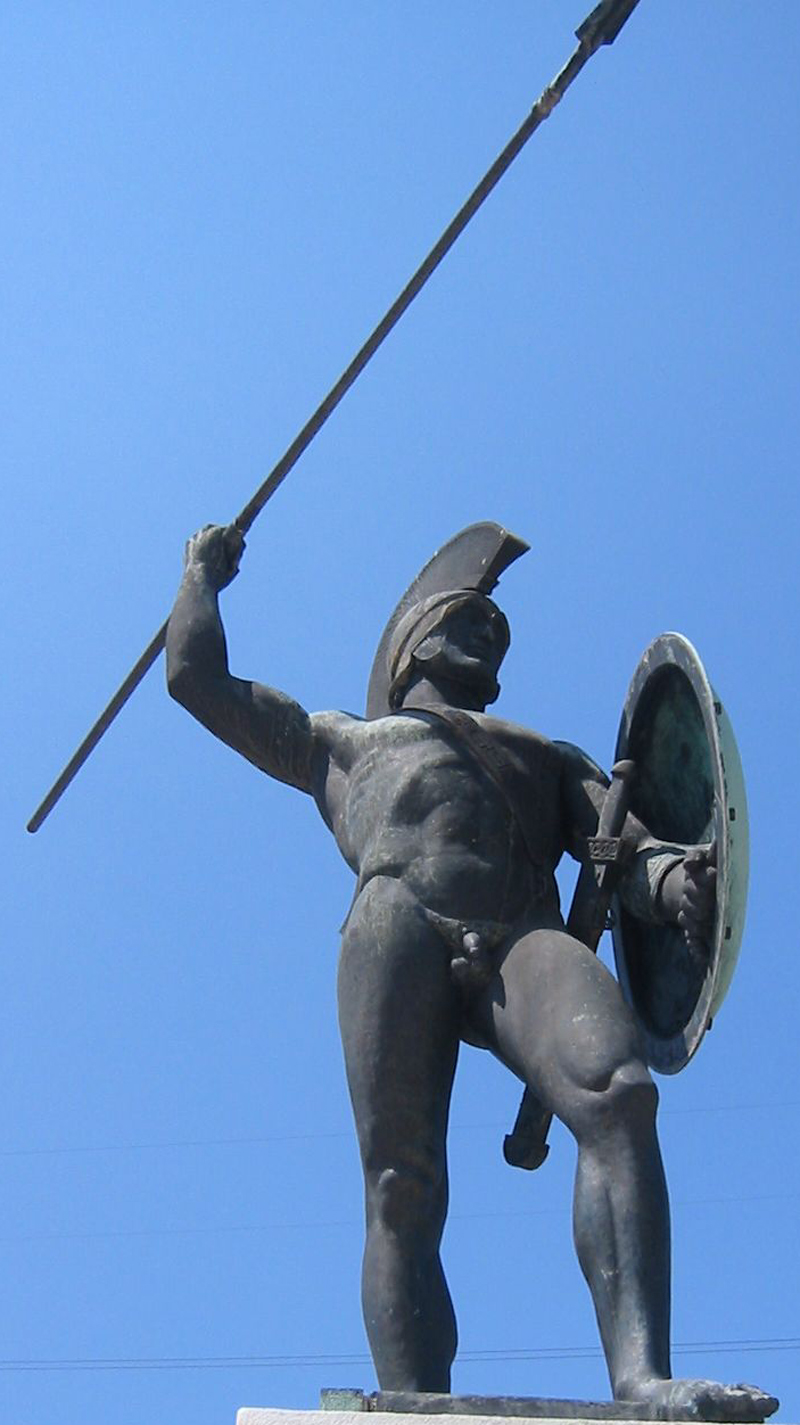




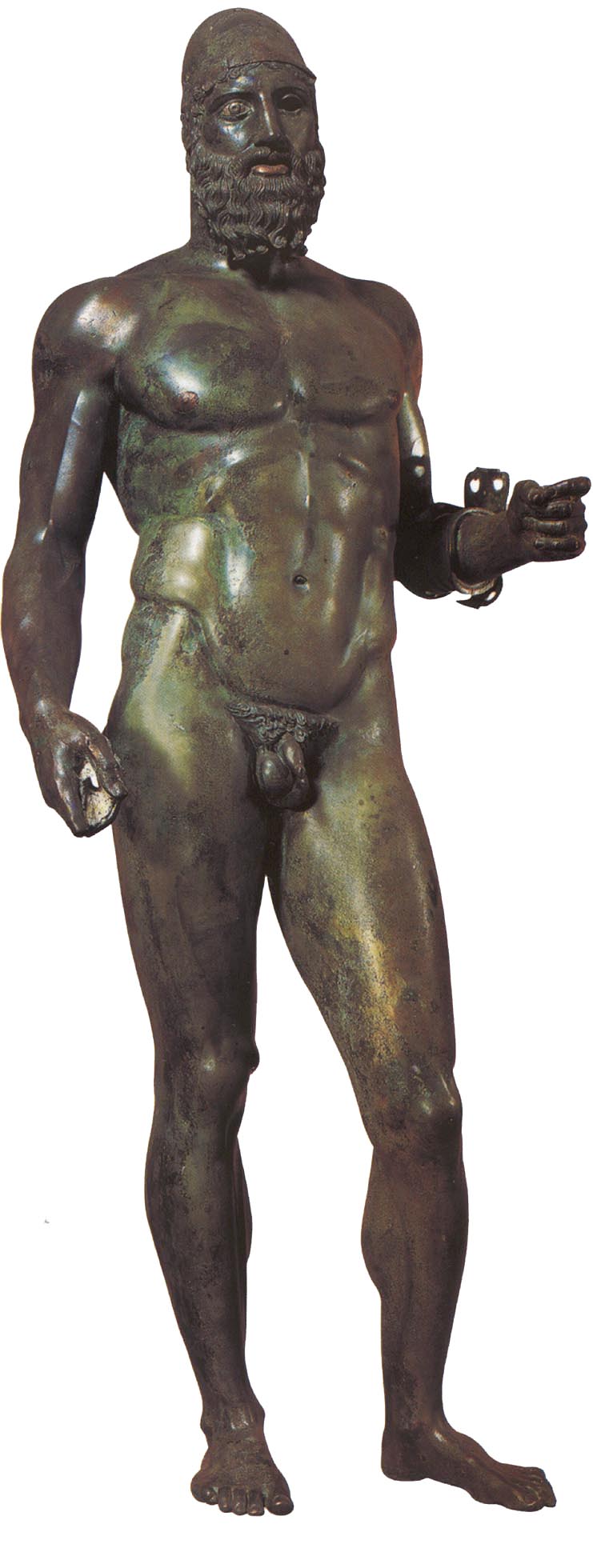


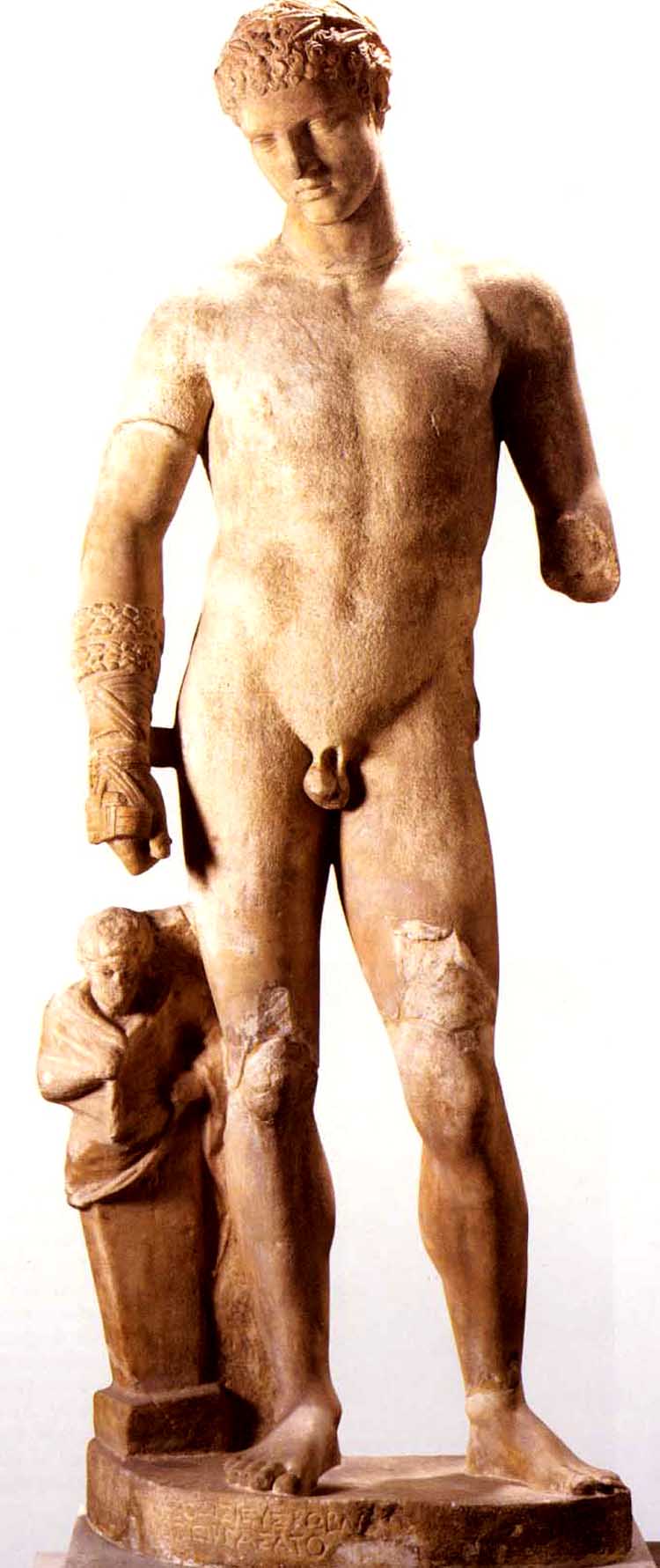
goodness, excellence, of any kind, esp. of manly qualities, manhood, valour, prowess, Hom., Hdt. (like Lat. vir-tus, from vir).
From the same root [ARES] comes areté ... the first notion of goodness being that of manhood, bravery in war; cf. Lat. virtus.
manliness, manhood, strength, vigor, bravery, courage, excellence
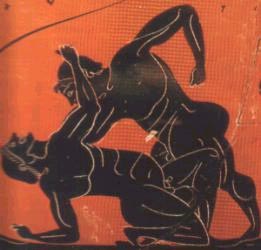



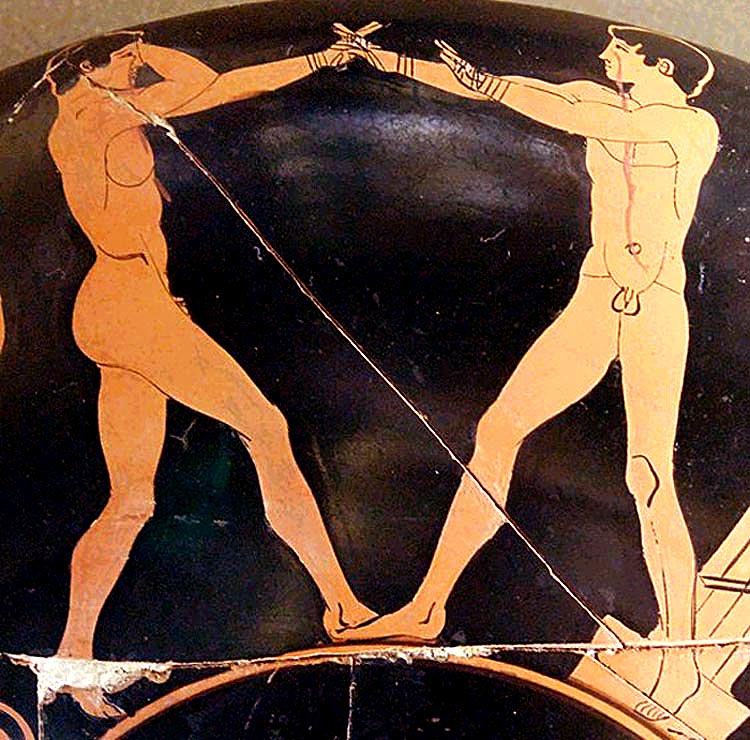








![]()



![]()
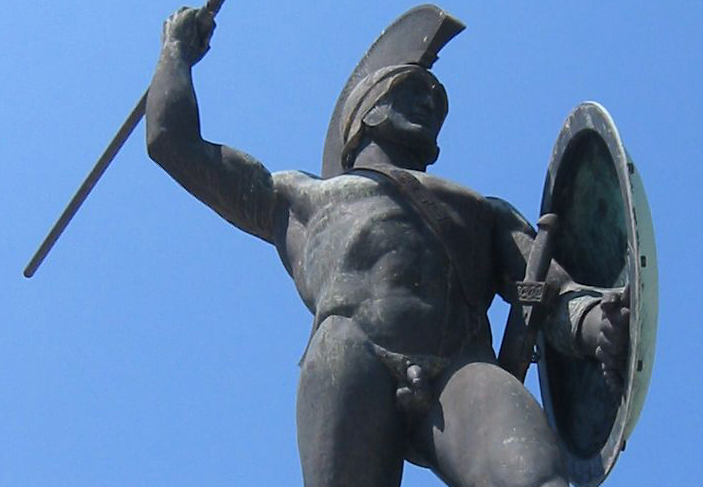






MANHOOD: A LEXICON
THE FIRST NOTION OF GOODNESS: The Alphas of Male
Ancient Greek Words:
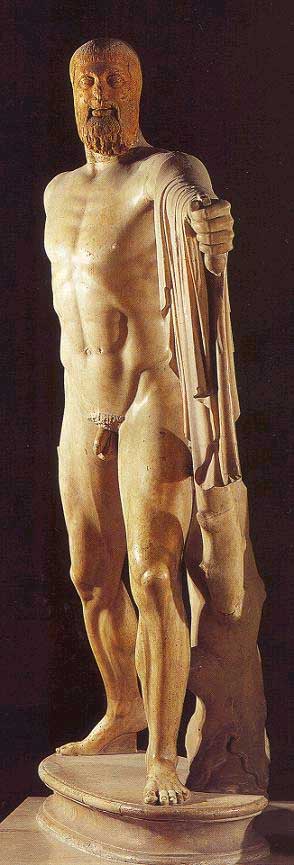

Aristogeiton and Harmodius
Warrior-Lovers and Tyrannicides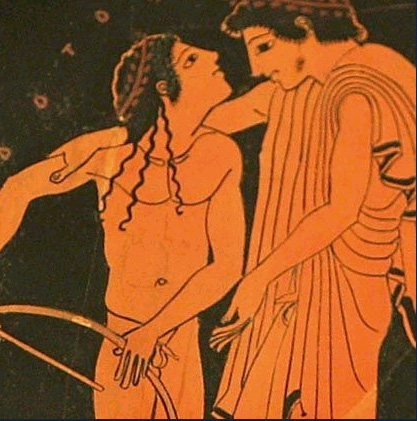
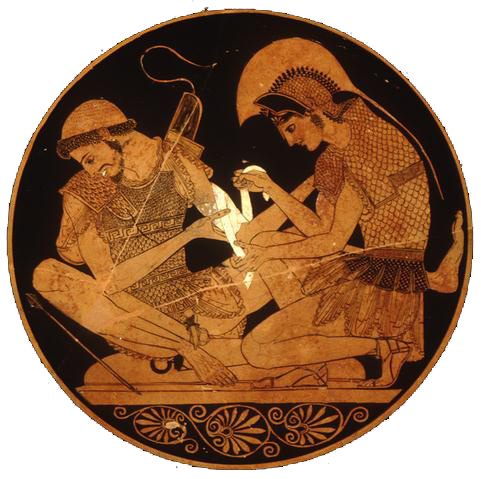
Achilles bandages his Lover Patroklos' wound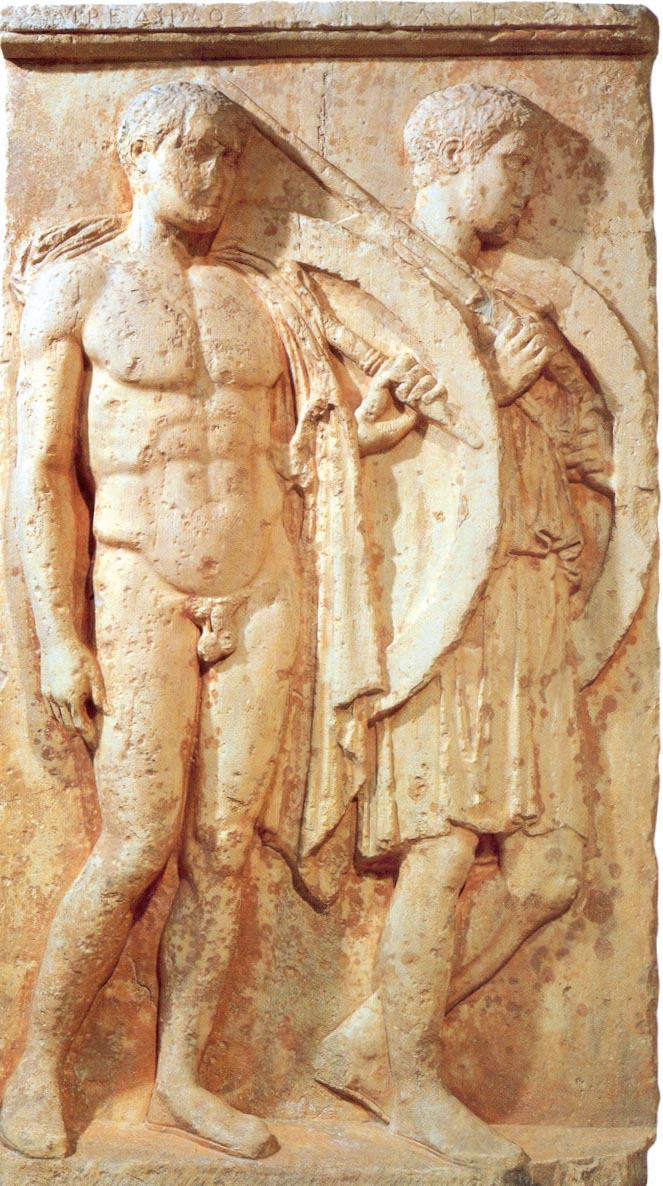
Chairedemos and Lykeas
Warrior-Lovers
who died in battle together
and were buried together
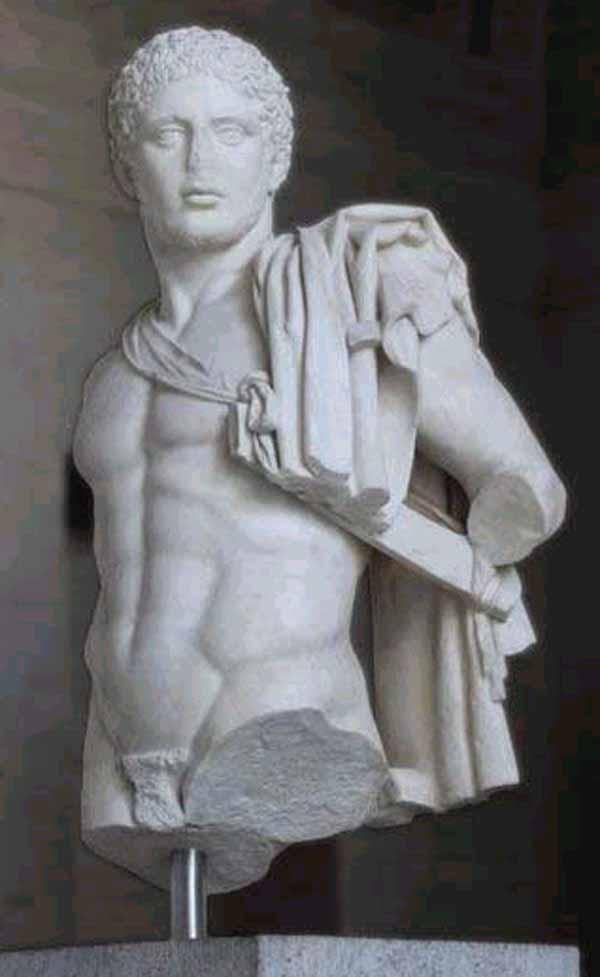



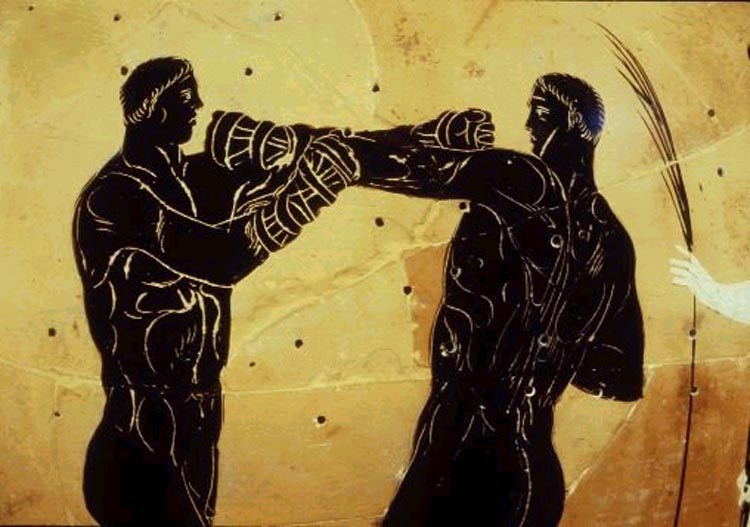


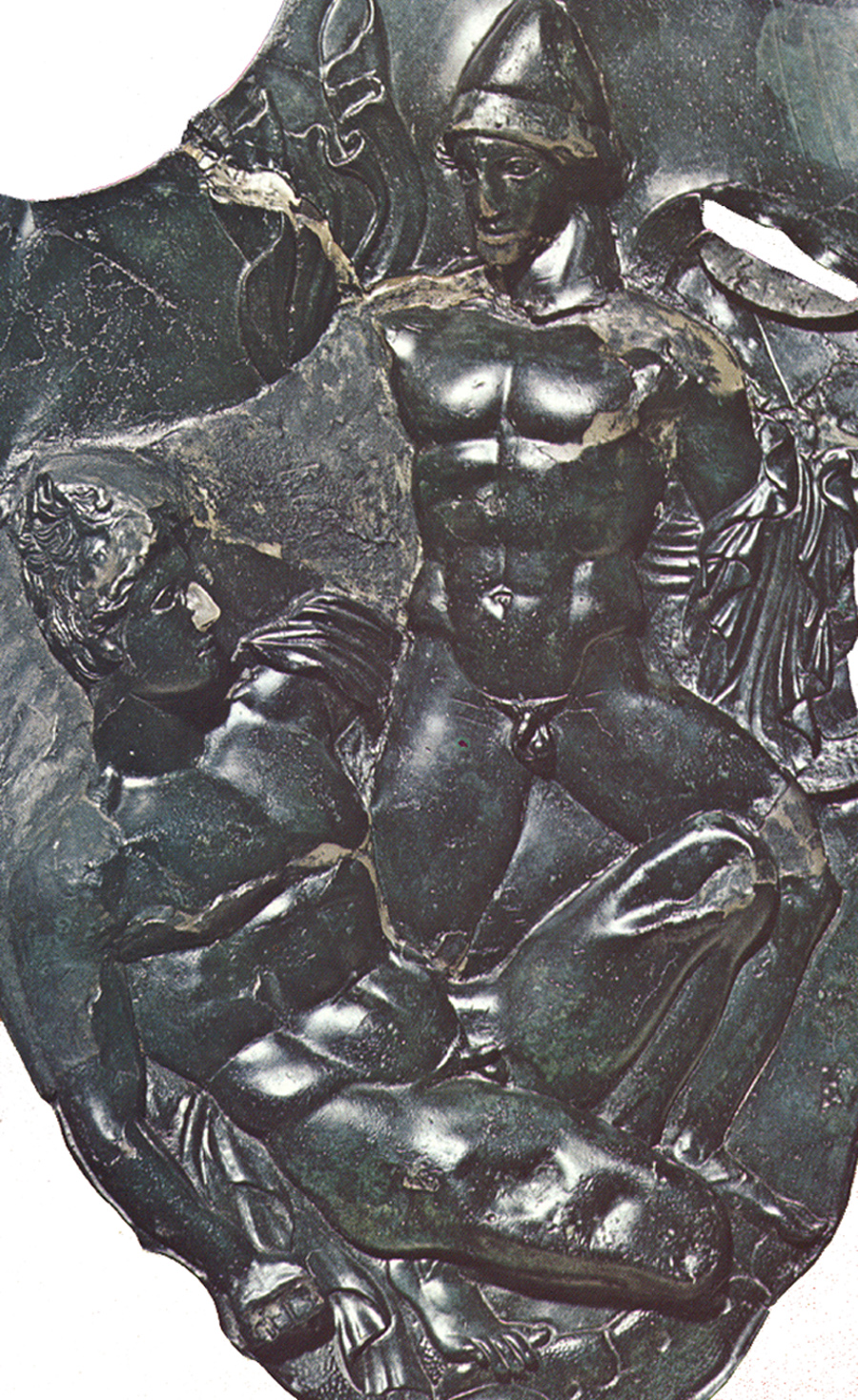

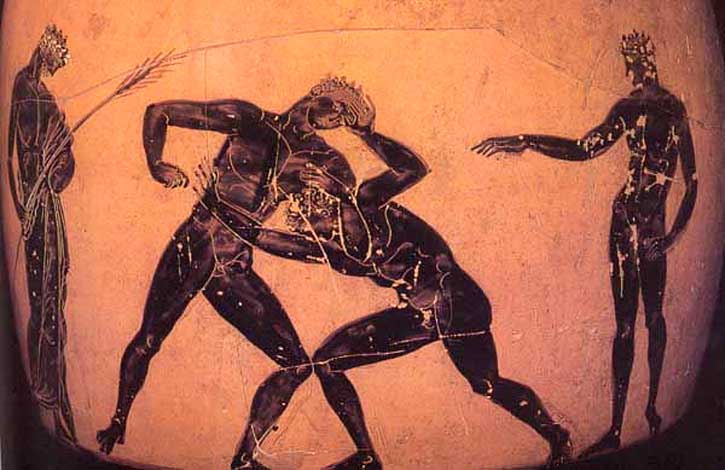




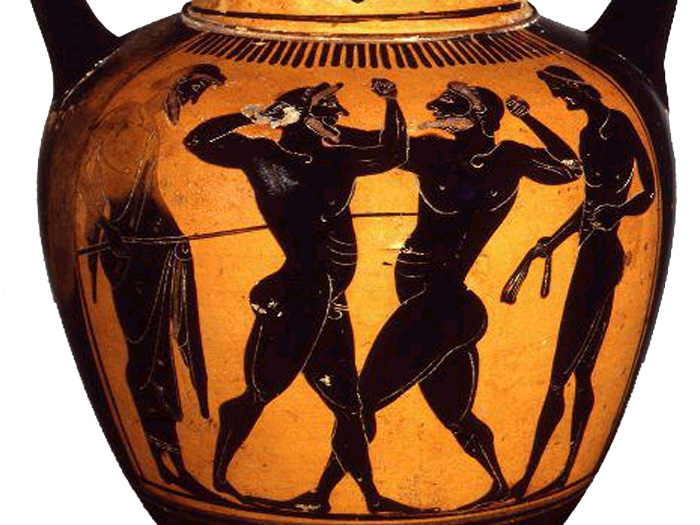

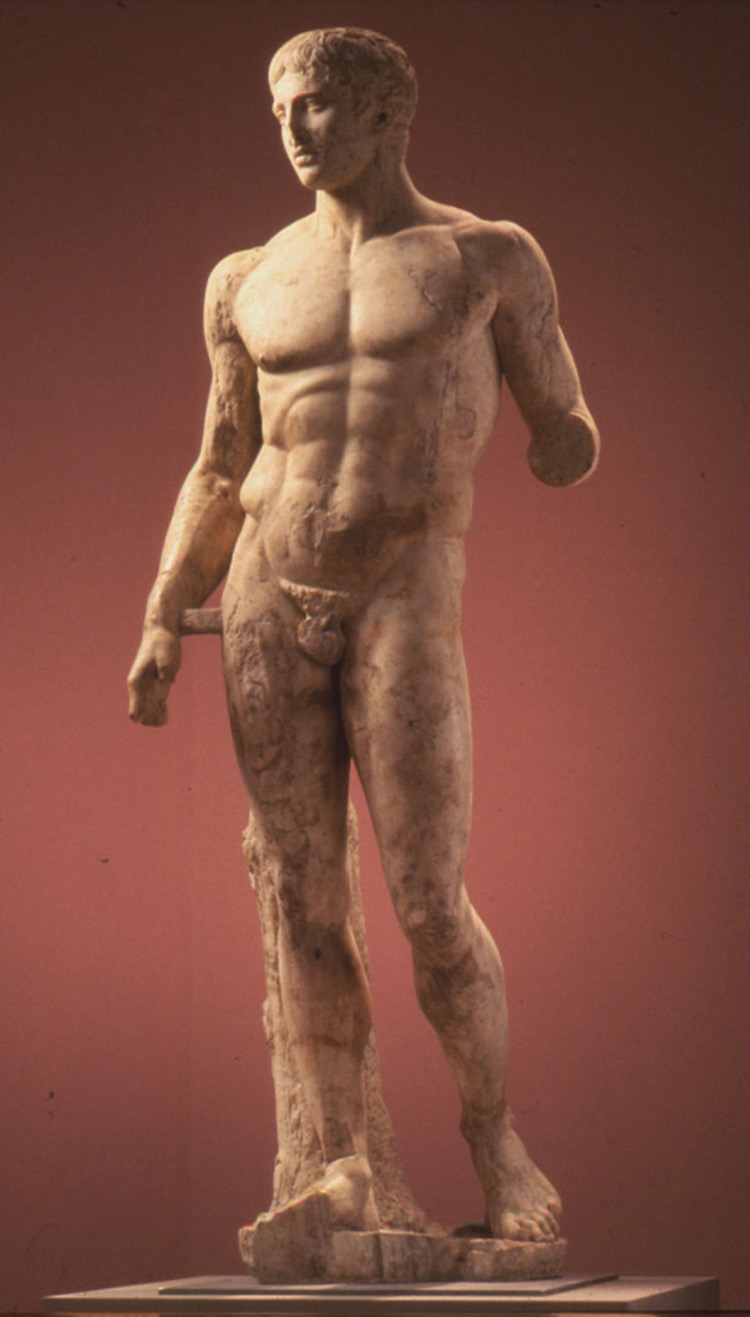

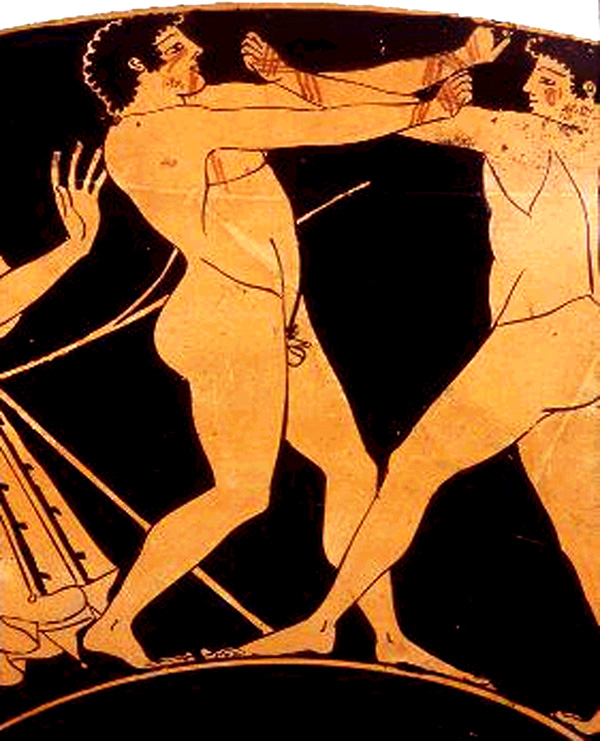


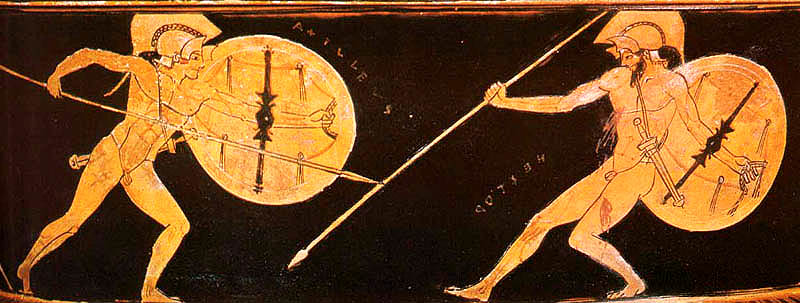

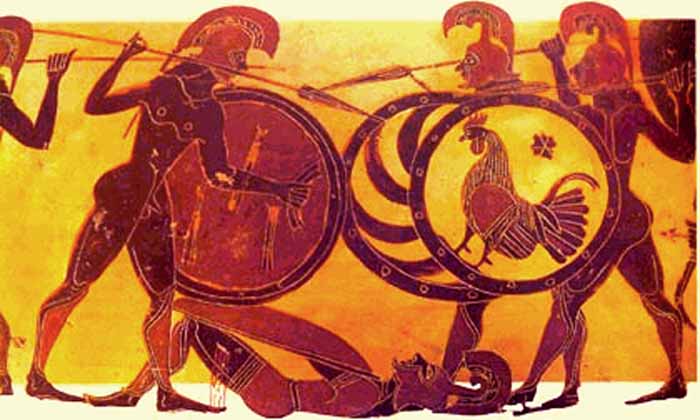


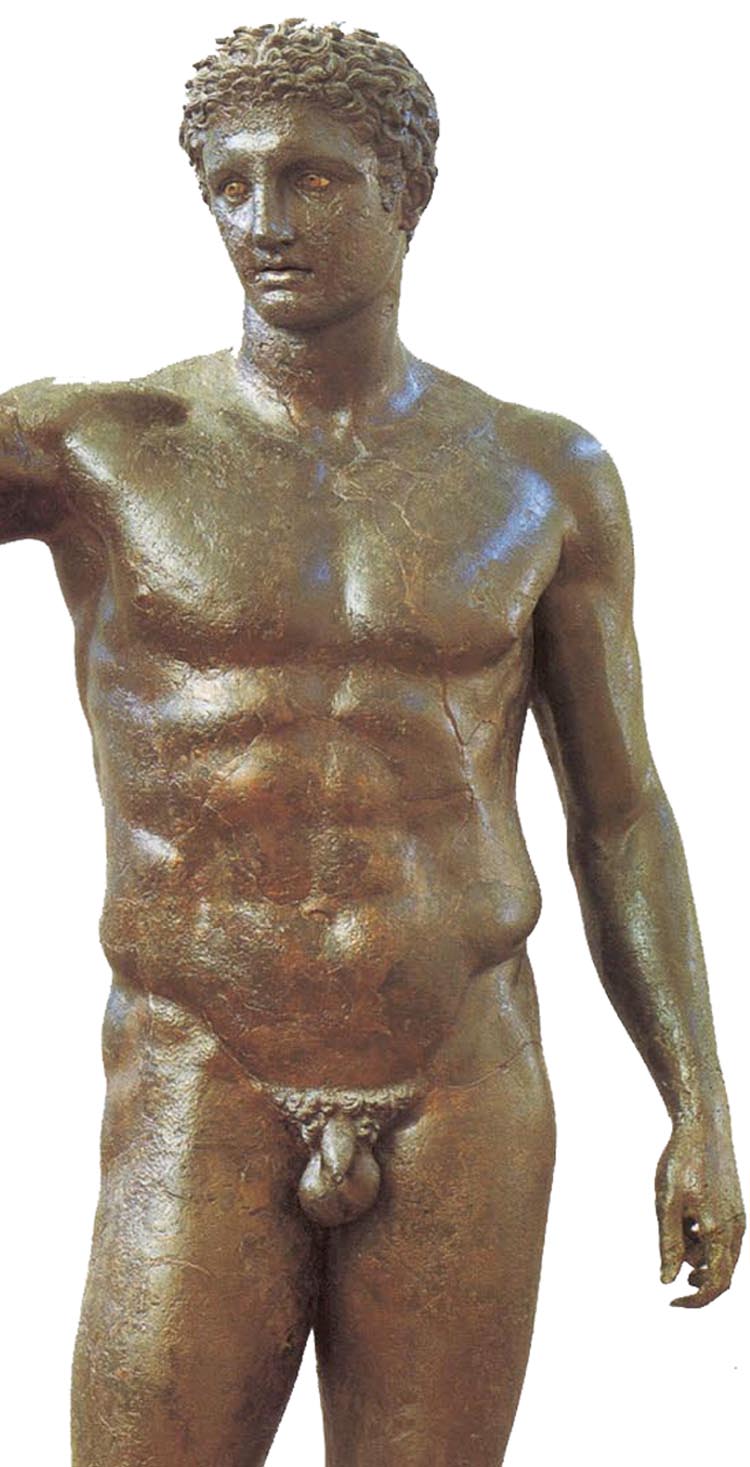
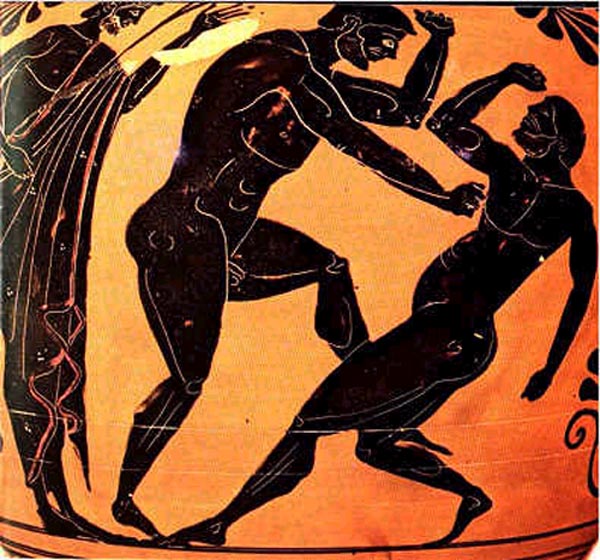
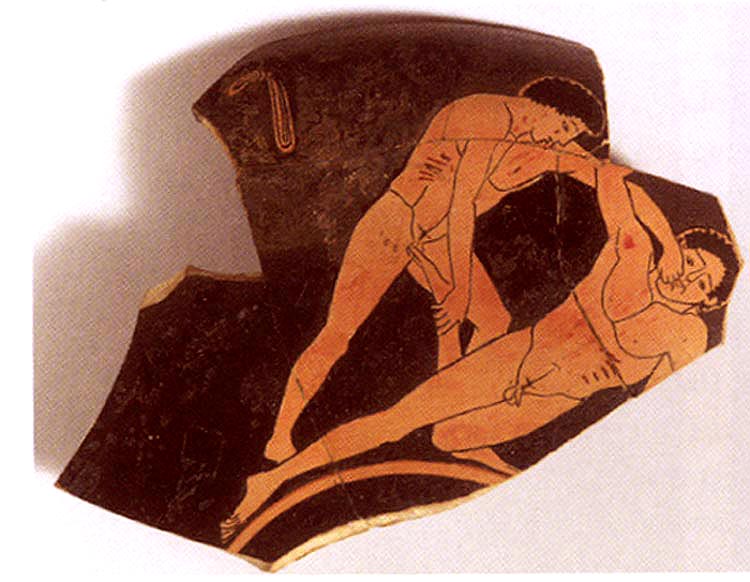

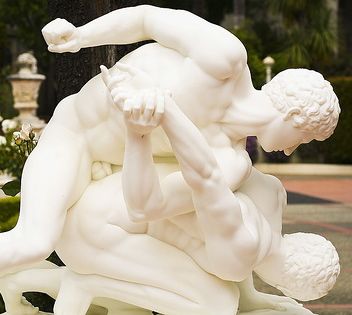

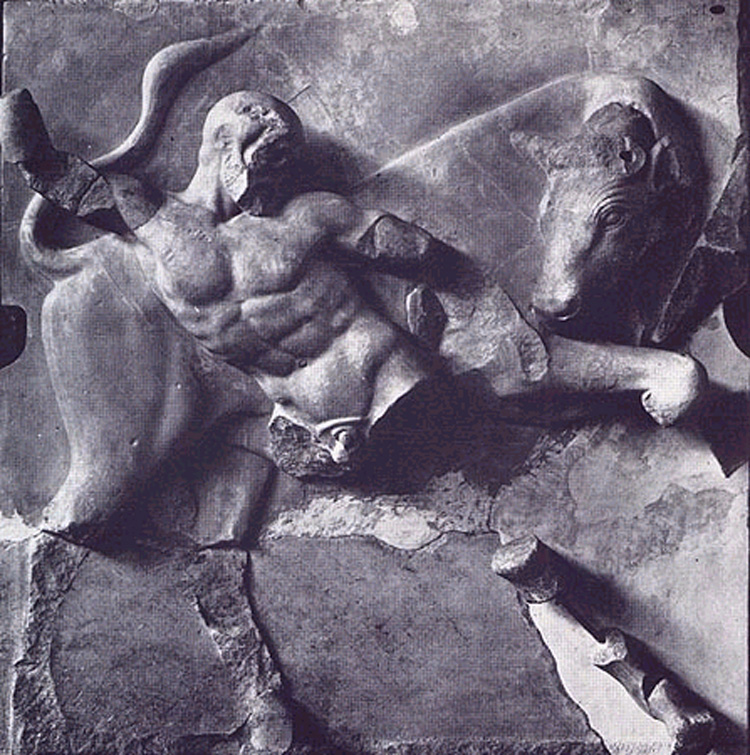
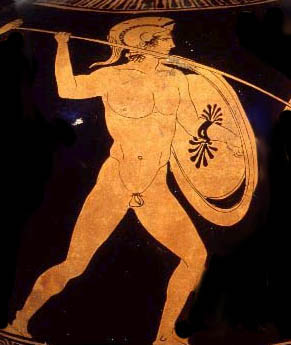
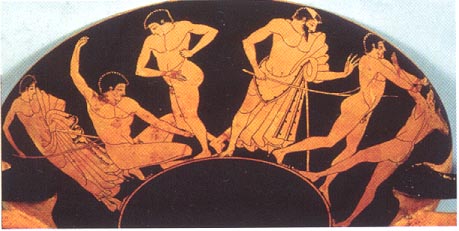
Composed of Men:
Boxers train at the Palaistra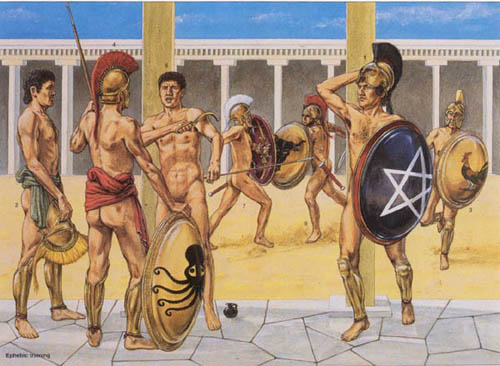
Composed of Men:
Ephebes train at the Palaistra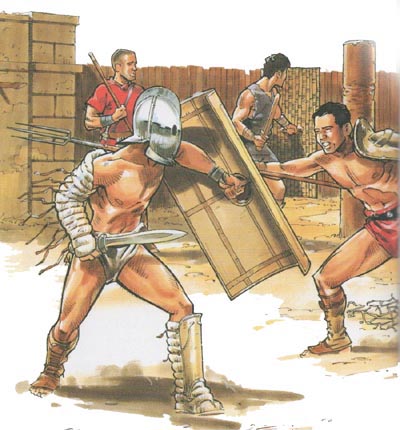
Composed of Men:
Gladiators train at a Ludus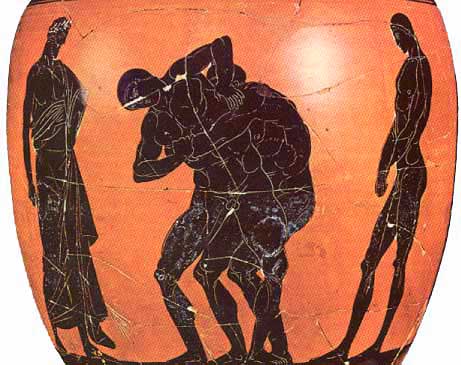
Composed of Men:
Wrestlers compete in an Agonia
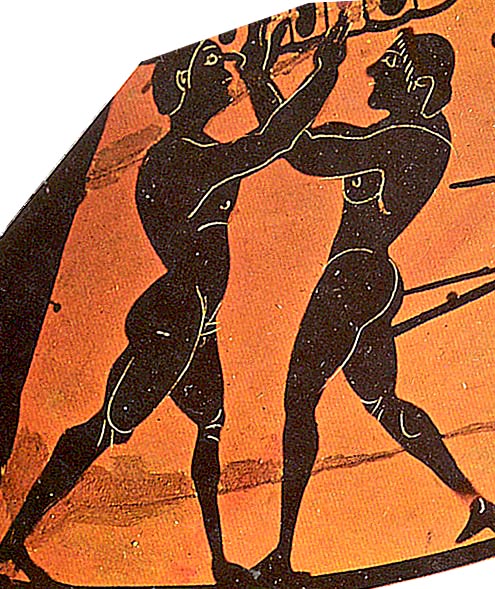

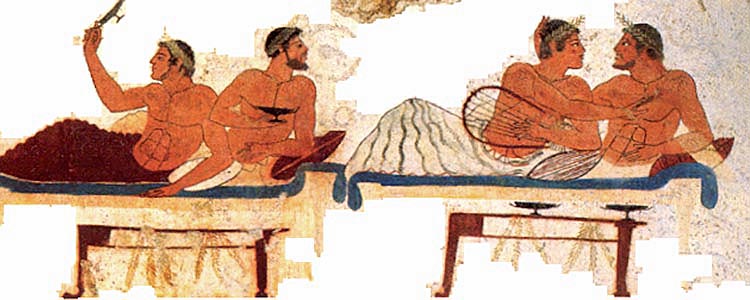

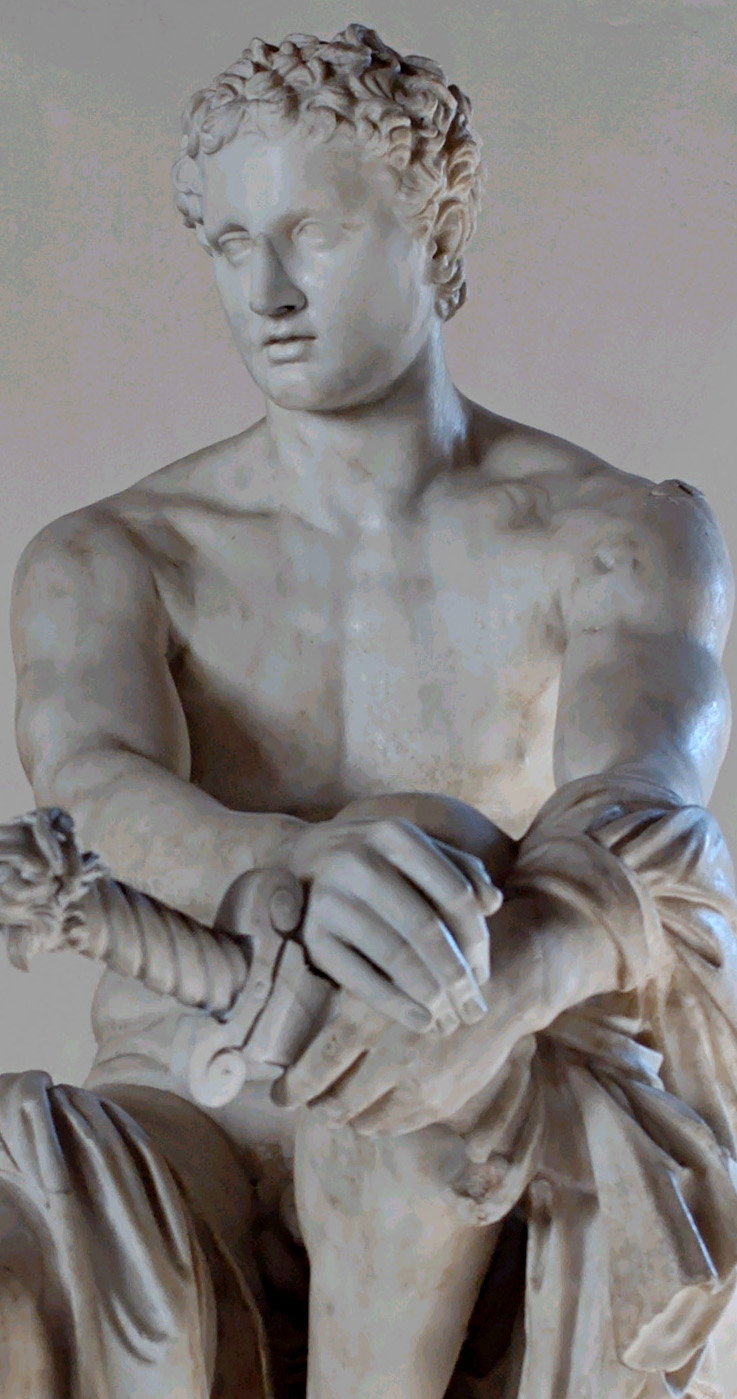

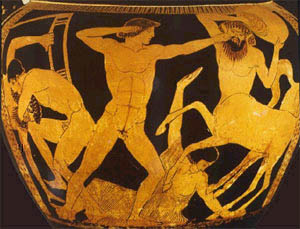
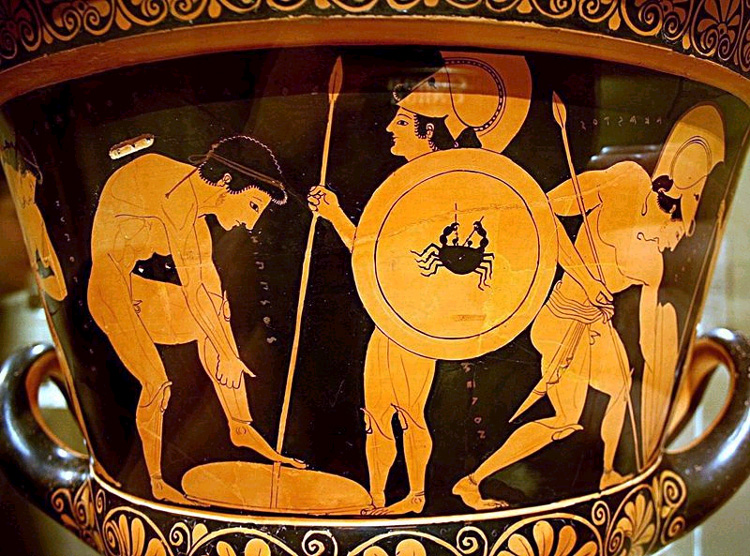
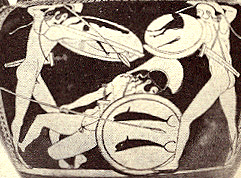
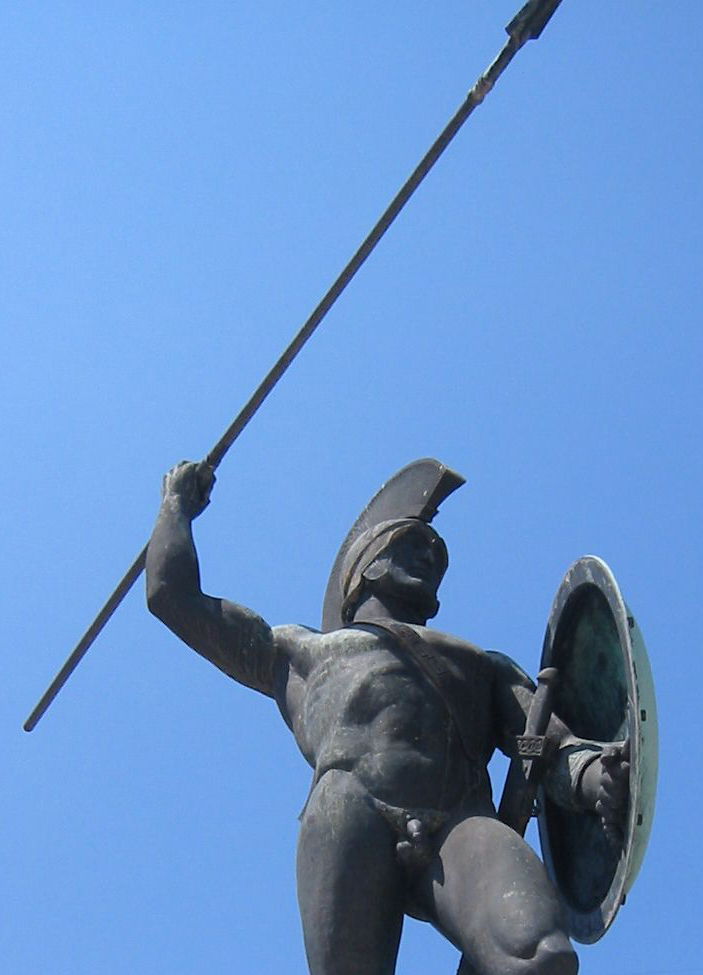
Manhood, manliness, strength, vigor, bravery, courage, excellence; Valour, gallantry, fortitude; Goodness, moral perfection, high character, virtue; Worth, merit, value.
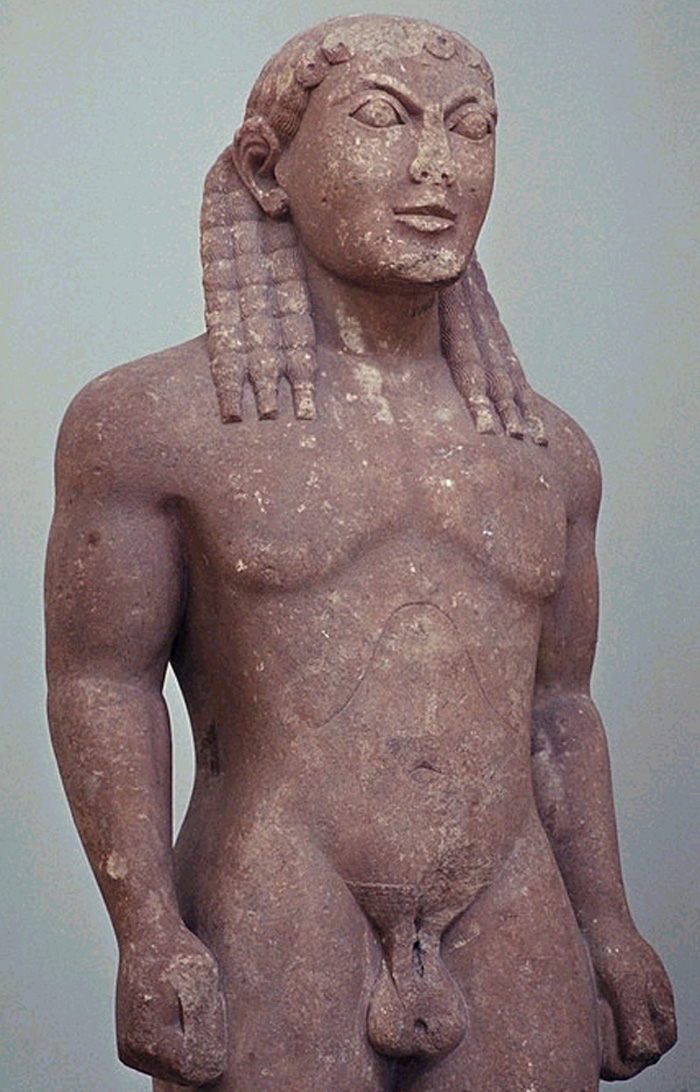
Manhood, manliness, strength, vigor, bravery, courage, excellence; Valour, gallantry, fortitude; Goodness, moral perfection, high character, virtue; Worth, merit, value, strength --
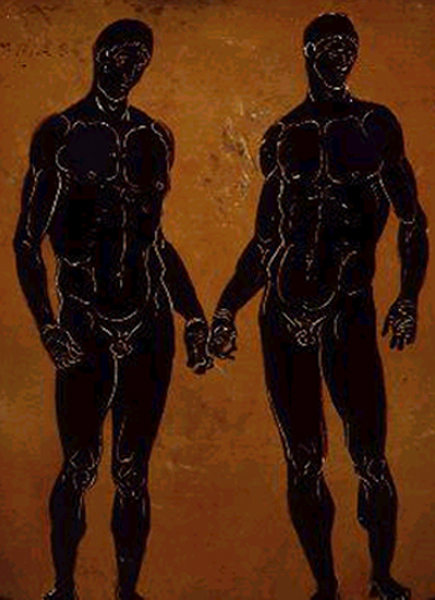
From the same root [ARES] comes areté ... the first notion of goodness being that of manhood, bravery in war; cf. Lat. virtus.
From the same root [ARES] come areté, ari-, areion [better], aristos [best], the first notion of goodness being that of manhood, bravery in war; cf. Lat. virtus.
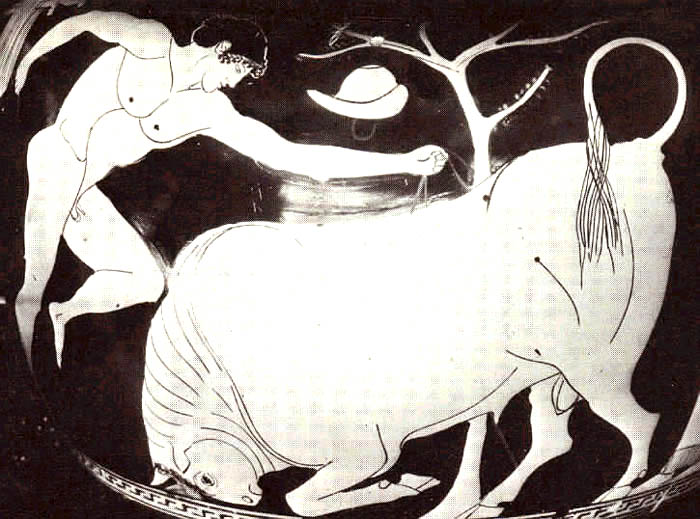
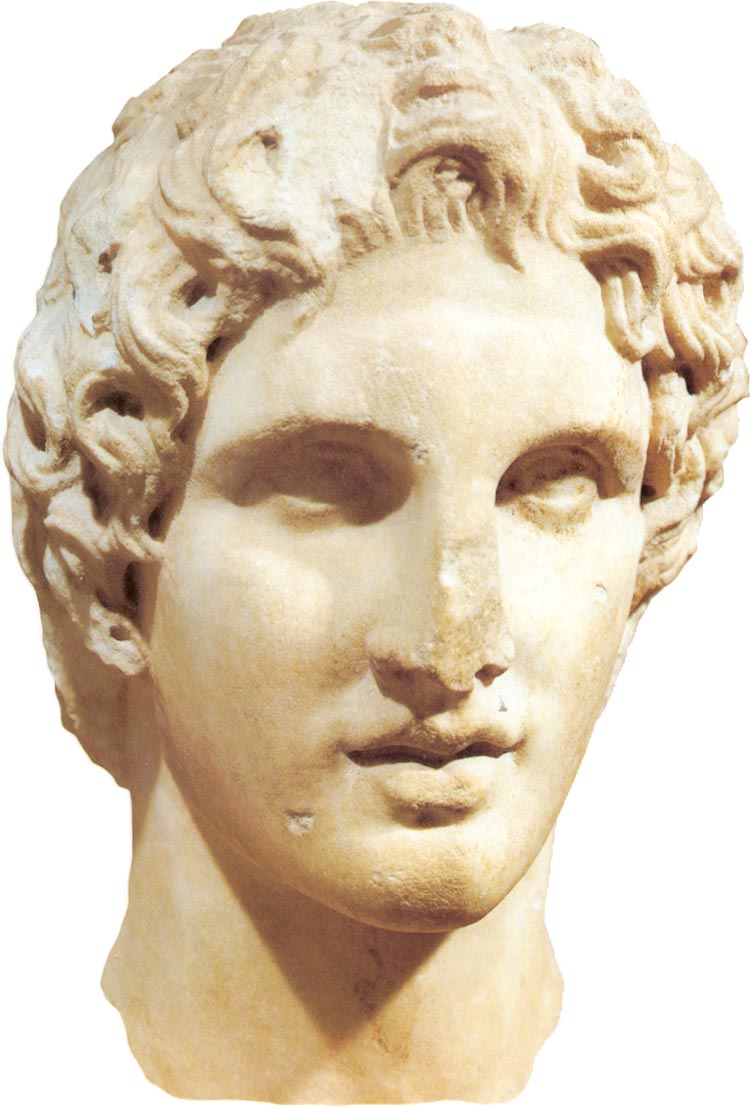

Alexander died in the 114th Olympiad, in the archonship of Hegesias at Athens. He lived, as Aristobulus tells us, thirty-two years and eight months, and reigned twelve years and eight months. He had great personal beauty, invincible power of endurance, and a keen intellect; he was brave and adventurous, strict in the observance of his religious duties, and hungry for fame. Most temperate in the pleasures of the body, his passion was for glory only, and in that he was insatiable. He had an uncanny instinct for the right course in a difficult and complex situation, and was most happy in his deductions from observed facts. In arming and equipping troops, and in his military dispositions, he was always masterly. Noble indeed was his power of inspiring his men, of filling them with confidence, and, in the moment of danger, of sweeping away their fear by the spectacle of his own fearlessness. When risks had to be taken, he took them with the utmost boldness, and his ability to seize the moment for a swift blow, before his enemy had any idea of what was coming, was beyond praise. No cheat or liar ever caught him off his guard, and both his word and his bond were inviolable. Spending but little on his own pleasures, he poured out his money without stint for the benefit of his friends.
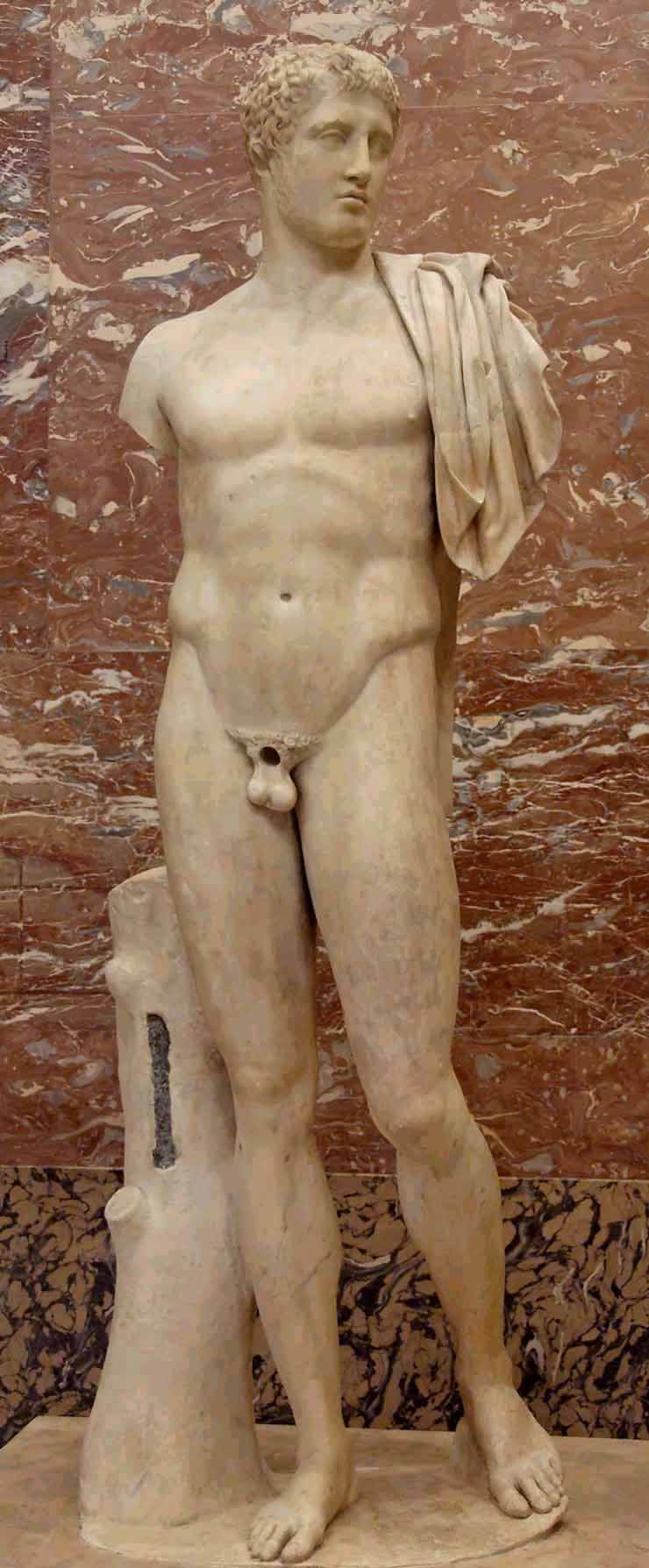
Diomedes
the short but glorious aristeia [heroism] of the Greek spirit. The basic motive of Greek areté is contained in the words 'to take possession of the beautiful'. The courage of a Homeric nobleman is superior to a mad berserk contempt of death in this -- that he subordinates his physical self to the demands of a higher aim, the beautiful. And so the man who gives up his life to win the beautiful, will find that his natural instinct for self-assertion finds its highest expression in self-sacrifice.

Achilles Slays Hektor
Achilles knows that by killing Hektor to avenge the death of his Lover Patroklos
His own Life will be lost
[T]he man who gives up his life to win the beautiful, will find that his natural instinct for self-assertion finds its highest expression in self-sacrifice.

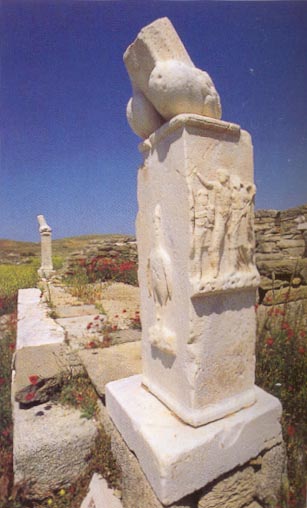
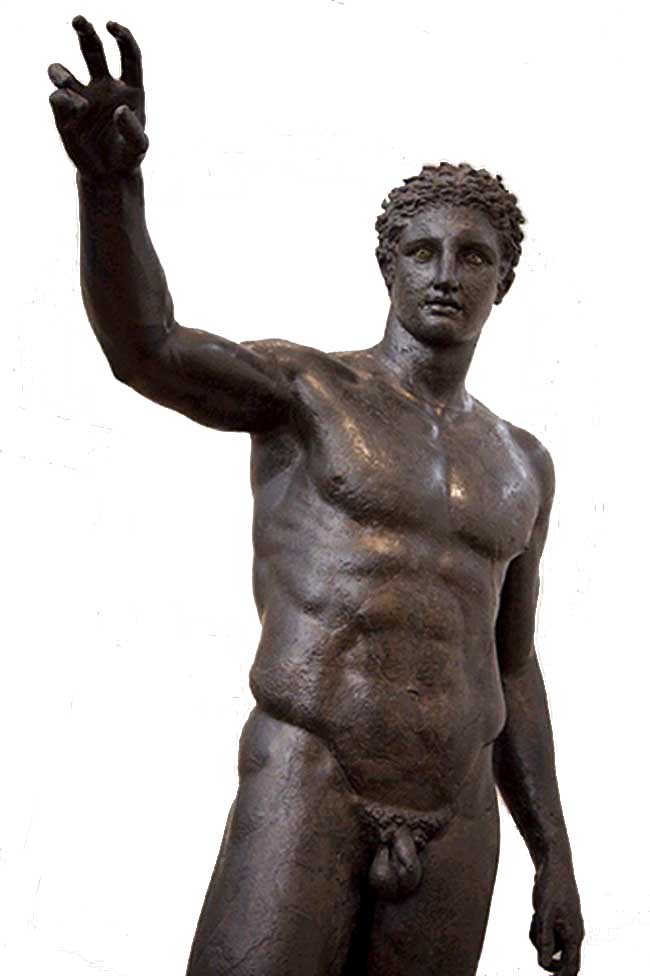
Ares, then, if you like, would be named for his virility [arren] and courage [andreion = Manliness, Manhood], or for his hard and unbending nature, which is called arratos; so Ares would be in every way a fitting name for the God of War.


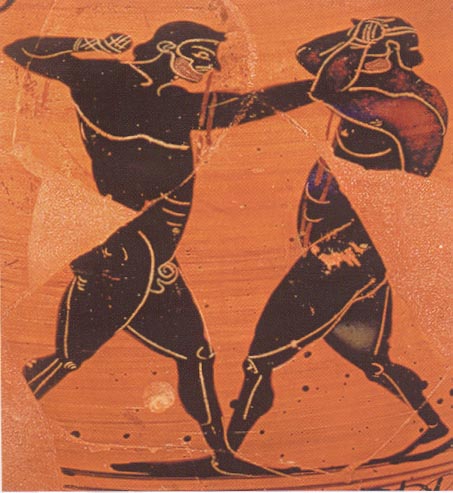
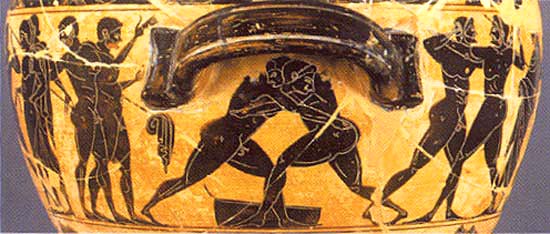





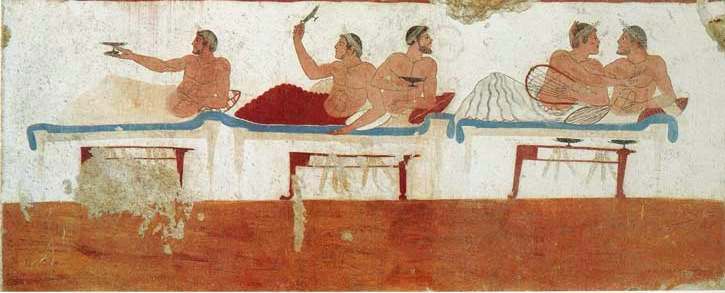
Manhood, manliness, strength, vigor, bravery, courage, excellence; Valour, gallantry, fortitude; Goodness, moral perfection, high character, virtue; Worth, merit, value.
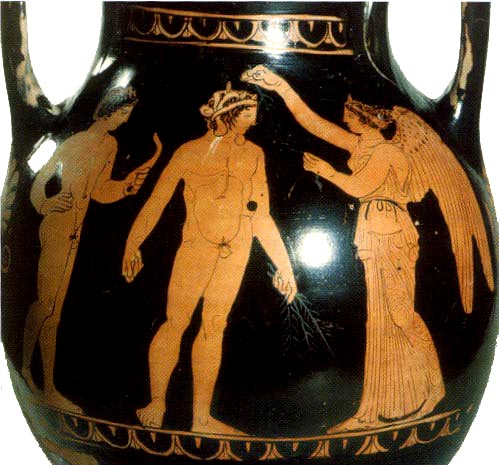







MANHOOD: A LEXICON
THE FIRST NOTION OF GOODNESS: The Morally Beautiful, the Righteously Erect, and the Warrior Worthy
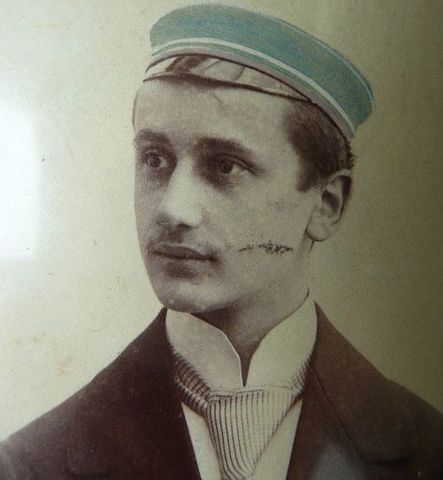
Sokrates:
[The Spartans] prefer it to be thought that they owe their superiority to fighting and valor, conceiving that the revelation of its real cause would lead everyone to practise this wisdom. So well have they kept their secret that they have deceived the followers of the Spartan cult in our cities, with the result that some get broken ears by imitating them, bind their knuckles with thongs, go in for muscular exercises [gymnastika -- nude training, from gymnuo, to strip naked, from γυμνος, nude], and wear dashing little cloaks, as though it were by these means that the Spartans were the masters of Greece.
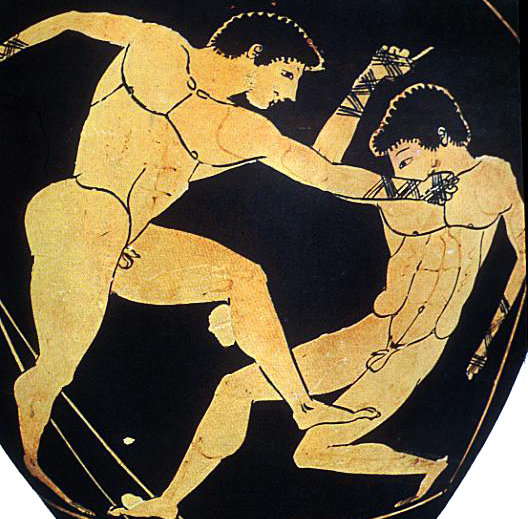

Socrates
Nothing: but tell me one thing in addition -- whether the Athenians are said to have become better because of Pericles, or quite the contrary, to have been corrupted by him. What I, for my part, hear is that Pericles has made the Athenians idle, cowardly, talkative, and avaricious, by starting the system of public fees.
You hear that from the folk with battered ears [2], Socrates.
[2] i.e. people who show their Spartan sympathies by an addiction to boxing
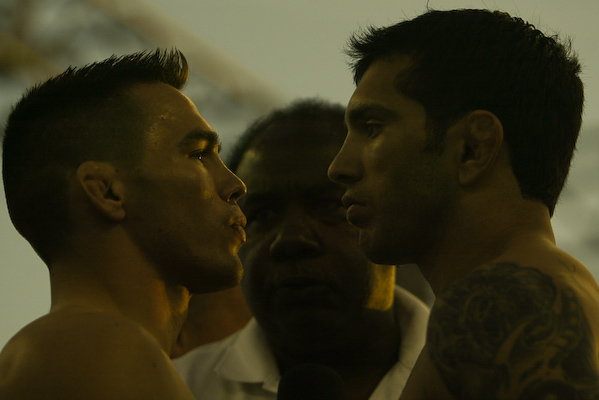
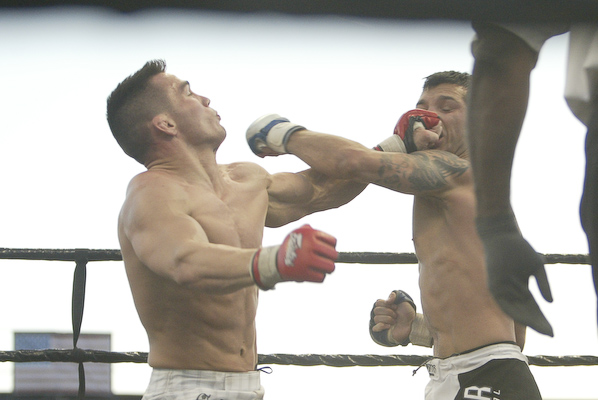
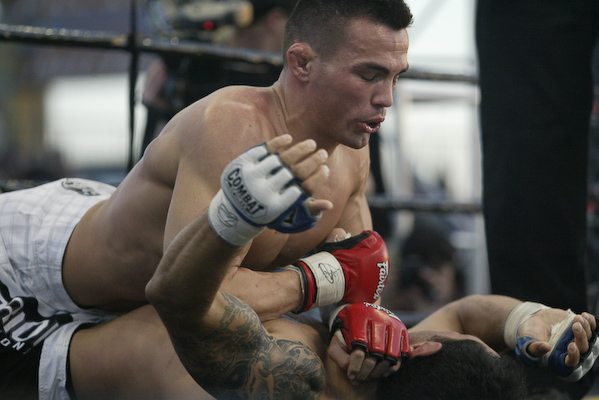
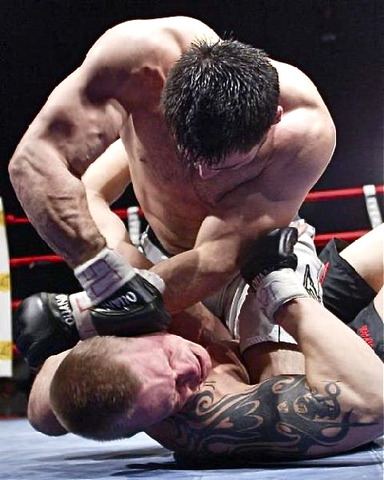
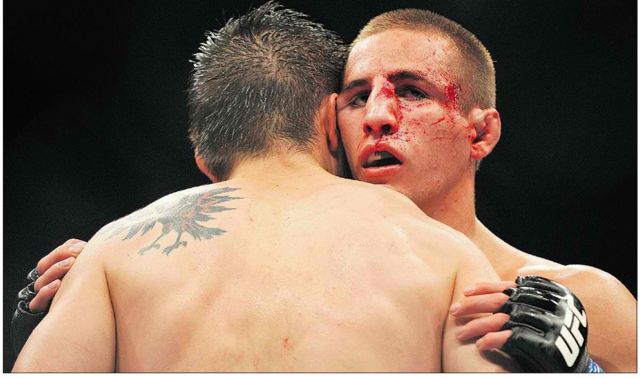
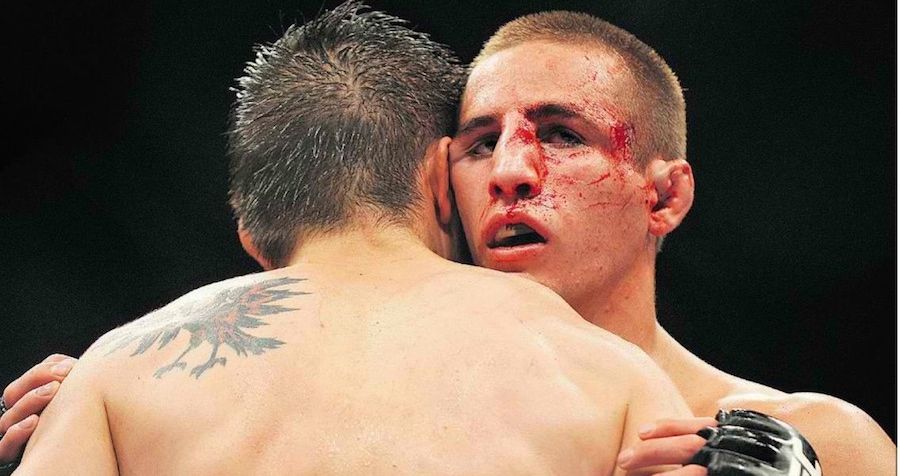
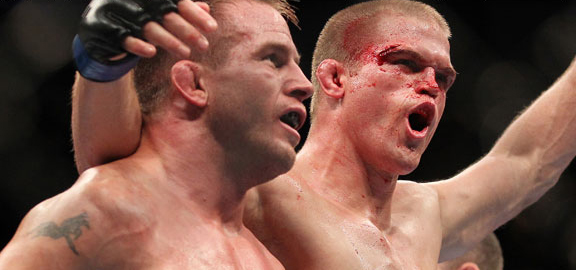
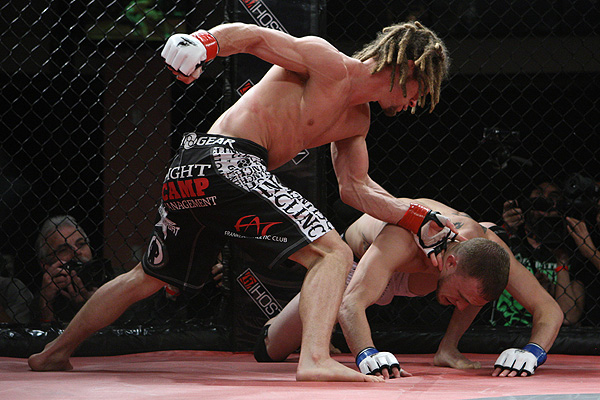

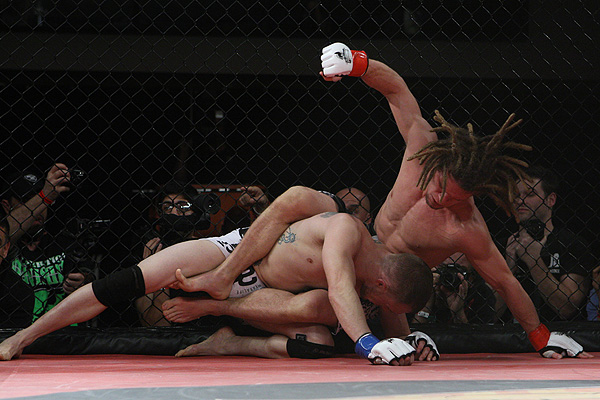
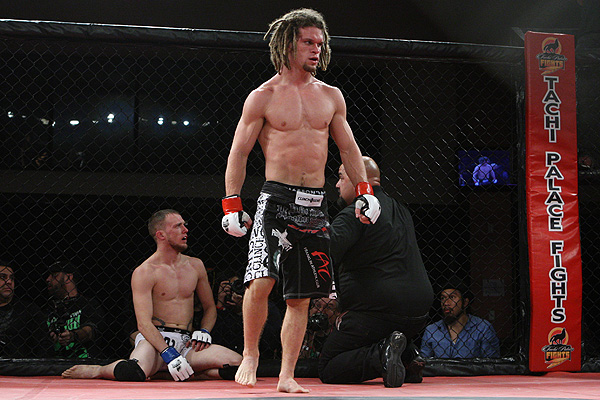
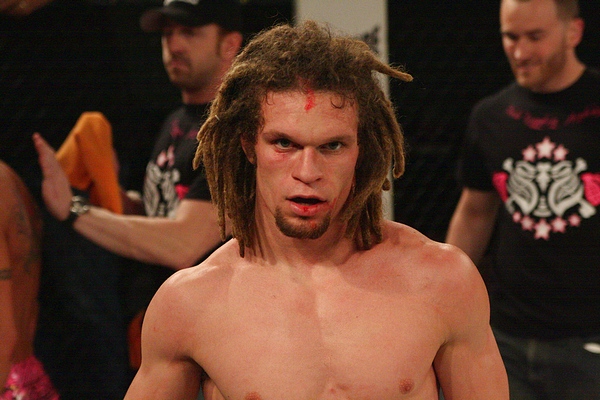
the ultimate vindication of Manhood lies in Fighting
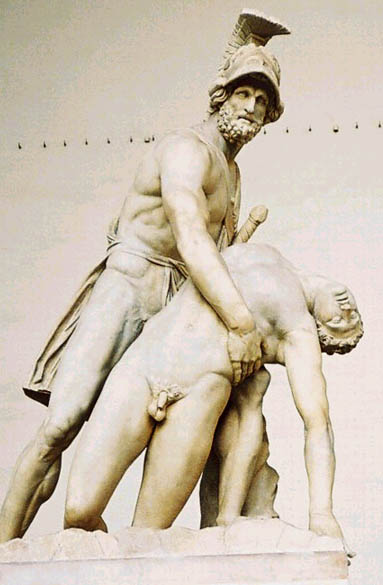
The basic motive of Greek areté is contained in the words 'to take possession of the beautiful'. The courage of a Homeric nobleman is superior to a mad berserk contempt of death in this -- that he subordinates his physical self to the demands of a higher aim, the beautiful. And so the man who gives up his life to win the beautiful, will find that his natural instinct for self-assertion finds its highest expression in self-sacrifice.



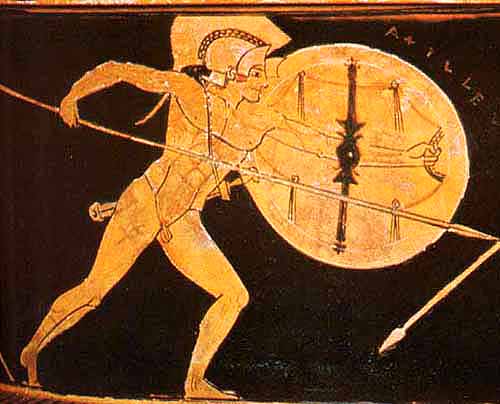
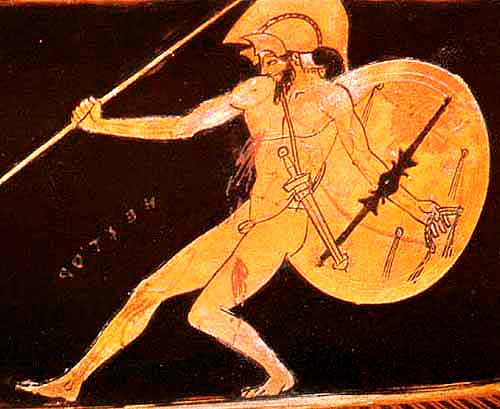
The courage of a Homeric nobleman is superior to a mad berserk contempt of death in this -- that he subordinates his physical self to the demands of a higher aim, the beautiful. And so the man who gives up his life to win the beautiful, will find that his natural instinct for self-assertion finds its highest expression in self-sacrifice.











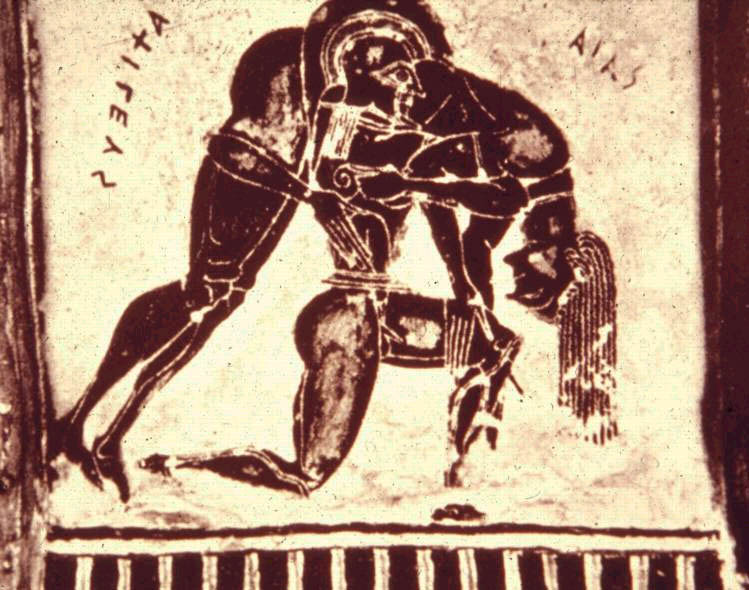





This Absolute Manly Moral Beauty, this Supreme Manhood, is eternal,
unproduced, indestructible; neither subject to increase nor
decay; not, like other things, partly Manly and partly base; not at
one time Manly and another time not; not Beautiful and Morally Manly
in relation to one thing and deformed and shameful in relation to
another; not here Manly and there deformed; not Manly in the
estimation of one person and base in that of another; nor can this
Supreme Manly Beauty be figured to the imagination like a noble face,
or strong hands, or any portion of the body, not like any discourse or
science. Nor does it subsist or live in any other thing that lives or
is, either in earth, or in heaven, or in any other place; but it is
eternally uniform, and consistent, and monoeidic [single-formed] with
itself.
what children of his soul Lycurgus has appointed to be the guardians, not just of Lacedaimon [Sparta], but of all Greece

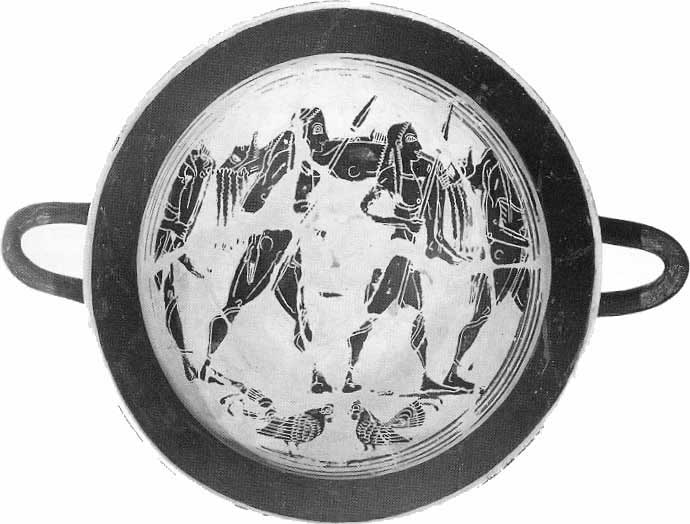
Therefore, let one of his comrades,
in honor of the pankration, weave for Kleandros
a luxurious crown of myrtle,
since the contest of Alkathoos [another competition] and the youth
in Epidauros welcomed him before with good fortune.
A good man has the means to praise him,
for he has not suppressed in a hole
a youth without experience of noble deeds.
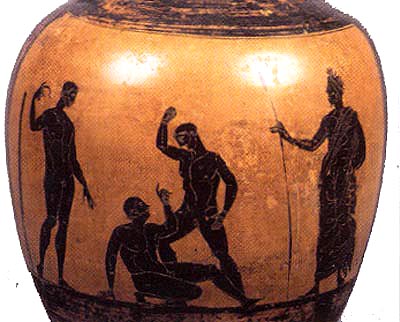
obedience, although part of the Spartan code (the [Ta] Kala, "the noble way"), was a competitive excellence [areté] that jostled with other competitive excellences . . .
[Lycurgus, the Spartan lawgiver,] saw that where the spirit of rivalry [philoneikia -- love of strife, love of eager rivalry] is strongest among the people, there the choruses are most worth hearing and the [nude] athletic contests afford the finest spectacle.
the Spartan code (the Kala, "the noble way")

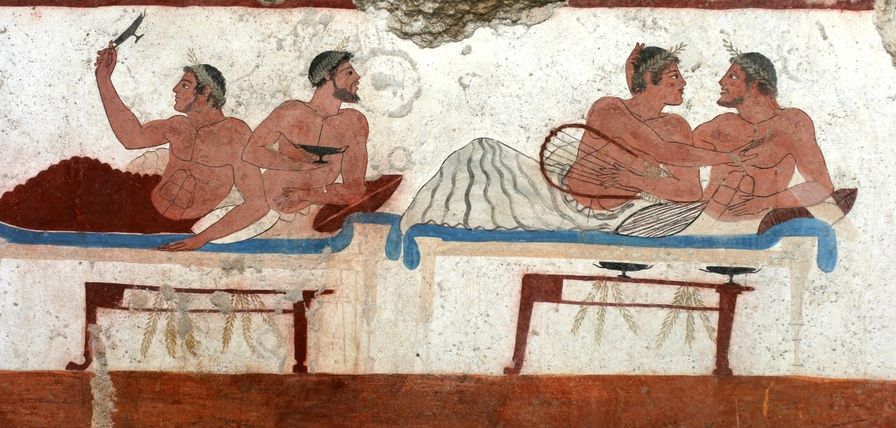
Men at a symposion ca 470 BC
Plato's Symposion takes place in 416 BC
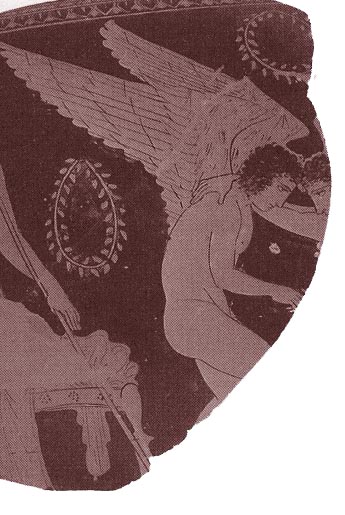
Eros and Anteros Wrestling
Eros is an Agonist
Anteros his Antagonist
Lovers are Wrestlers and Fighters
Young Men matched together in a Strife of Valour, a Combative Contest of, about, and for Manhood, whose purpose is to achieve a high level of Manly Goodness and Virtue; and those Young Men are joined together in Fight, in Strife over who most merits The Noble Warrior Way of Manly Moral Beauty; this Strife is dearest to the Gods, and sets the standard for a Good and Brave Man's conduct; for the Young Men Fight -- whenever they meet.
Here then you find that kind of strife that is dearest to the Gods, and in the highest sense political -- the strife that sets the standard of a Good and Brave Man's conduct; and in which either party exerts itself to the end that it may never fall below its best, and that, when the time comes, every member of it may support the state with all his might.




For I cannot name a time when I was not in love with some one
Male desire for other Men cannot be tied to a minority group.
Setting one's heart on such traits gives an insight into the lover's character.



"And Sparta too," he added, "that Sparta of ours, fellow soldiers, which is accounted so prosperous -- she be well assured, won her prosperity and her glory [Ta Kala], not by careless idling, but by being willing to undergo both toils and dangers whenever there was need. Now you in like manner were in former days, as I know, good men; but now you must strive to prove yourselves even better men, in order that, just as we gladly undergo toils together, so we may gladly enjoy good fortune together."
Sparta won her prosperity and her morally beautiful noble achievements, not by careless idling, but by being willing to undergo both toils and dangers whenever there was need.
The "good things in the city" [Brownson's "good gifts of the state"] refers to the Spartan training and upbringing [the agogé], comprising not only the values it brought to men who had experienced it (honor, courage, good order, for example), but also the practices (the ascetic way of life, the training, and the competition) that fostered such values.
the highest kind of love which makes man reach out towards the highest areté [Manly Excellence, Virtue, Manhood] through which he 'takes possession of the beautiful'.
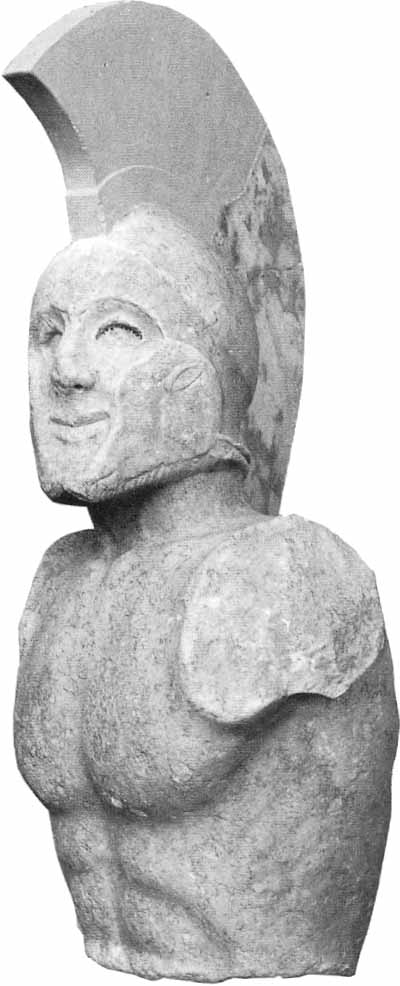
L E O N I D A S
Spartan Hero
That here obedient to their laws we lie.


[Seeing that his troops were about to be ambushed by the Athenians,] Anaxibios, judging that there was no hope of safety, inasmuch as he saw that his army extended over a long and narrow way, and thought that those who had gone on ahead would clearly be unable to come to his assistance up the hill, and since he also perceived that all were in a state of terror when they saw the ambush, said to those who were with him: "Men, it is a fine thing [kalon -- a noble deed, a morally beautiful achievement] for me to die here, but you must hasten to safety before the enemy is upon us."
But the rest of the Lacedaemonians fled and fell one after another, the enemy pursuing as far as the city. Furthermore, about two hundred of the other troops of Anaxibios were killed, and about fifty of the Abydene hoplites.
Among the reported advantages of [male Eros] was that of exaggerating competition among the warriors: lovers competed with each other and dreaded to be shamed in the presence of those they loved.
Lovers who were bound by the male Eros were guarded by a deeper sense of honour from committing any base action, and were driven by a nobler impulse in attempting any honourable deed.
"Then will not law-suits and accusations against one another vanish, one may say, from among them, because they have nothing in private possession but their bodies, but all else in common? So that we can count on their being free from the dissensions that arise among men from the possession of property, children, and kin."
there could not rightly arise among them any law-suit for assault or bodily injury. For between age-mates[1] and comrades we shall say that to defend oneself, to repel an assault is morally beautiful and just [dikaios], thereby compelling them to keep their bodies in condition.
footnote 1 Cf. [compare] A.J.P. vol. xiii. p. 364, Aeschines iii. 255, Xenophon Rep. Lac. 4. 5, Laws 880 A.



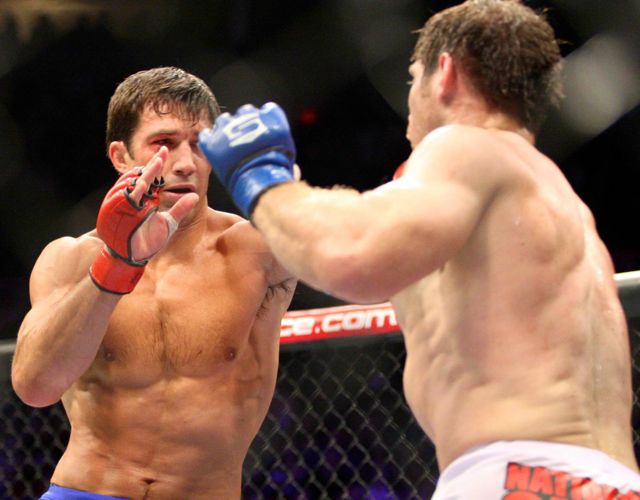

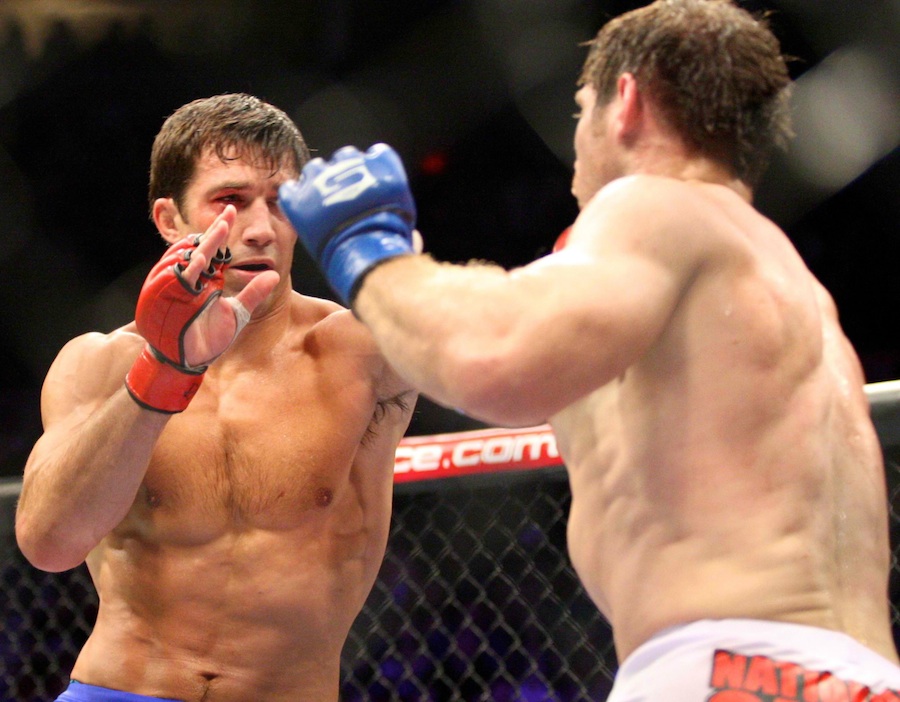

orthos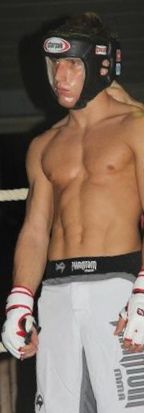
orthos
orthos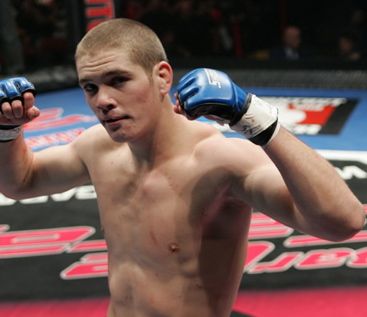
orthos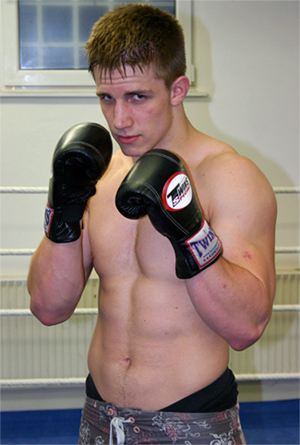
orthos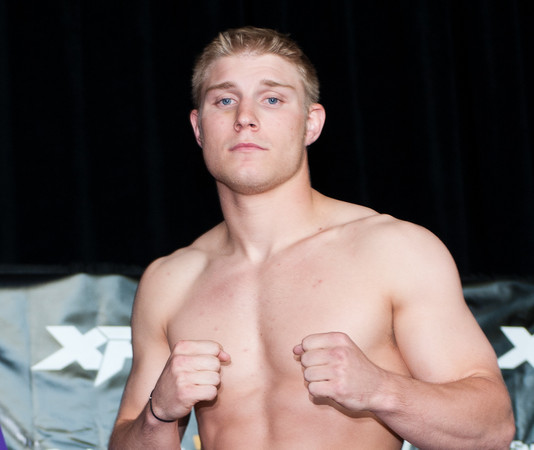
orthos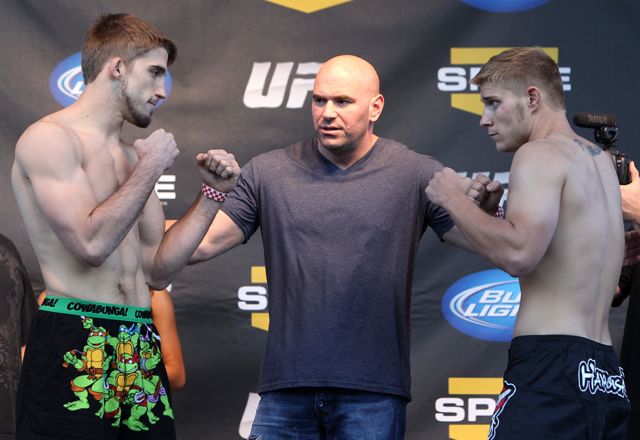
orthos
orthos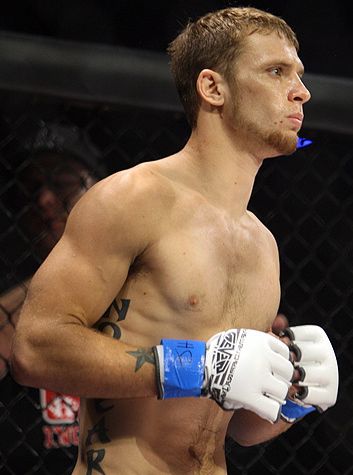
orthos
orthos
orthos
the idea of good is indeed the cause of all that is right [orthos] and
[morally] beautiful [kalos], giving rise in the visible world to
light, and the author of light and itself in the intelligible world
being the authentic source of truth and reason, and that anyone who is
to act wisely in private or public must have caught sight of this.
Manhood is indeed the cause of all that stands erect, of all that is
morally upright and righteous [orthos], and of all that is manly and
morally beautiful [kalos], giving rise in the visible world to light,
and the author of light and itself in the intelligible world being the
authentic source of truth and reason, and that anyone who is to act
wisely in private or public must have caught sight of this.
From the same root [ARES] comes areté [excellence] ... the first notion of goodness being that of manhood, bravery in war; cf. Lat. virtus.
goodness, excellence, of any kind, esp. of manly qualities, manhood, valour, prowess, Hom., Hdt. (like Lat. vir-tus, from vir).
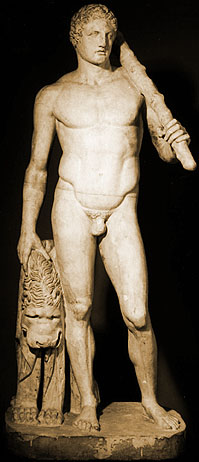
Herakles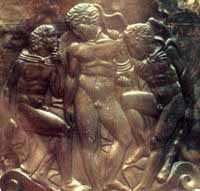
The Great God Eros
stands between and unites
Herakles and his Lover Iolaos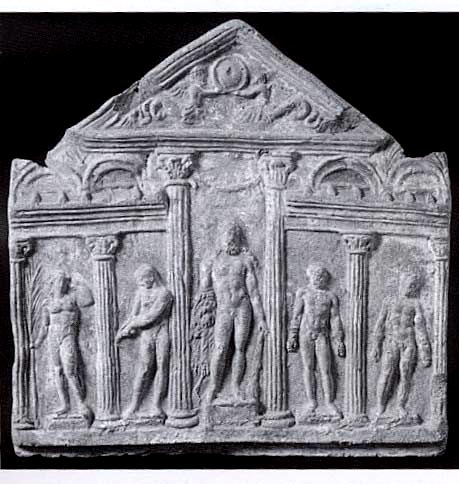
Palaistra scene with boxers; Herakles, or his statue, stands between them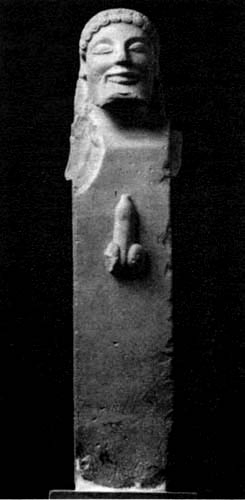
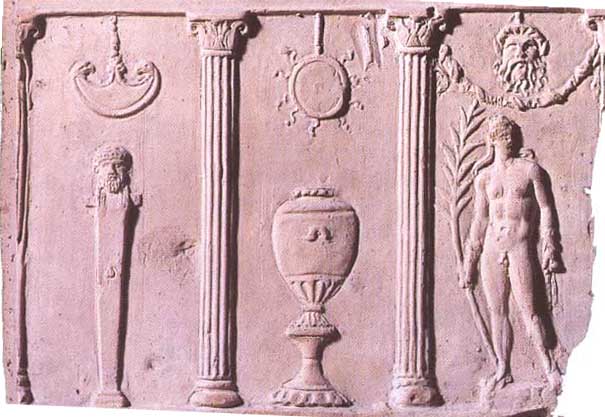
A boxer stands victorious in the palaistra.
On the left is a herm -- unfortunately, the phallus has been broken off.
The boxer holds a palm branch and a ribbon, both signifying victory,
and wears a boxing glove on his left arm.
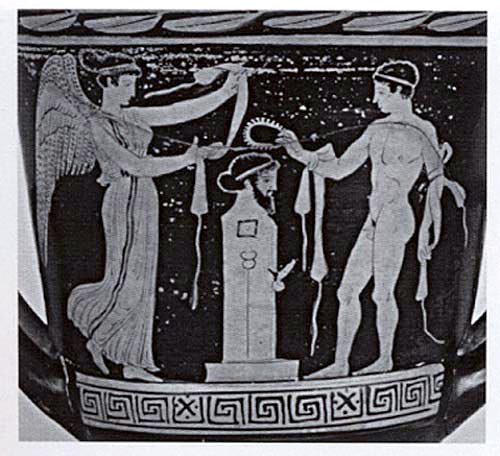
A victorious athlete, assisted by the Goddess Nike, crowns a Herm.
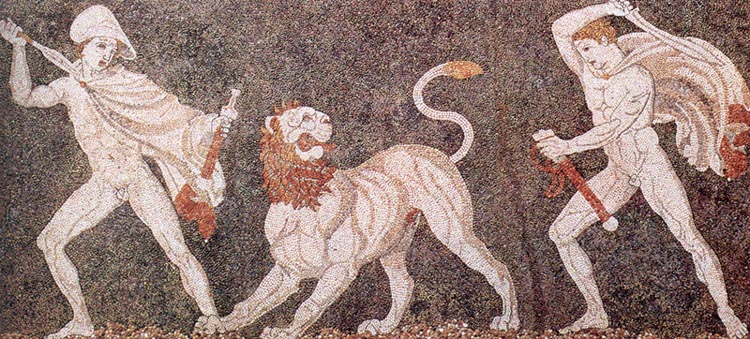



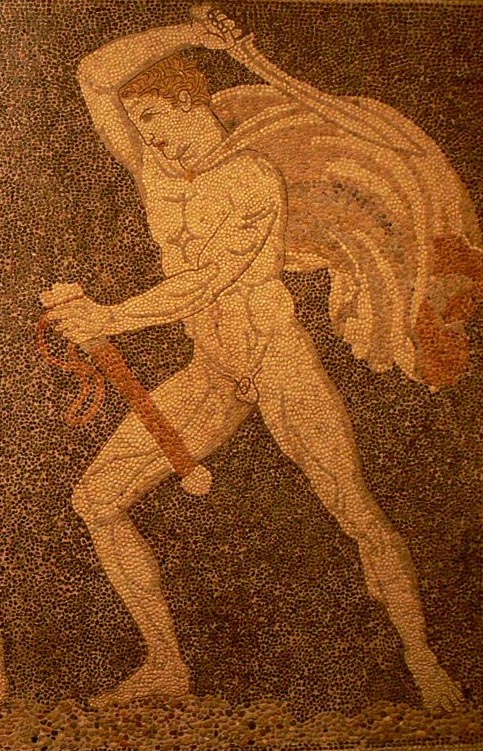

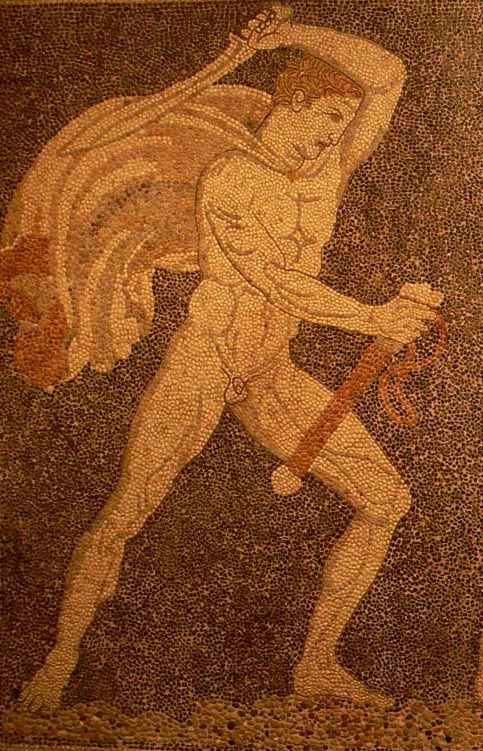

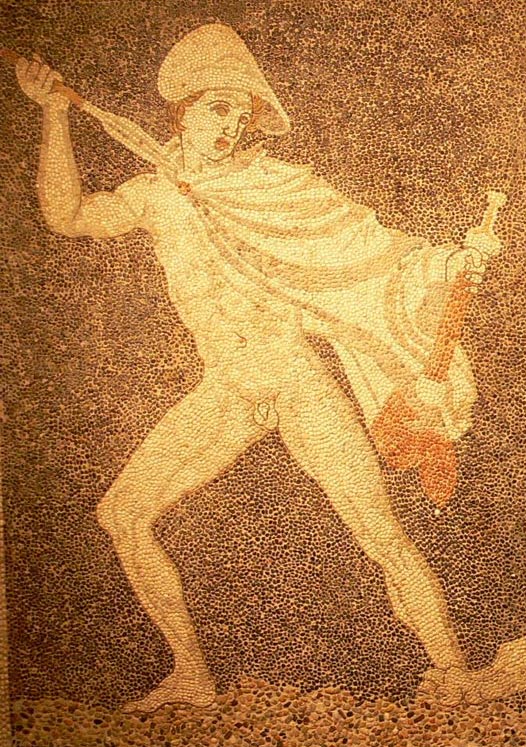
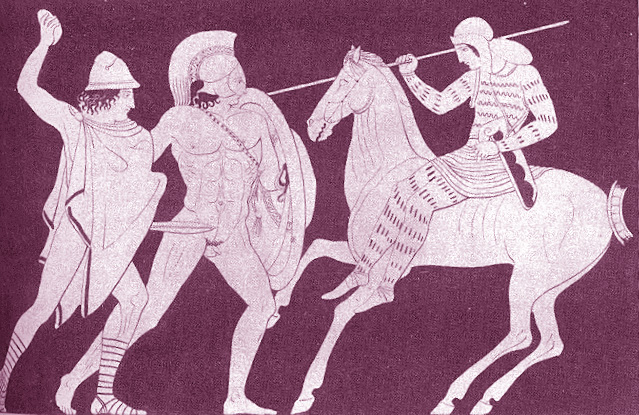

The battle for Sphacteria had not, in Spartan terms, been a "stand-up battle." It was as worthless for testing excellence as a football game would be in which one team was armed with revolvers. And if winning was not brave, then surely surrender was not cowardly -- for the whole structure of honor in warfare had been cast down.
The battle for Sphacteria had not, in Spartan terms, been a "stand-up battle."
It was as worthless for testing excellence
It was as worthless for testing excellence as a football game would be in which one team was armed with revolvers.
And if winning was not brave, then surely surrender was not cowardly -- for the whole structure of honor in warfare had been cast down.
The Athenians would not let any of the [Spartans] go, but themselves called for heralds from the mainland, and after questions had been carried backwards and forwards two or three times, the last man that passed over from the Lacedaemonians on the continent brought this message: ' The Lacedaemonians bid you to decide for yourselves so long as you do nothing dishonourable [aischros = shameful -- αισχρος] '; upon which after consulting together they surrendered themselves and their arms.
indeed people could scarcely believe that those [Spartans] who had surrendered were of the same stuff as the fallen; and an Athenian ally, who some time after insultingly asked one of the prisoners from the island if those that had fallen were men of honor [kaloi kagathoi = noble and good men], received for answer that the atraktos -- that is, the arrow -- would be worth a great deal if it could tell men of honor from the rest; in allusion to the fact that the killed were those whom the stones and the arrow happened to hit.
indeed people could scarcely believe that those [Spartans] who had surrendered were of the same stuff as the fallen; and an Athenian ally, who some time after insultingly asked one of the prisoners from the island if those that had fallen were Men of Manly Moral Beauty, Men of Manhood, received for answer that the atraktos -- that is, the arrow -- would be worth a great deal if it could tell such Noble and Good Men from the rest; in allusion to the fact that the killed were those whom the stones and the arrow happened to hit.
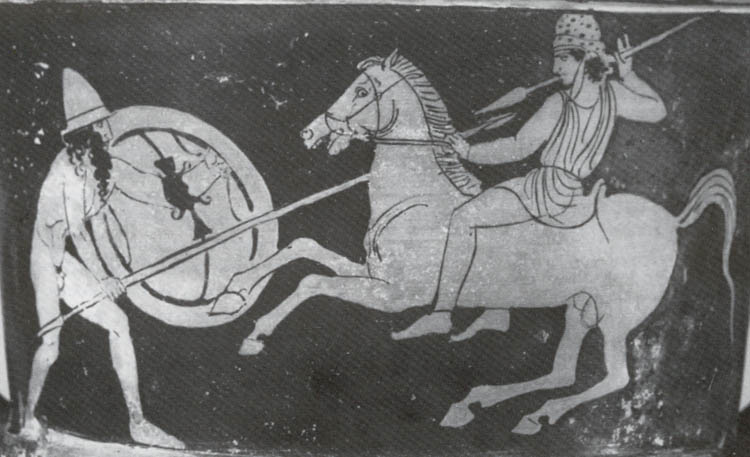
A Spartan hoplite versus an Italic calvaryman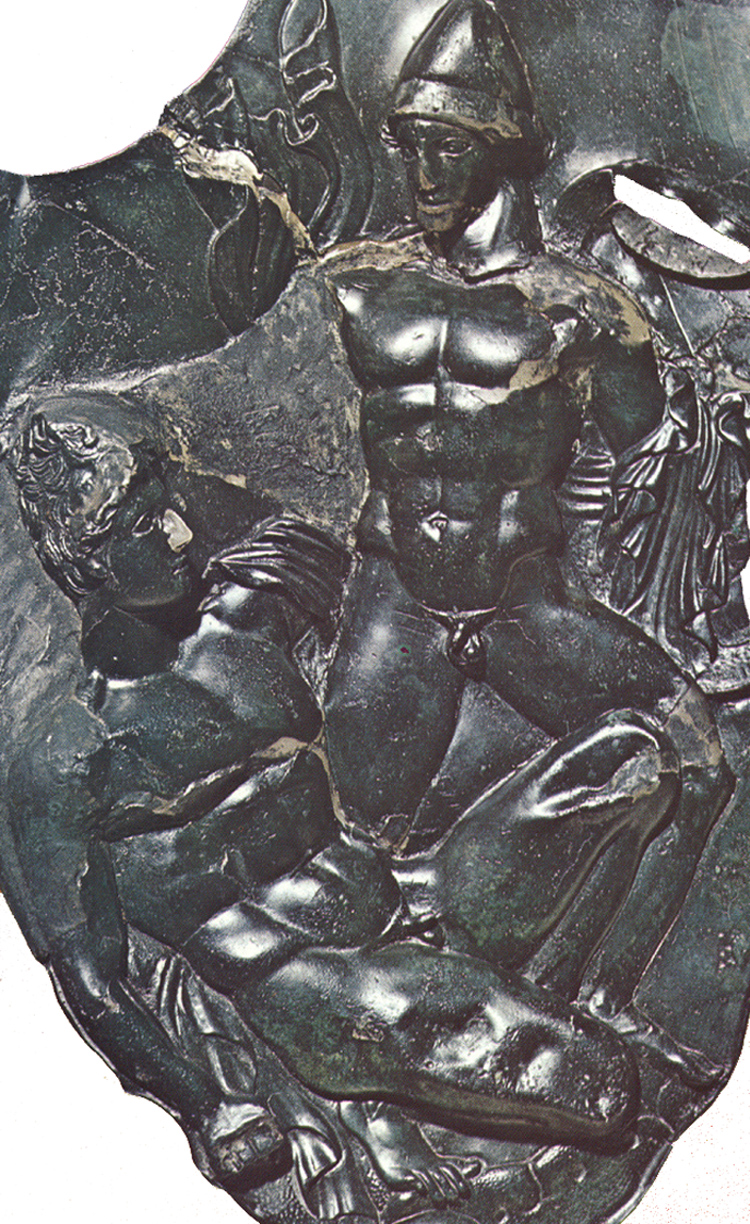
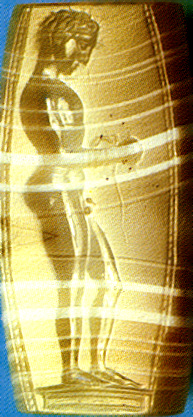
Polydeukes the Boxer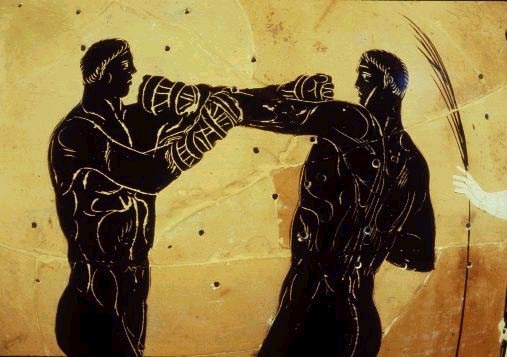
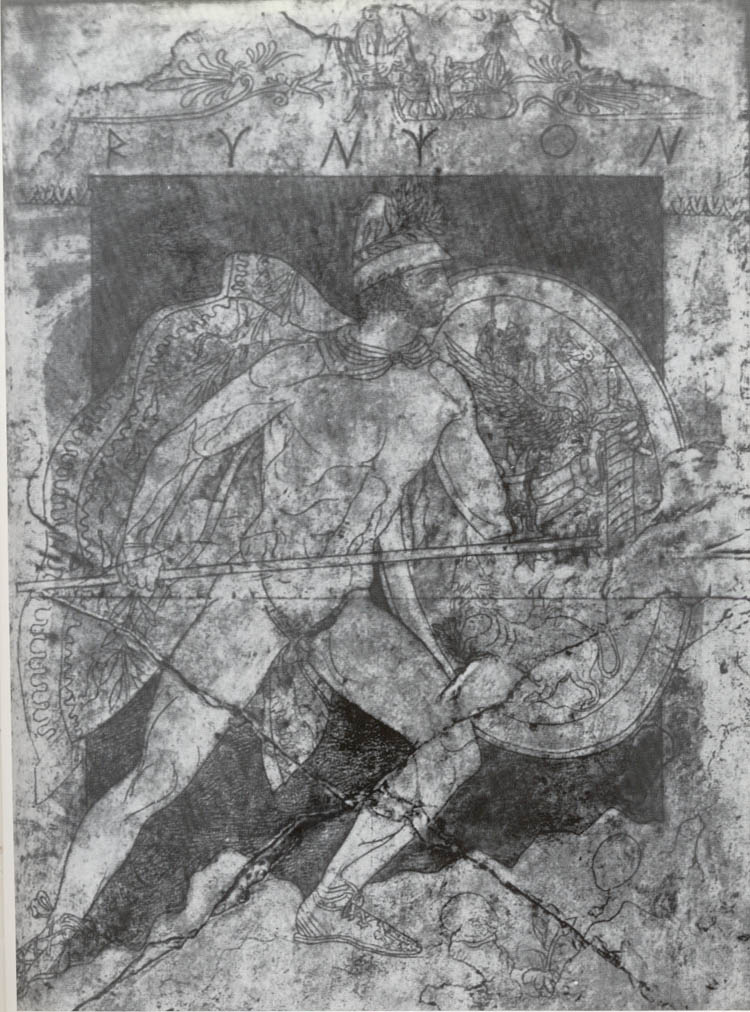
Boiotian Warrior Rhynchon
He's wearing shoes, which was most unusual --
but his genitals are displayed.
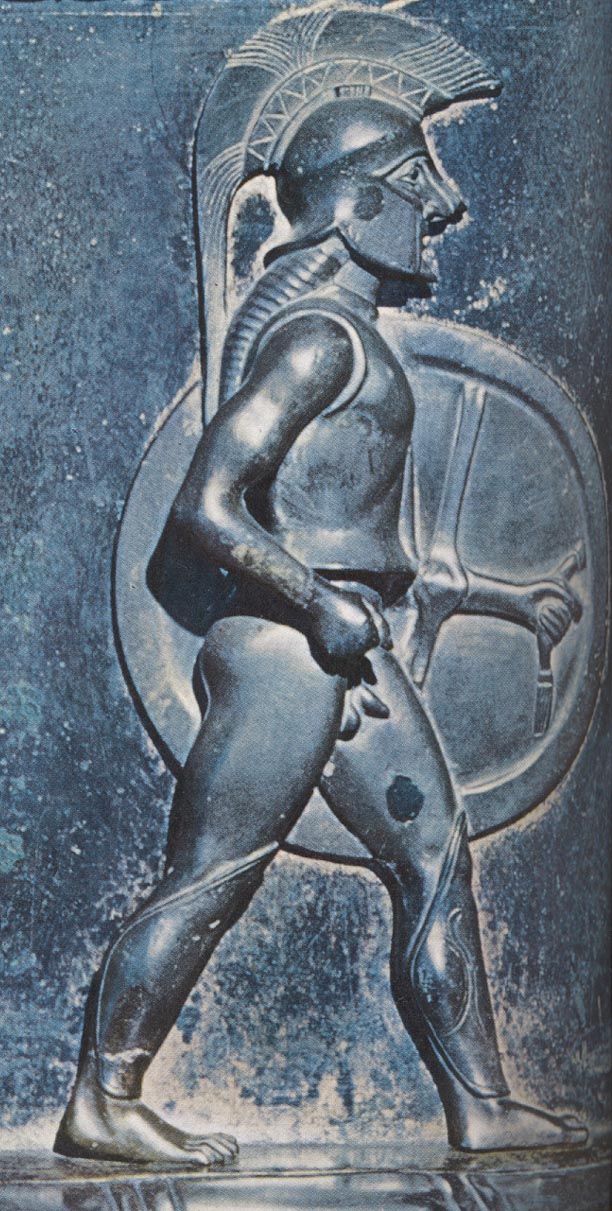
A Warrior, possibly Spartan, ca 500 BC
His upper and lower body is armored, his genitals are displayed
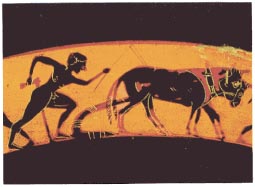
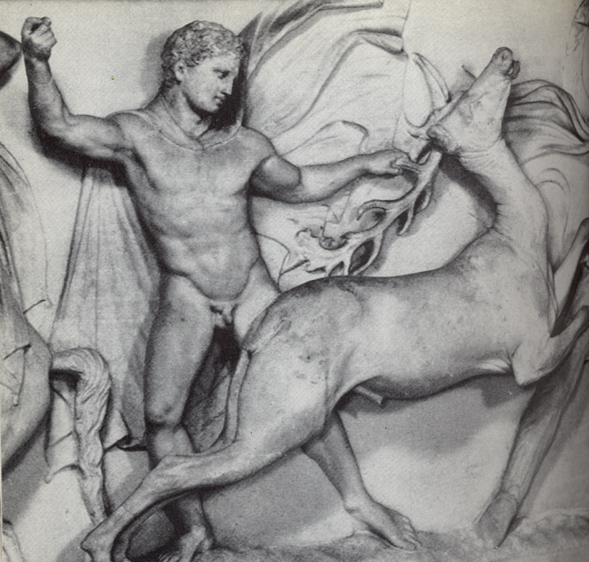
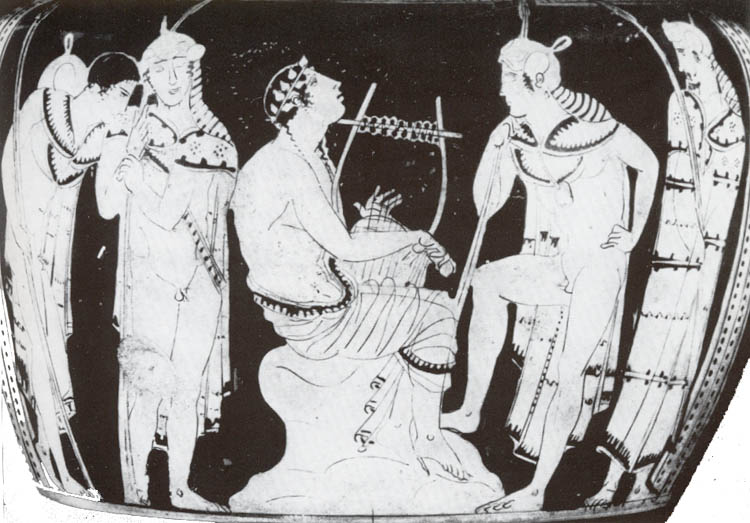
Orpheus serenades Thracian Warriors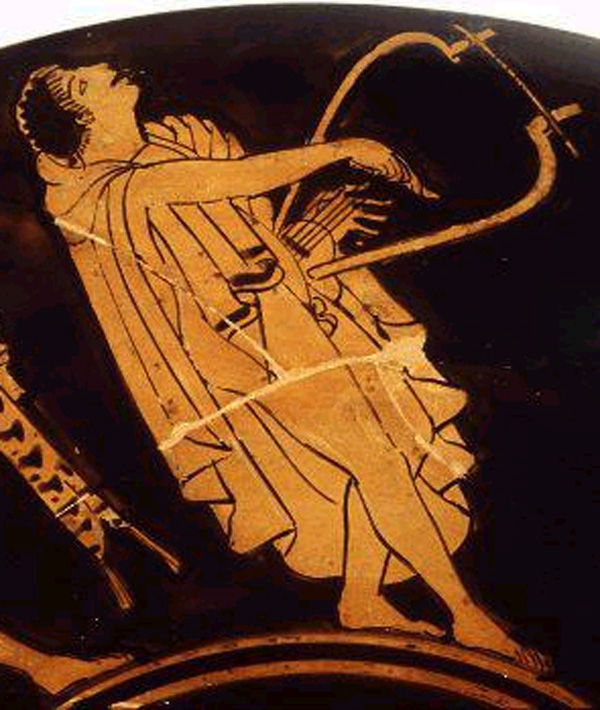
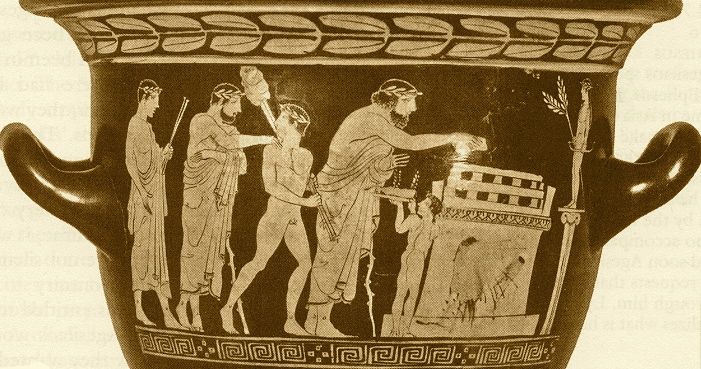
Scene of animal sacrifice
The nude youth is in a place of honor, bearing part of the sacrificial victim, which will be burned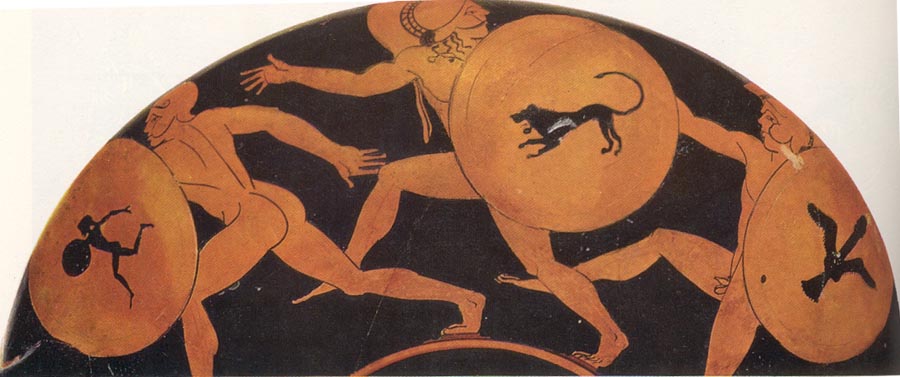


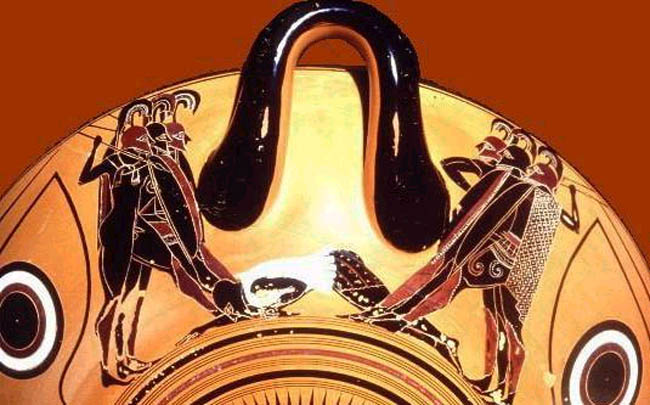
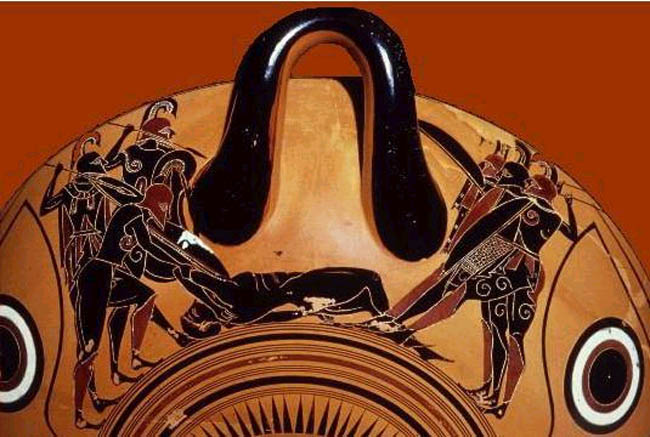
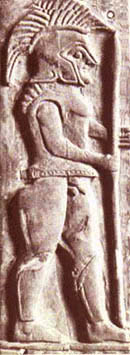 12345678910
12345678910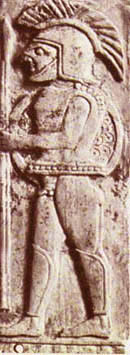
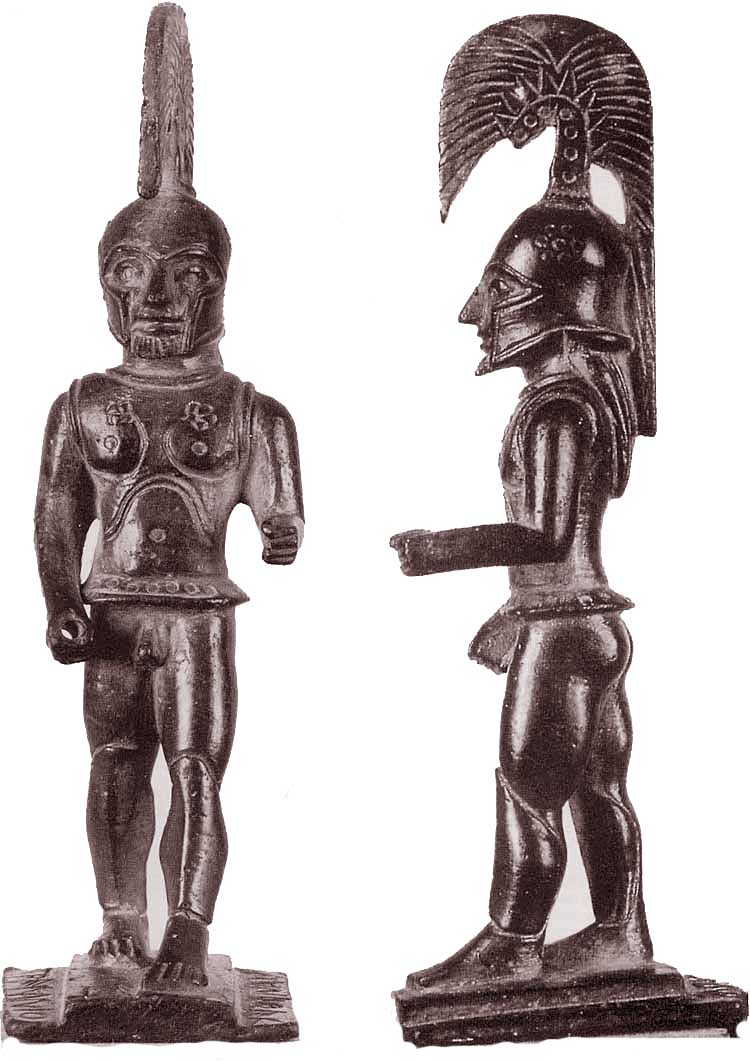
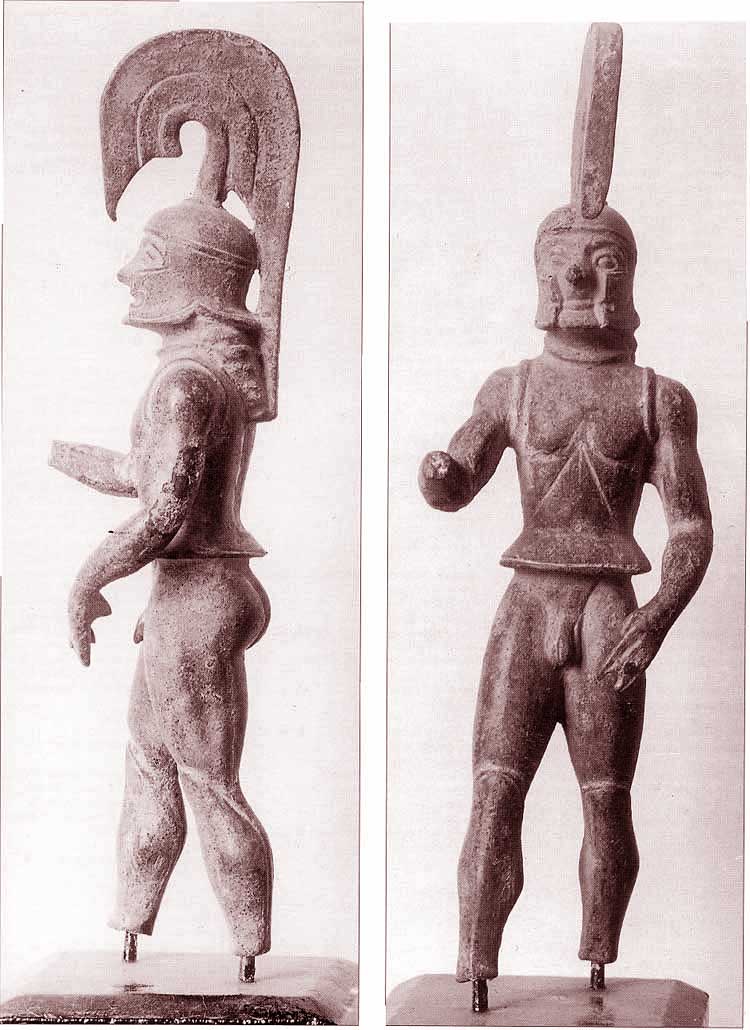
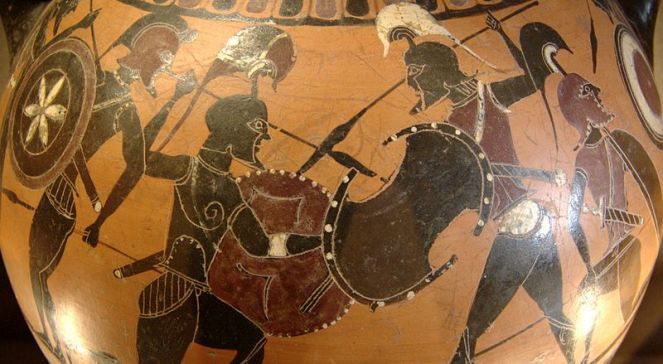


The Peloponessian War was populated by such characters as Pericles, "Very Glorious," and his ward Alcibiades, "Son of Violent Strength," whose father was Cleinias, "Famous," and whose mother was Deinomache, "Terrible in Battle."
an anticipation of the future areté of its bearer; it set, as it were, the ideal pattern for his whole life.

Areté exists in mortal man. Areté is mortal man. But
it survives the mortal and lives on in his glory, in that very ideal
of his areté which accompanied and directed him throughout his
life.
Timé was thought to have a real, almost physical
existence, in the world: it could, for example, be taken from one man
by another; it could be captured in war.
The creative energy of the Gods outlines the Truth of the Forms
through visible images.






from the very beginning, in his desire to be first, [Themistocles] boldly encountered the enmity of men who had power and were already first in the city, especially that of Aristides the son of Lysimachus, who was always his opponent. And yet it is thought that his enmity with this man had an altogether youthful beginning. They were both in love with the handsome Stesilaus, a native of Ceos, as Ariston the philosopher has recorded, and thenceforward they continued to be rivals in public life also.
When Agis the king died [in 398 BC], leaving a brother [actually a half-brother], Agesilaus, and a reputed son, Leotychides, Lysander, who had been Agesilaus' lover, persuaded him to lay claim to the kingdom, on the ground that he was a genuine descendant of Heracles. For Leotychides was accused of being a son of [the Athenian politician and general] Alcibiades, who had secret commerce with Timaea, the wife of Agis, while he was living in exile at Sparta.

Setting one's heart on such traits gives an insight into the lover's character.
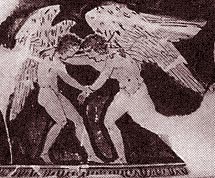
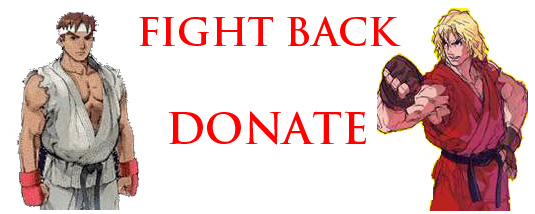
to
Contents.
to 




![]()
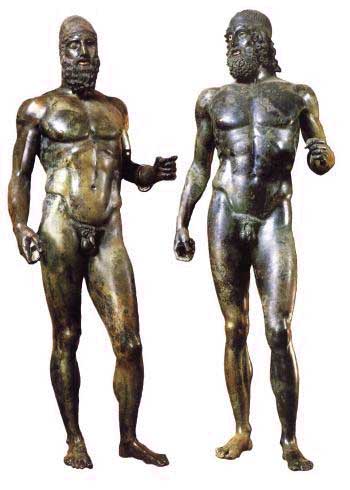
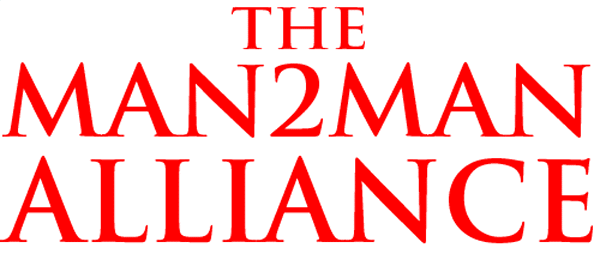






who reject anal penetration, promiscuity, and effeminacy
among men who have sex with men







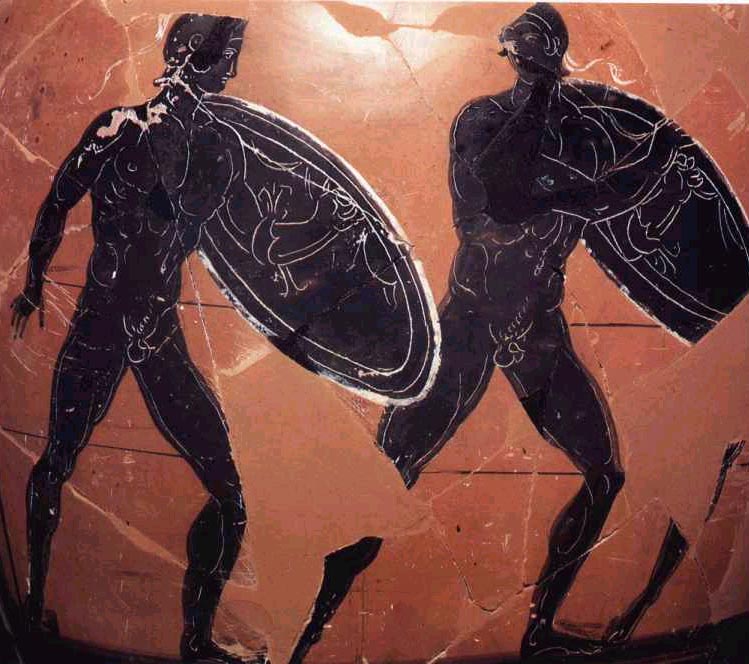
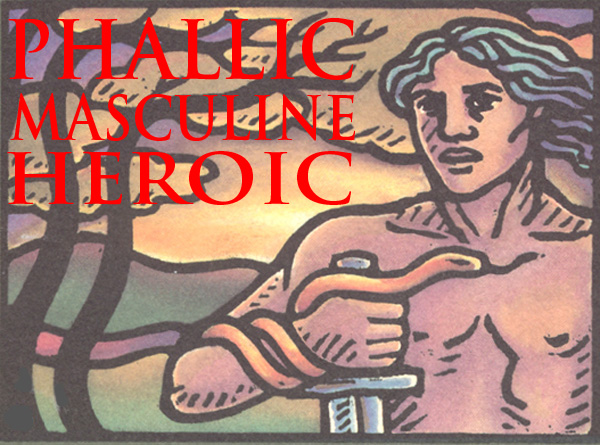


![]()

Who Celebrate, Exalt, and Worship
Fighting Manhood
In the Divine and Sacred Person of
L o r dxA r e s,
The Warrior God
God of Fight, God of Manhood, God of Fighting Manhood

| Heroes Site Guide | Toward a New Concept of M2M | What Sex Is | In Search of an Heroic Friend | Masculinity and Spirit |
| Jocks and Cocks |
Gilgamesh | The Greeks | Hoplites! | The Warrior Bond | Nude Combat | Phallic, Masculine, Heroic | Reading |
| Heroic Homosex Home | Cockrub Warriors Home | Heroes Home | Story of Bill and Brett Home | Frot Club Home |
| Definitions | FAQs | Join Us | Contact Us | Tell Your Story |

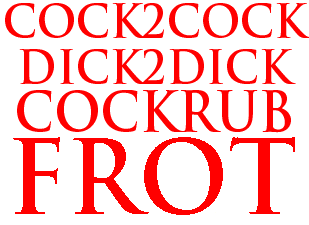

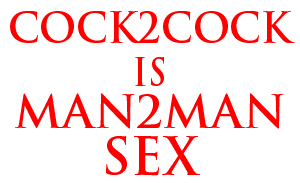
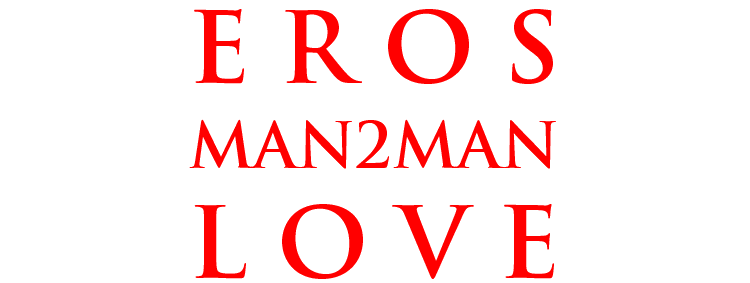
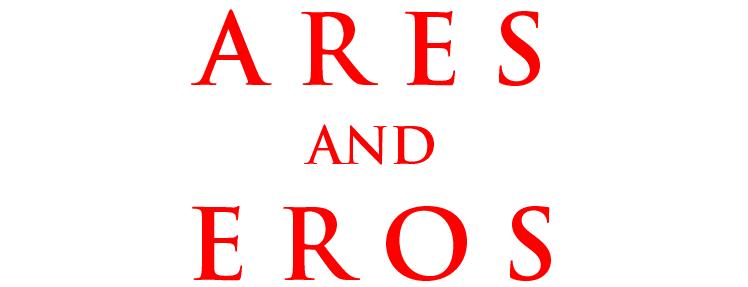
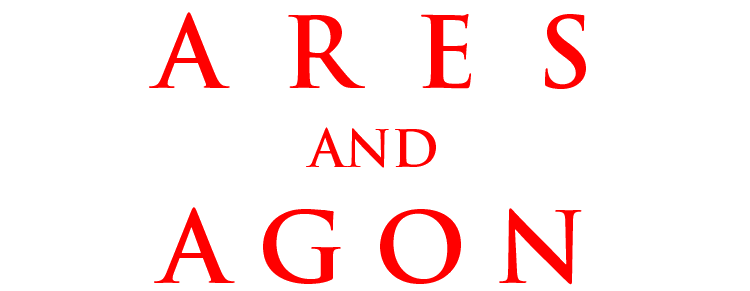
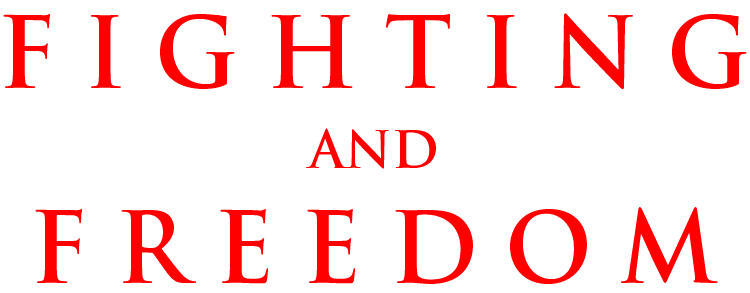
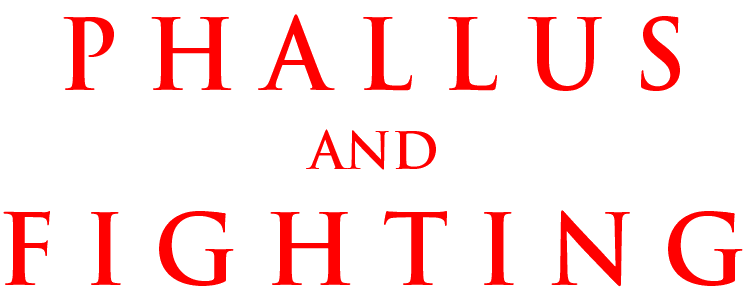
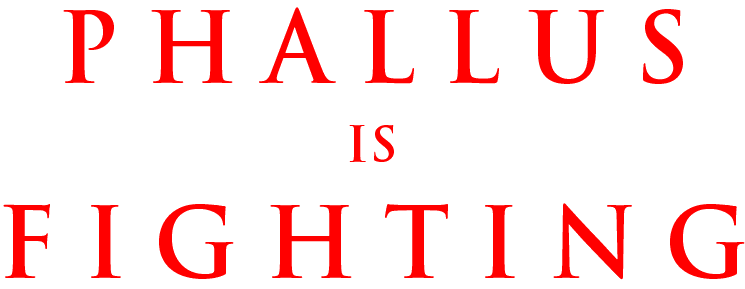
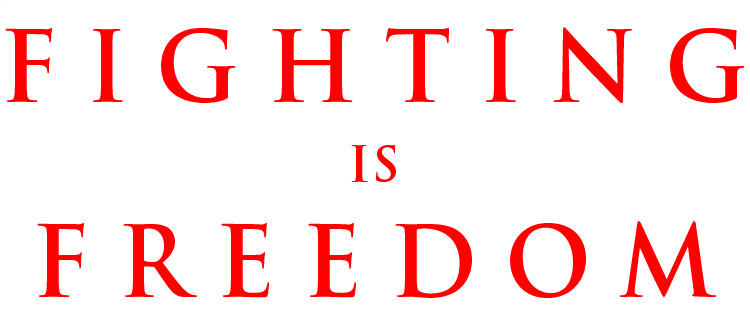
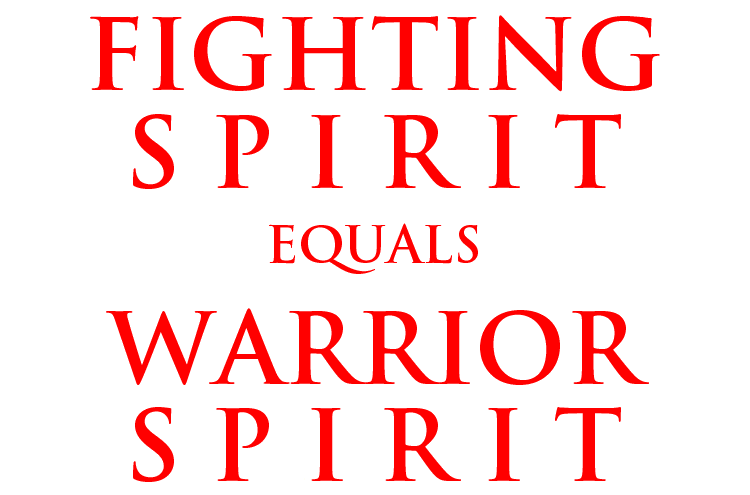





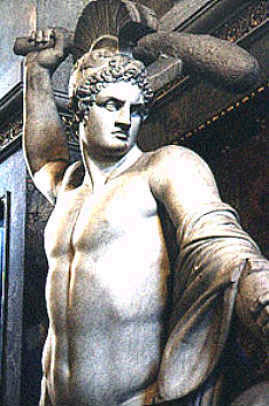
































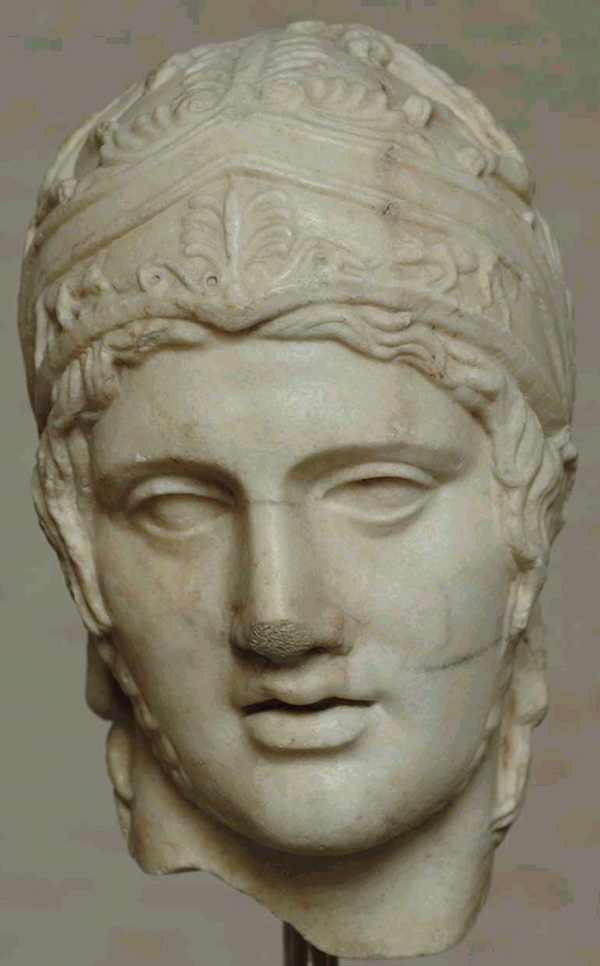
































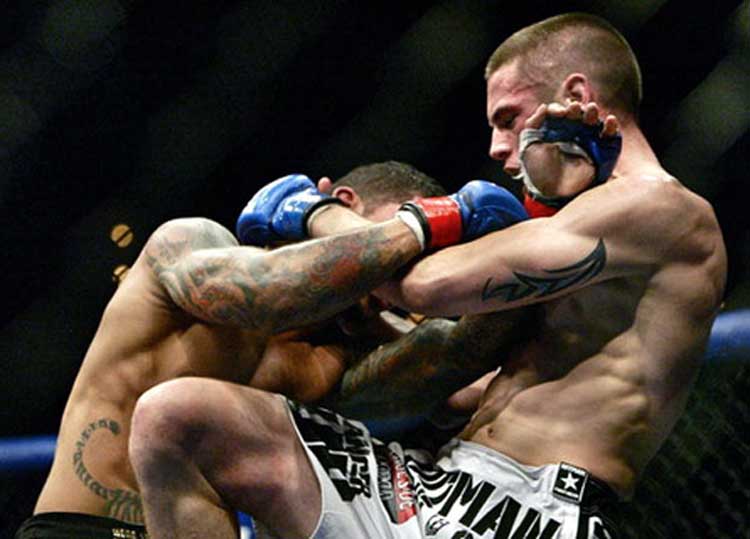














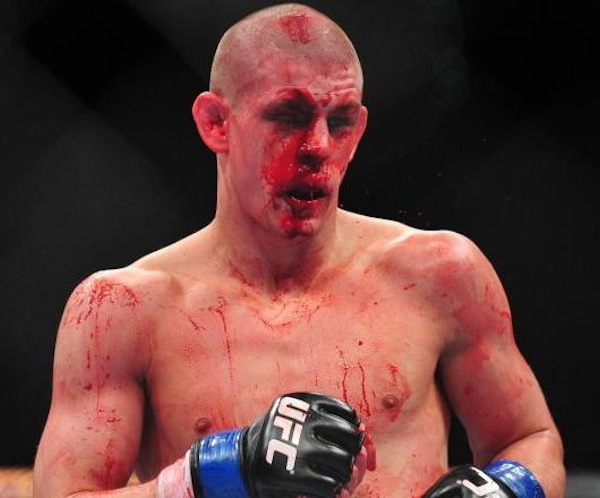

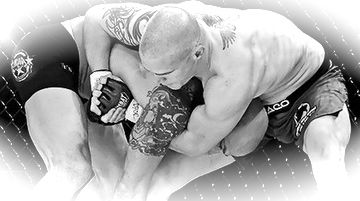
Recently I've been reading John Milton, the great English poet and defender of the Puritan and Parliamentary Revolution.
I've been reading his prose pieces -- which were written to advance that Revolutionary cause.
If you think I'm dogmatic and militant -- you should read Milton.
But his militancy helped bring about the freedoms we have today.
If an army went into battle without proper training and organisation they would lose. Historic example, in the English Civil War (1642 to 1646) the army of King Charles 1st was better organised and won most of the first battles; however Oliver Cromwell trained and organised the men fighting on Parliament's side into the New Model Army, and they won! If they had not been so organised the King would have carried on as the dictator he had been. Maybe eventually we would have got the freedoms that we enjoy now but it would have come more slowly and the monarch would have given them very grudgingly; so organisation is as you say vital to winning.









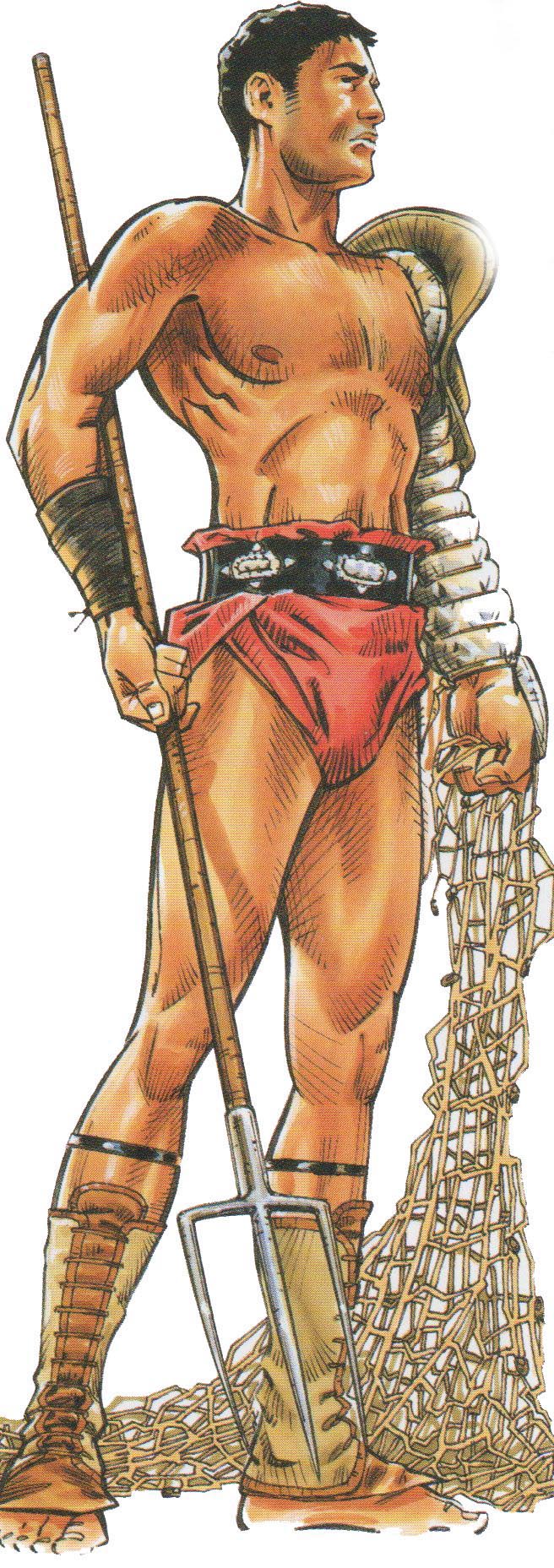


![]()


MANHOOD: A LEXICON
Word ListAncient Greek Words:
Manhood, manliness, strength, vigor, bravery, courage, excellence; Valour, gallantry, fortitude; Goodness, moral perfection, high character, virtue; Worth, merit, value.
Manhood, manliness, strength, vigor, bravery, courage, excellence; Valour, gallantry, fortitude; Goodness, moral perfection, high character, virtue; Worth, merit, value --
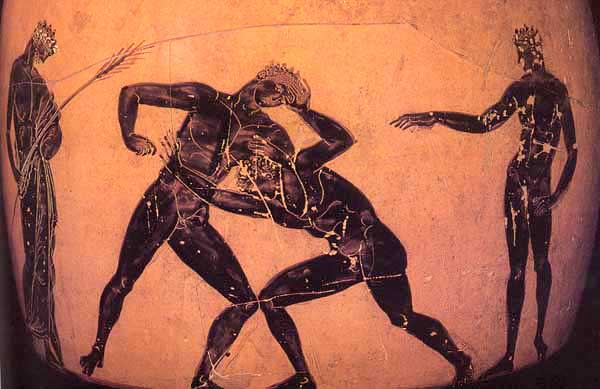
While the games were being held at Olympia, an old man was desirous of seeing them, but could find no seat. As he went to place after place, he met with insults and jeers, and nobody made room for him. But when he came opposite the Spartans, all the boys and many of the men arose and yielded their places. Whereupon the assembled multitude of Greeks expressed their approbation of the custom by applause, and commended the action beyond measure; but the old man, shaking "His head grey-haired and grey-bearded," and with tears in his eyes, said, 'Alas for the evil days ! Because all the Greeks know what is right and fair [ta kala -- The Noble Warrior Way of Manly Moral Beauty], but the Spartans alone practise it.'







Manhood, manliness, strength, vigor, bravery, courage, excellence; Valour, gallantry, fortitude; Goodness, moral perfection, high character, virtue; Worth, merit, value.

From the same root [ARES] come areté, ari-, areion [better], aristos [best], the first notion of goodness being that of manhood, bravery in war; cf. Lat. virtus.

Diomedes
the short but glorious aristeia [heroism] of the Greek spirit. The basic motive of Greek areté is contained in the words 'to take possession of the beautiful'. The courage of a Homeric nobleman is superior to a mad berserk contempt of death in this -- that he subordinates his physical self to the demands of a higher aim, the beautiful. And so the man who gives up his life to win the beautiful, will find that his natural instinct for self-assertion finds its highest expression in self-sacrifice.
Ares, then, if you like, would be named for his virility [arren] and courage [andreion = courage, Manliness], or for his hard and unbending nature, which is called arratos; so Ares would be in every way a fitting name for the God of War.









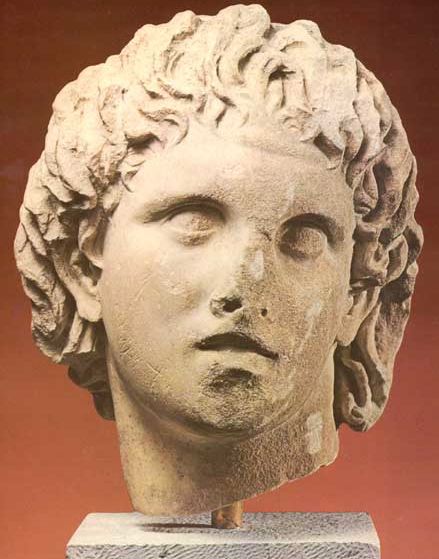
Alexander
Myth represents the active operations [daimonia] of the Gods.





The contemplation of the ειδωλον, image or symbol, leads us to the reality. The reality is always the Platonic Idea [which resides in the World of Being]. The ειδωλον, in the case of ordinary "things," is the material copy which men mistake for the reality. In the case of spiritual things and moral ideas, there is no visible image or symbol, but imperfect analogies, popular definitions, suggestive phrases . . .

Wrestling
The ephedros is on the right ;
he'll Wrestle the Victor of the bout
[V]ictory in competition for timé also carried with it a strong entitlement to the obedience and deference of others and, therefore, lay at the basis of the loyalty of man for man. For it was simply in the nature of things, Greeks thought, for lesser men to respect and obey persons of the highest timé, worth, inasmuch as they were "worthy" of such treatment. Both gods [sic] and men paid automatic, unthinking respect to timé, and men paid respect to the gods [sic] at least in part because of their supreme timé.
The troops were, indeed, suffering terribly, but their discipline was wonderful. They made no attempt to beat off the enemy who were attacking them, but simply waited for the word from their God and their general, while they were shot and struck down at their posts.
The ruin of Paganism, in the age of Theodosius, is perhaps the only example of the total extirpation of any ancient and popular superstition; and may therefore deserve to be considered as a singular event in the history of the human mind.
The order was passed along the line to prepare for action, and suddenly there came over the whole phalanx the look of some ferocious beast, as it wheels at bay, stiffens its bristles, and turns to defend itself, so that the barbarians could no longer doubt that they were faced with Men who would Fight to the Death.
Hybris was both the act of insult -- whatever the reason for it -- and the arrogant disposition that disposed a man to the insult.
[T]he Athenians would not grant the Spartans the highest meed of valor [aristeia], nor allow them to erect a general trophy [tropaion], and the cause of the Hellenes had certainly gone at once to destruction from their armed contention, had not [the Athenian general and politician] Aristides, by abundant exhortation and admonition, checked his fellow-generals, especially Leocrates and Myronides, and persuaded them to submit the case to the Hellenes for decision.
Thereupon, in the council of the Hellenes, Theogeiton the Megarian said that the meed of valor must be given to some third city, unless they desired the confusion of a civil war. At this point Cleocritus the Corinthian rose to speak. Every one thought he would demand the meed of valor for the Corinthians, since Corinth was held in greatest estimation after Sparta and Athens. But to the astonishment and delight of all, he made a proposition in behalf of the Plataeans, and counselled to take away contention by giving them the meed of valor, since at their honor neither claimant could take offence.

